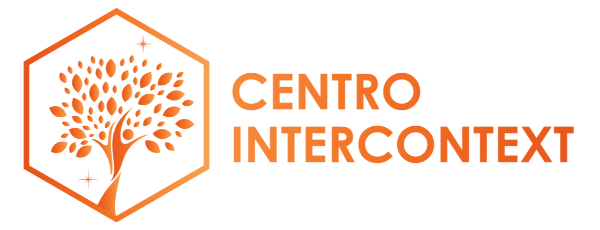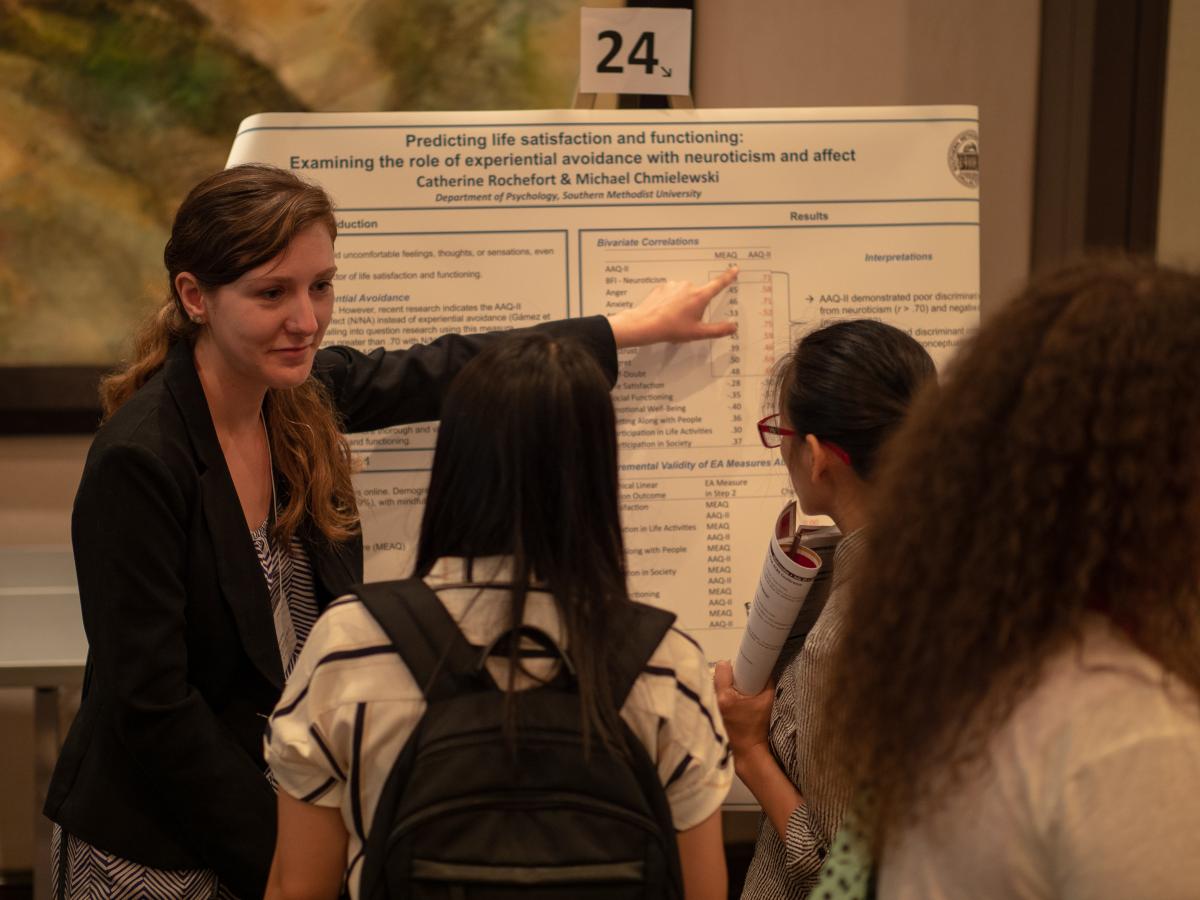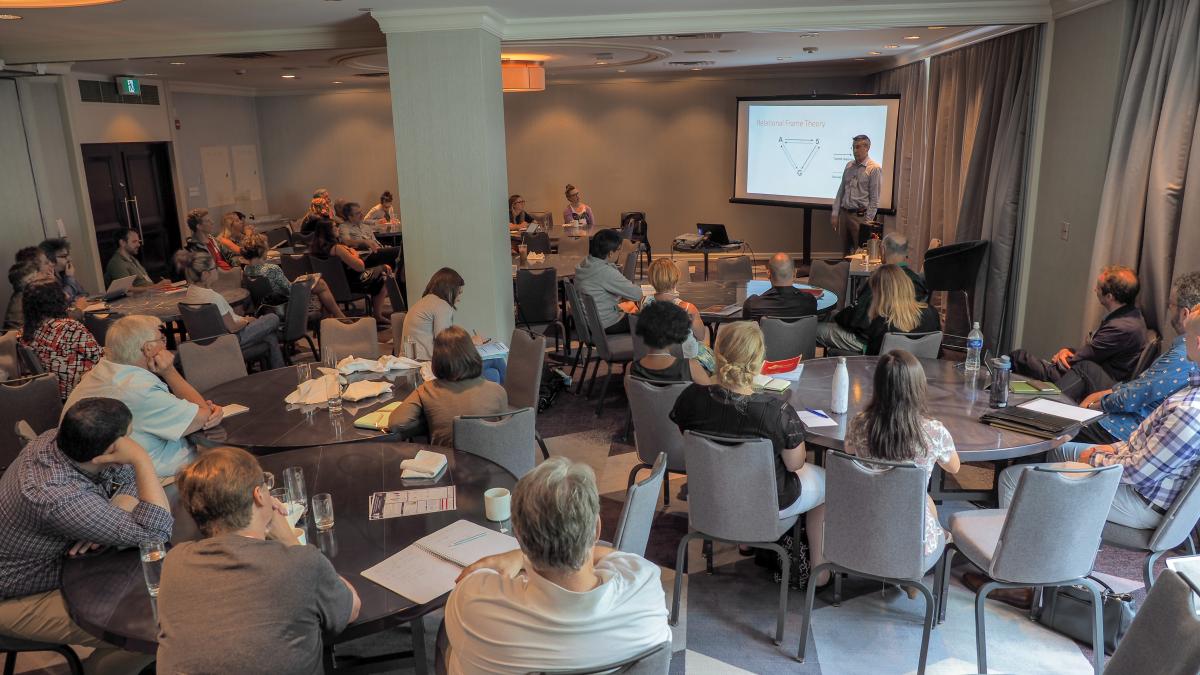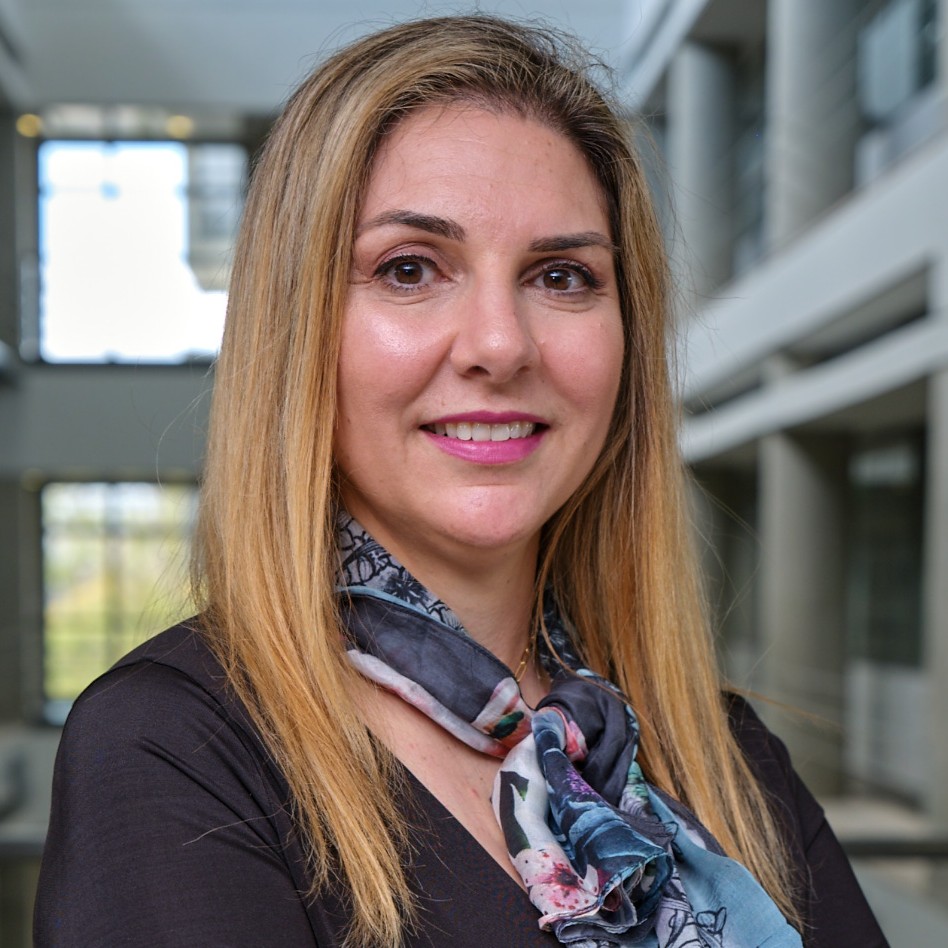ACBS World Conference 2026
ACBS World Conference 2026
Join us in Lyon, France for the 2026 ACBS World Conference—a special gathering of our global community dedicated to science, practice, and connection.
Conference Dates: 16–19 July 2026
Pre-Conference Workshops: 14–15 July 2026
Lyon Catholic University (UCLY)
Be part of this milestone event. Register your interest today and be the first to receive updates as details are announced.
Featured Speakers
We’re thrilled to welcome leading voices in mental health and contextual behavioral science, including:
- Joanna Arch, Professor Department of Psychology and Neuroscience, University of Colorado
- Peter Fonagy, Head of the Division of Psychology and Language Sciences, University College London
- Mark van Ommeren, Head of Mental Health and Substance Use Unit, World Health Organization
- Manuela O'Connell, ACBS Board President, Psychologist, Guest Lecturer
- Kelly Wilson, Professor Emeritus of Psychology at the University of Mississippi
- Kenneth Carswell, Mental Health Specialist, World Health Organization
- Déborah Ducasse, Psychiatre, Responsable du Centre de Thérapies Troubles de l'Humeur et Emotionnels/Borderline-CHU Montpellier
- Bénédicte Gendron, Professeure des Universités, Université de Montpellier
- Jess Kingston, Senior Lecturer, Royal Holloway University
- Marion Trousselard, Professeur de psychologie, Ecole des psychologues praticiens

We hope to see you there!
Thank you to our 2026 ACBS World Conference Sponsors!
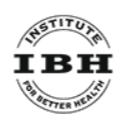 |  |
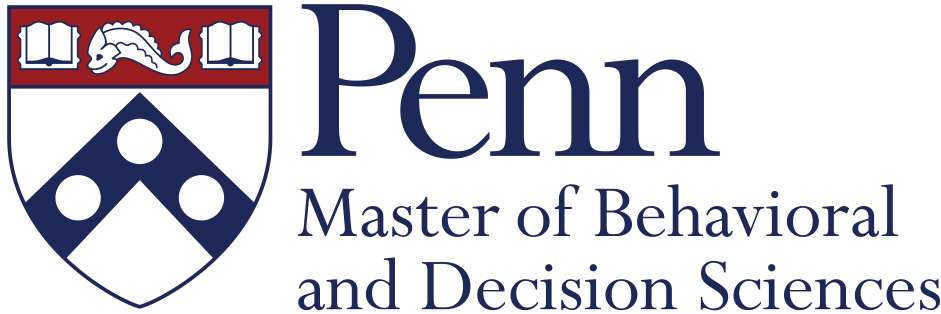 | |
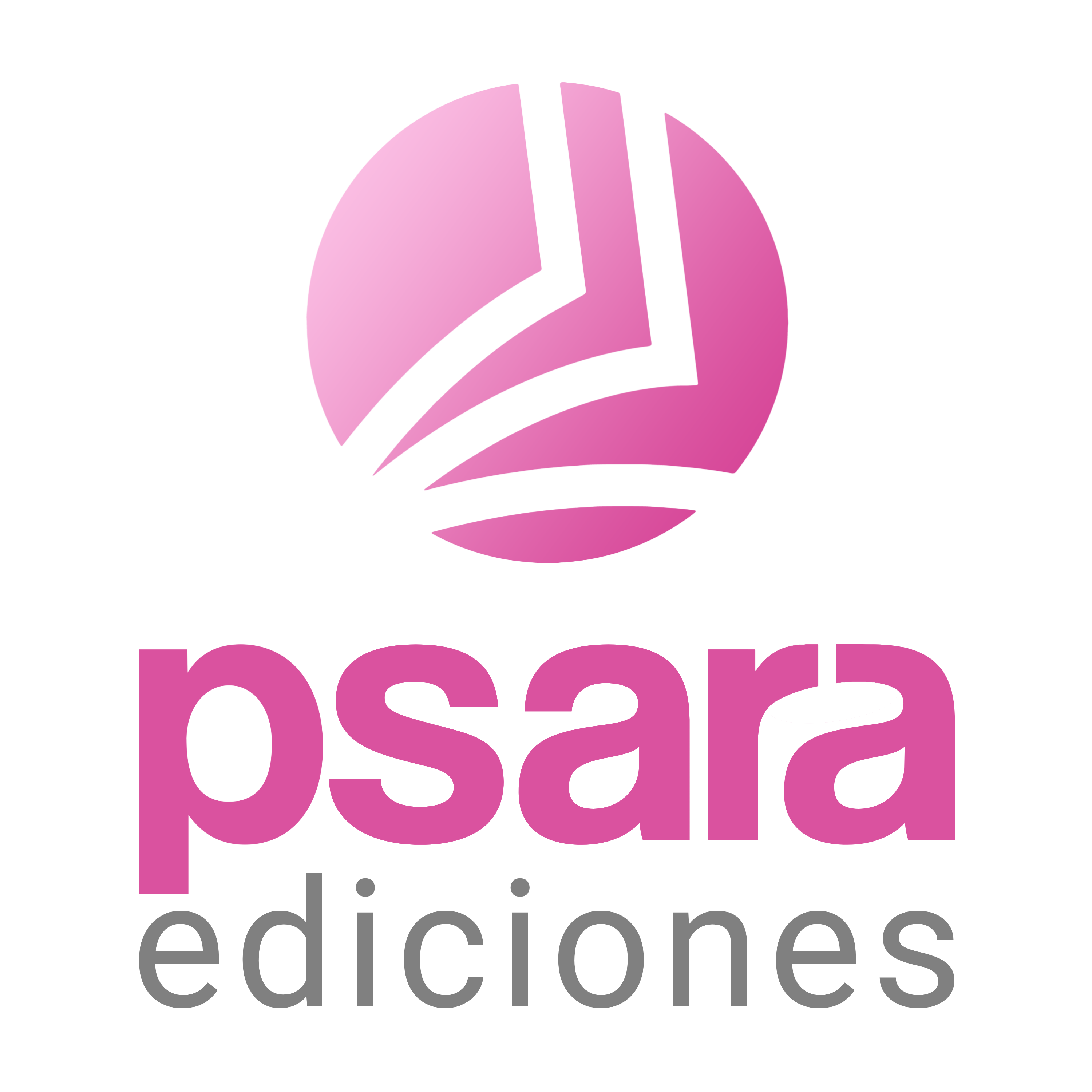 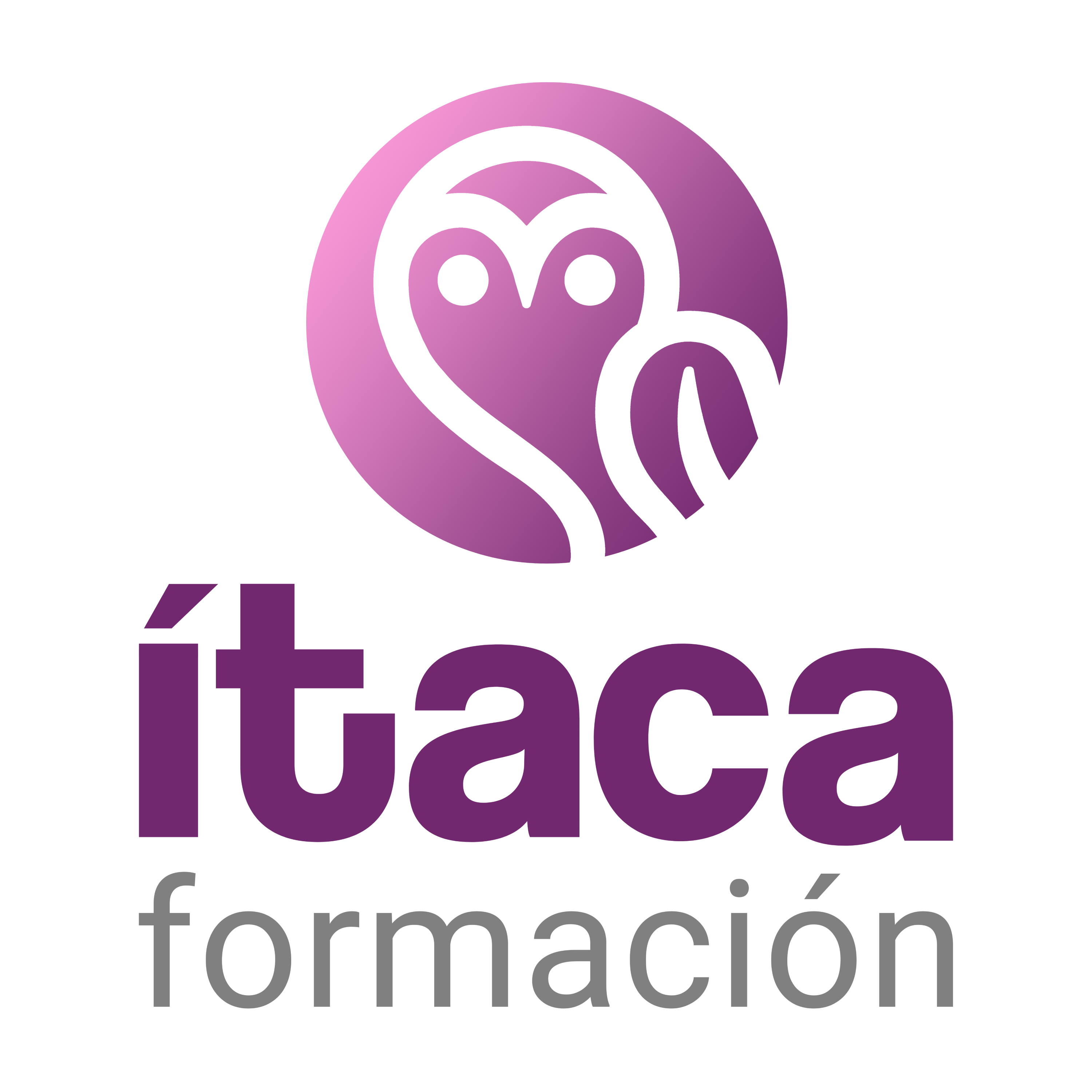 | |
Call for Submissions - Open for Posters!
Call for Submissions - Open for Posters!Poster submission deadline: 20 March 2026
Results of poster submissions will be emailed out in April.
Chapter/SIG meeting deadline: 1 May 2026
*Due to local technological capabilities, all presenters will need to be at the conference in Lyon and present in-person. No virtual presentation option will be available.
General Submission Tips and Information
Oral submission deadline: 15 February 2026
IGNITE - Panel - Symposium - Paper - Workshop - Plenary/Invited
Results of oral submissions will be emailed out in the last week of March or the first week of April 2026.
Submission types:
Poster
Posters usually report empirical research and will be organized into one or more sessions, during which attendees will be invited to review the research presented and discuss findings with poster presenters. Presenters must be at their poster during their assigned time of the poster session and may choose to provide handouts. (Poster size: no larger than 36 inches tall by 48 inches wide, or A0 size. Smaller is also permitted). Abstract word limit: 175 words maximum
Chapter/SIG/Committee Meeting
This gives Chapters/SIGs (or forming chapters and sigs) the opportunity to reserve a space and time to get together to network with others who share the same area of interest or geographic setting. This form allows SIGs and Chapters to request a time in the program for this purpose. Deadline: 1 May 2026
IGNITE
The Ignite presentation is a short, structured talk in which presenters present on ideas and issues they are most passionate about using a “deck” of 20 slides that auto-advance every 15 seconds (no exceptions). Exactly 5 minutes total. Topics may be empirical, conceptual, philosophical, historical, or methodological. Presentation should be well-practiced and high energy (perhaps even... fun!).
In addition to any topic within CBS, we are specifically soliciting research-related submissions as these are a unique opportunity for oral presentation of research. We encourage researchers to consider this format for pilot data; what you would do differently if you could re-run your study; theoretical innovations (ideas that have not been yet tested but are either up and coming or something they want feedback on); program evaluations/ reflections on running CBS interventions with specific populations; conceptual innovations/ new models; "what if" presentations (what if research was conducted this way); methodology presentations on something very concrete (like sampling in CBS or recruitment best practices); qualitative research (focus groups, needs assessments) done with stakeholders receiving CBS services; and more!
Abstract word limit: 175 words maximum
For more on Ignite presentations, see:
http://www.speakerconfessions.com/2009/06/how-to-give-a-great-ignite-talk/
Panel Discussion
Panel discussions are 75-90 minute sessions and consist of 3 to 5 speakers selected for some shared interest or expertise in an area. Panelists respond to one or more questions or issues, with time allotted for interaction among the speakers and with the audience. A panel discussion is organized by a chairperson who serves as the session’s moderator. Abstract word limit: 175 words maximum
Symposia (chair, 3 - 5 papers and a discussant)
Organized by a chairperson who moderates the 75 or 90 minute session, symposia are a series of three to four 15-20 minute presentations focused on either empirical research or conceptual, philosophical, historical, or methodological issues. A discussant highlights and integrates the contributions of various speakers in the symposium and moderates questions from the audience. Chairpersons are encouraged to use symposia as an opportunity to integrate related work by: 1) bringing speakers of different affiliations together rather than showcasing the work of a single group and 2) incorporating different kinds of talks (e.g., historical, conceptual, and research-based) on the same topic into one symposium. Papers from submissions that are not accepted may be considered for a poster session. This year, we are prioritizing submissions that are research and data driven. In service of being more data aware, we encourage you to include research citations (data citations) with your proposal. The Program Committee will not split apart symposia that are submitted together. Abstract word limit: 175 words maximum
Symposium organizers: You may send this document to the presenter of each of the papers in your symposium to collect the needed information from them. The symposium organizer will then submit all of the information for the session to ACBS via the submission link below (prior to the February 15 deadline):
Paper (not part of a pre-arranged symposium)
Paper submissions are individual, oral presentations, usually concerned with conceptual, philosophical, historical, or methodological issues. A paper submission will usually report on data. All paper presentations will be 15-20 minutes long. Accepted submissions will be organized into paper sessions of 75 or 90 minutes. Submissions not accepted will be considered for a poster session. We are prioritizing submissions that are research and data driven. In service of being more data aware, we encourage you to include research citations (data citations) with your proposal. Abstract word limit: 175 words maximum
Workshop
Workshops are training sessions of 1.25/1.5 or 2.75 hours and usually focus on a combination of experiential and/or didactic exercises. Workshop submissions are highly competitive (note: based on past events, the acceptance rate for workshops is approximately 60-70%, and of workshops submitted only 20%-35% receive 2.75 hour slots). Please put your best workshop/abstract forward keeping this in mind when determining your desired length. Keep in mind as well that most workshops selected are for the 1.25/1.5 hour slots. Be sure to clearly state your goals and objectives for participant education in your submissions. Workshops should be regarded as opportunities to directly train specific skills rather than to present research findings, discuss conceptual, philosophical, or methodological issues, or share opinions. However, in service of being more data aware, we encourage you to include research and data citations supporting your topic with your proposal, and to briefly present these (1-2 slides) during your workshop. Submissions that are not clearly focused on training should be submitted for other formats. Abstract word limit: 175 words maximum
Plenary/ Invited Address (use only if instructed)
Tips for Submissions
- Questions about the submission website? Check out some FAQs here.
- Are you wondering how to increase the chance of acceptance for your submission? Click here for tips.
- Unsure about writing Educational Objectives? Click here to learn more about them.
- Are you submitting a poster? Check out the poster guidelines here.
2026 Presenter Information
2026 Presenter InformationPowerPoints & Handouts
We encourage you to use the 2026 WC PowerPoint template.
Please title your files using the following examples (session number, first presenter, title or truncated title, type):
- 23 - García- ACT for Pain - PPT
- 23 - García - ACT for Pain - Handout 1 and 2
- 23 - García - ACT for Pain - Handout 2
- 59 - Valenzuela - Derived Relational... - PPT
https://www.dropbox.com/request/R1LQIWanmLtj8JkEjQxd
Please add your POWERPOINT files above prior to June 30. ACBS will attempt to make as many English/French PPT translations as possible to make them available to attendees via the conference app. This is ONLY POSSIBLE with PPT files, not PDFs. (PPT files are happily accepted after June 30, but after that we can not guarantee that they will be available to attendees prior to your session.)
Printing Handouts
In an effort to reduce paper consumption at the conference, we will only be printing handouts that are worksheets to be completed during sessions. (PPT slides with space for notes are not considered worksheets.) If you have a worksheet that you would like to make available to your attendees, add it to the Dropbox folder (links above) by June 30 so that it can be printed. Make sure to indicate in the file name what needs to be printed (for example, “23 - García - ACT for Pain - Handout 1 - PRINT”). Copies will be delivered to your room just prior to your session during the conference.
Posters
Find detailed poster guidelines here.
Poster size: no larger than 36 inches by 48 inches, or A0 size. A smaller size is also permitted. VERTICAL orientation required.
Please consider using an engaging poster format such as the one described here. This should aid you in reaching your audience and getting the conversation started about your work.
**Please note, we are unable to print posters for presenters (or pay for poster printing), so please come to the conference prepared with your printed poster.
We are planning to post poster titles/authors/abstracts on our website prior to the conference, so that attendees can read about the posters before attending the event. We would also love to collect PDFs of the posters, so that we can show your work to our members, even those not attending the conference. This is not required, but highly encouraged. If you're willing and able, submit a PDF of your poster here by June 30: https://www.dropbox.com/request/FnldKteXRwb0PBlDzvUu
*Make sure the poster title is in the file name
We welcome poster PDFs after June 30, but they may not be added to our website until August.
Presenter Invitation Template
If you require a visa invitation letter for your role as a presenter or for travel to the USA, please use the attached template to personalize it with your name. Please login to your ACBS member account to view the attachment.
Social Media Toolkit
Let your network know that you are presenting! Share on social media using our ready-made graphics and suggested copy. It’s a simple way to boost your visibility and build excitement for the event. Please click here to view and download images.
Conference Awards & Scholarships
Conference Awards & ScholarshipsACBS Junior Investigator Poster Award:
The purpose of this award is to recognize and help develop junior investigators conducting research in contextual behavioral science and who are presenting the results of this research at the Association's annual meeting.
ACBS Student Spotlight Program: (Accepted November 1-November 30)
The Student Spotlight Program highlights students who are doing important work in the CBS community whether for research, clinical, and/or volunteer-humanitarian efforts. It is a way to highlight their achievements, let the ACBS community know important work students are doing, and provides a platform for mentoring/collaboration/professional development/conversations around highlighted areas.
Developing Nations World Conference Scholars: (Application closes February 1)
ACBS is an international society but in many corners of the world it is difficult for professionals to attend ACBS conferences and trainings due simply to cost. The Developing Nations Fund helps disseminate CBS in the developing world and provides scholarships for attendees and presenters from developing nations to attend the world conference.
Diversity, Equity, and Inclusion World Conference Scholars: (Application closes February 1)
The Diversity, Equity, and Inclusion Committee is aiming to bring increased diversity to our annual conferences by providing funds for individuals who come from diverse backgrounds and who would not be able to attend an ACBS conference without this added financial support. Both trainees and professionals are eligible for this competitive award.
Early Career Research Paper Award: (Accepted papers will be emailed regarding eligibility)
The Award recognizes an outstanding empirical research abstract from an early career researcher, with the goal of stimulating that person’s long term participation in the ACBS conference as an outlet for presenting empirical science within the broad domain of CBS.
Michael J. Asher Student Dissertation Award: (Application closes February 1)
This award is given to students based on their doctoral dissertation proposal related to the use of Contextual Behavioral Science with children/adolescents. Michael J. Asher, Ph.D., ABPP passed away in 2016 and was a clinical psychologist at Behavior Therapy Associates, P.A. since 1988. He was passionate about his work, loved psychology, cognitive behavior therapy, and especially enjoyed learning about and practicing Acceptance and Commitment Therapy (ACT).
ACBS Foundation Student Scholarship: (Application closes February 15)
The goal of the ACBS Foundation is to support existing activities within ACBS and explore areas for future development. The ACBS Foundation Student Scholarship that will cover the full student registration fee for attending the annual ACBS World Conference.
Student World Conference Scholars: (Application closes February 15)
The mission of the ACBS Student Special Interest Group is to work to support students of contextual behavioral science by advocating for their professional and personal development and facilitating their contribution to ACBS and the larger community. One step in moving towards this mission has been to create a Student World Conference Scholarship that will help subsidize the costs of attending the annual ACBS World Conference.
Continuing Education (CE) Credits
Continuing Education (CE) CreditsType of credit available:
CE credit for psychologists
The Association for Contextual Behavioral Science is approved by the American Psychological Association to sponsor continuing education for psychologists. The Association for Contextual Behavioral Science maintains responsibility for this program and its content.
- CE credit for BCBAs is available for select events
Pre-Conference Workshops (14-15 July)
- ACTing for your Health: How to Thrive in the Context of Chronic Illness or Health Conditions, Staci Martin, Ph.D., Maria Karekla, Ph.D., Rhonda Merwin, Ph.D.
- Focused ACT: Expanding the Reach of Contextual Behavioral Science in a Troubled World, Kirk Strosahl, Ph.D., Patti Robinson, Ph.D., Thomas Gustavsson, M.Sc.
- When Hope Feels Lost: Cultivating Presence, Courage, and Connection in the Treatment of Depression with Functional Analytic Psychotherapy (FAP), Mavis Tsai, Ph.D., Sarah Sullivan-Singh, Ph.D., Barbara Kohlenberg, Ph.D., Katia Manduchi, Ph.D., Stavroula Sanida, M.Sc.
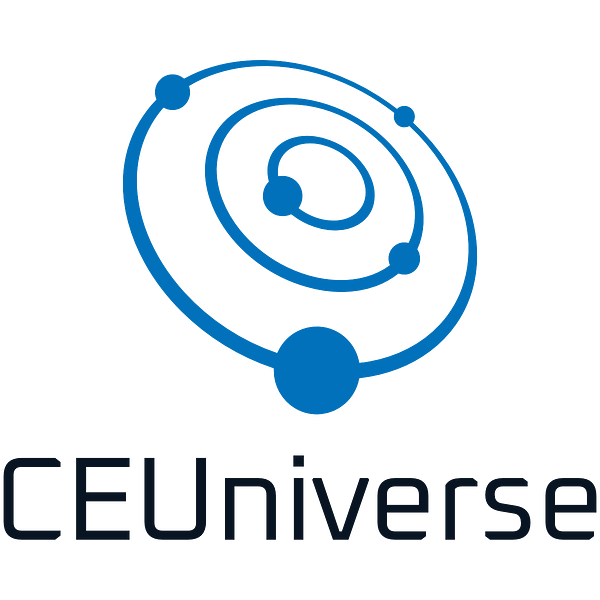 Once the program has been finalized, ACBS will be applying to offer CEs for BCBAs for the conference as well.
Once the program has been finalized, ACBS will be applying to offer CEs for BCBAs for the conference as well.
BCBA credits are sponsored by CEUniverse (#OP-10-2021). Thank you CEUniverse!
Certificate with Number of Hours Attended
As an alternative to a CE certificate, some credentialing agencies (please check with yours) may accept a certificate with the number of hours attended. This requires that an individual verifies their attendance by signing in and out of each session that they attend during the event. The cost for this type of certificate is €20.
Not sure if you need CEs?
Check with your licensing agency, and/or sign in/out on the yellow sheets provided, and you can determine your eligibility immediately after the event (still adhering to the evaluation deadlines mentioned above). If you do not scan or sign in/out, or complete necessary evaluations by the deadline, that cannot be “corrected” later.
Information about the CE Process:
CEs or certificates with the number of hours attended are available for a one-time fee for the entire event.
CE rules require that we only issue credits to those who attend the entire session. Those arriving more than 15 minutes late or leaving before the entire session is completed will not receive CE credits.
Evaluations will be available, but are not required to earn CE credits.
CEs are only available for events that qualify as workshops, symposia, invited lecture, panel discussion, or plenary sessions. Poster sessions, IGNITE sessions, sessions shorter than 1 hour, Chapter/SIG/Committee meetings, and some other specialty sessions do NOT qualify for Continuing Education credit.
Note: CE credits are only available for those registered as a professional. You may not earn CE credits with a student registration.
Fees:
A €65 fee will be required to earn CEs. If you attend either a pre-conference workshop(s), World Conference, or both, only €65 is due. If you register for multiple events separately, please only pay the fee one time. This fee is non-refundable (unless you cancel your registration in its entirety before the cancellation deadline). Attendance verification (sign in/out) and evaluations also may be required.
The cost for a certificate indicating only the number of contact hours (not a CE certificate) is €20.
Refunds & Grievance Policies:
Participants may direct any questions or complaints to ACBS Executive Director Emily Rodrigues, [email protected], or through the Contact Us link on this website.
*If you would like a different CE type in a future year from what is listed above, please contact ACBS staff via the "contact us" link on the website to provide feedback. The ACBS Conference Strategy Committee determines the final CEs offered each year based on need and relevance to the anticipated conference attendees in each location. In addition to the time and cost it takes to submit a CE application, a long lead time is sometimes needed to collect the required information. (Some reporting requirements are so unique that they must be built into the presenter submission forms in October, the year prior to the conference.)
General Schedule of Events - 5-6 June and 14-19 July 2026
General Schedule of Events - 5-6 June and 14-19 July 2026| *All times are in Lyon's local time zone (Central European Time - CET) | ||
| FRIDAY, 5 JUNE 2026 | ||
| MORNING VIRTUAL Pre-Conference Workshops | ||
| AFTERNOON VIRTUAL Pre-Conference Workshops | ||
| SATURDAY, 6 JUNE 2026 | ||
| MORNING VIRTUAL Pre-Conference Workshops | ||
| AFTERNOON VIRTUAL Pre-Conference Workshops | ||
| TUESDAY, 14 JULY 2026 | ||
| 8:00am-5:00pm | Onsite Pre-Conference Workshop Registration | |
| 9:00am-5:00pm | IN-PERSON Pre-Conference Workshops | Coffee/Tea, 10:15am-10:30am |
| Lunch, 12:15pm-1:15pm | ||
| Break, 3:00pm-3:15pm | ||
| WEDNESDAY, 15 JULY 2026 | ||
| 8:00am-4:00pm | Onsite Pre-Conference Workshop Registration (Conference attendees may begin to register after 1:30pm) | |
| 9:00am-5:00pm | IN-PERSON Pre-Conference Workshops | Coffee/Tea, 10:15am-10:30am |
| Lunch, 12:15pm-1:15pm | ||
| Break, 3:00pm-3:15pm | ||
| 5:15pm-6:00pm | Rookies Retreat: ACBS Conference Orientation (Student and First Time Attendee event) | |
| 5:15pm-6:15pm | Onsite Conference Registration | |
| 5:15pm-6:45pm | Opening Social: Chapter, SIG, & Committee Event (Foyer) (Beverages available; guests welcome with ticket purchase) | |
| THURSDAY, 16 JULY 2026 | ||
| 8:00am-5:00pm | Onsite Conference Registration | |
| 8:00am-8:50am | Chapter/SIG/Committee Meetings | |
9:00am-5:45pm | Conference Sessions | Coffee/Tea, 10:15am-10:30am |
| Lunch, 12:00pm-1:15pm | ||
| Coffee/Tea & Poster Session, 2:45pm-3:15pm | ||
| Break, 4:30pm-4:45pm | ||
| 5:45pm-7:00pm | Social (Foyer) (Beverages available; guests welcome with ticket purchase) | |
| FRIDAY, 17 JULY 2026 | ||
| 8:00am-5:00pm | Onsite Conference Registration | |
| 8:00am-8:50am | Chapter/SIG/Committee Meetings | |
9:00am-5:45pm | Conference Sessions | Coffee/Tea, 10:15am-10:30am |
| Lunch, 12:00pm-1:15pm | ||
| Coffee/Tea & Poster Session, 2:45pm-3:15pm | ||
| Break, 4:30pm-4:45pm | ||
| SATURDAY, 18 JULY 2026 | ||
| 8:00am-5:00pm | Onsite Conference Registration | |
| 8:00am-8:50am | Chapter/SIG/Committee Meetings | |
9:00am-5:45pm | Conference Sessions | Coffee/Tea, 10:15am-10:30am |
| Lunch, 12:00pm-1:15pm | ||
| Coffee/Tea & Poster Session, 2:45pm-3:15pm | ||
| Break, 4:30pm-4:45pm | ||
8:00pm-10:30pm Follies begin at 8:30pm | Follies! (Merieux Amphitheater) (Beverages will be available; guests welcome with ticket purchase) | |
| SUNDAY, 19 JULY 2026 | ||
| 8:30am-11:00am | Onsite Conference Registration | |
9:00am-12:15pm | Conference Sessions | Coffee/Tea, 10:30am-10:45am |
Hotel & Travel
Hotel & Travel
Plan Your Stay in Lyon!
Get ready to experience Lyon, France — the culinary and cultural heart of Europe!
The ACBS World Conference 2026 will be held 16–19 July at Lyon Catholic University, conveniently located in the city center and surrounded by historic charm, delicious dining, and easy transportation options.
Catholic University of Lyon
10 place des archives
69002 Lyon
France
We’ve partnered with several nearby hotels to make your stay convenient and comfortable. These properties offer special ACBS attendee rates — but rooms are limited, so we recommend booking early!
Travel Tip: Lyon is easily accessible by train, plane, and public transit, with direct connections from Paris, Geneva, and other major European cities. Find more information on navigating to the conference from Lyon's major airports and train stations here.
Plan your trip early and make the most of your time in this beautiful UNESCO World Heritage city — where every street corner offers a taste of history, culture, and incredible food.
Airport and Train Station Transfer to UCLy
Airport and Train Station Transfer to UCLyHow to get to Catholic University of Lyon (10 place des archives, 69002, Lyon, France)
From Lyon-Saint Exupéry Airport (LYS)
- Option 1 - Tram + Bus (45-60 minutes, €17–19 total)
- At Lyon-Saint-Exupéry Airport (LYS) Follow signs for the Rhônexpress shuttle tram Buy your ticket on-site or online (€16–€17 one-way)
- Take the Rhônexpress Ride to Lyon Part-Dieu (timetable here)
- At Lyon city centre From Part-Dieu, walk to the tram/light rail platform and take Tram T1 toward Debourg. Purchase a ticket via the ticket machine, or via the TCL app available on Android and iOS (€2.50 for one way ticket). Get off at Place des Archives station. It's a short walk (2-3 min) to UCLy.
- Option 2 - Ride-Share (Uber or Bolt)(30-40 minutes, €35 – €60+)
- Option 3 - Taxi (30-40 minutes, ~€55 – €90+)
- There are designated taxi ranks right outside the arrivals terminals (exits outside of Terminal 1 or Terminal 2) where licensed taxis operate 24/7. No app needed, just queue in line for the next available taxi.
From Lyon Part-Dieu Station
- Option 1 - Uber or Bolt (10-15 minutes, ~€10–€20+)
- Use app to put destination as “10 Place des Archives, 69002 Lyon, France"
- Option 2 - Tram (15-18 minutes, one-way ticket ~€2.20)
- Automatic ticket machines are available right at the tram and metro stops near the station entrances. You can pay with credit/debit card or coins (note: does not always accept cash). You can also download the TCL app and purchase/validate tickets directly on your smartphone (Android and iOS versions available)
- Exit the station toward the tram (follow signs)
- Walk to Tram T1 stop “Part-Dieu” (outside the station area). Take Tram T1 toward Debourg.
- Get off at Place des Archives (about 8-10 minutes ride)
- Walk ~3 minutes to UCLy
From Lyon Perrache Station
- You’re already close! From Gare de Lyon Perrache, it’s a short walk of about 5–7 minutes to UCLy.
- At station, follow signs for “Centre-Ville / Presqu’île”
- Exit on the north side of the station (toward the city center, not the motorway side)
- Walk onto Cours de Verdun-Rambaud (the large street directly in front of the station)
- Walk north-east (away from the station)
- Turn left onto Rue Casimir Périer (this is a smaller street heading into the neighborhood)
- Continue straight. 10 Place des Archives is right on the square. You’ll see UCLy buildings around the plaza.
Additional Taxi Services
Licensed taxis in Lyon operate with regulated fare rules, so difference in pricing between companies is usually small.
- Base pickup fare: €3.00
- Minimum fare: €8.00
- Distance rates: About ~€0.98/km (day) or ~€1.47/km (nights, Sundays & holidays)
- Waiting time: ~€39.47 per hour (meter counts waiting time in traffic)
- Taxi Radio de Lyon
- Phone Number: +33 4 72 10 86 86
- Open daily, 24/24
- Languages available in: Italian, German, English, Spanish, French
- Booking available by phone, app, online, at a station, or hailing on the street (without pre-booking)
- Taxi Lyon, TL
- Phone Number: +33 4 78 26 81 81
- Open daily, 24/24
- Fixed rates (know amount due in advance vs an odometer)
- Pre-booking available by phone or online.
- Taxi Lyon Aéroport / Vans & Berlines
- Phone Number: +33 6 58 76 78 64
- Open daily, 24/24
- Specialized for all trips to and from the Lyon Saint-Exupéry Airport
- Can be booked by phone or online.
Childcare Options for Lyon
Childcare Options for LyonA list of potential providers and additional information about child care is included below. Note that this is a referral list and in no way suggests an affiliation, recommendation, or endorsement. ACBS does not officially recommend or endorse any particular child care facility or provider, nor can we assure you of the quality of care.
Babysitting Options
Babysits

- Online directory of babysitters available in Lyon, France. Can filter by experience, hourly rate, language, available times, and more
- Website: https://en.babysits.fr/babysitter/lyon/?query=Lyon,%20France&lat=45.75781379905973&lng=4.83201127499342
Momji
- Offers French and English services. Please contact ahead of time for a quote
- Website: https://www.momji.com/en/our-agencies/childcare-lyon
Les Enfants d'Abord
- Babysitting service specifically for families visiting France
- €11 per hour (minimum 2 hours) and €25 agency fee per day
- Website: https://www.lesenfantsdabord.fr/baby-sitting-in-france/
CHILDCARE CENTERS
Les Petits Plus
- Offers a bilingual (French and English) holiday club during summer holiday (6 July-24 July) for children 3-8
- €225 per week (Monday-Friday) or €50 per day, from 8:30-16:30
- Website: https://lespetitsplus.org/en/registration-for-summer-holiday-club-club-vacances-ete/#inscriptions
Babilou Nursery
- Nursery for children ages 10 weeks to 4 years
- Open Monday to Friday: 7:30-18:30
- Please contact nursery ahead of time to make arrangements and obtain quote.
- Website: https://www.babilou.fr/creches/babilou-lyon-vallee?campaign_id=CM200013&utm_medium=dir&utm_campaign=LYON
Flight discounts to Lyon
Flight discounts to Lyon
| 10% discount on the fare component on a wide range of public airfares on Air France, KLM and code-shared flights. |
| Registered event: ACBS World Conference 2026 Unique event ID Code: GME60294AF Authorized Travel Period: July 7, 2026 to July 26, 2026 Event Location: Lyon The tickets can be booked via: the dedicated Air France or KLM websites and by applying the unique event ID code during the check-out process, as specified in the event related PDF. |
Hotel Information and Reservations - Lyon
Hotel Information and Reservations - LyonThe ACBS World Conference 2026 will be held at:
Catholic University of Lyon
10 place des archives
69002 Lyon
France
This year we have a variety of options to share with you across multiple smaller hotels. Walking times listed are to the university venue.
Suggested hotels are:
Hotel Charlemagne (5 minutes walk) (attached booking form)
Hotel Chromatics (3 minutes walk) (attached booking form)
Greet Hotel Lyon Confluence (4 minutes walk) (link)
Ibis Lyon Centre Perrache (4 minutes walk) (link)
Novotel Lyon Centre Confluence Bord de Saone (21 minutes walk) (link)
Mercure Lyon Centre Château Perrache hotel (8 minutes walk) (link)
Pre-Conference Intensive Workshops 2026
Pre-Conference Intensive Workshops 2026
and many more....
What to Expect
The 2026 Pre-Conference Workshops offer exciting VIRTUAL and IN-PERSON opportunities that will engage therapists and researchers of any skill level. Combining therapy role-plays, experiential exercises, case presentations, data graphics, focused lectures, and small group discussions, you can expect high-quality training from ACBS Pre-Conference Workshops. Continuing Education credits are available.
Virtual Workshops
Friday, 5 June and Saturday, 6 June
Format: LIVE online via Zoom.
Recordings will be available through 25 June 2026. We regret that we are unable to provide extended access to any registrant beyond 25 June.
MORNING Workshops
9:00 to 13:00 UTC/GMT +2 (Central European Summer Time)
(8 hours total over two days; 7.5 total contact hours)
- Process-Based Pathways to Self-Compassion in Neurodivergent People, Jennifer Kemp, MPsych(Clinical)
- Metaphors that Move, Matter and Make a Difference - A Creative, Experiential Workshop on Crafting Functionally Guided Metaphors That Bring Psychological Flexibility Processes to Life, Rikke Kjelgaard, M.Sc.
AFTERNOON Workshop
14:00 - 18:00 UTC/GMT +2 (Central European Summer Time)
(8 hours total over two days; 7.5 total contact hours)
- 100 Key Points and Techniques in Acceptance and Commitment Therapy: A Practical Introductory Workshop, Joseph Oliver, PhD, PG Dip Clinical Psychology, Richard Bennett, DClinPsyc
- Psychedelic-Assisted Therapy Through an ACT Lens: Preparation, Dosing, and Integration, Brian Pilecki, Ph.D., Jason Luoma, Ph.D., Temple Morris, LCSW-C, Jenna LeJeune, Ph.D., Miranda Morris, Ph.D.
In-Person Workshops
These workshops will be held the two days immediately preceding the ACBS World Conference 2025.
Tuesday, 14 July and Wednesday, 15 July
9:00 - 17:00 Central European Summer Time
Location: Catholic University of Lyon (UCLY)
Contact Hours: 13 total
- Wonder and Wisdom: Building Flexibility across the Developmental Lifespan, Louise Hayes, Ph.D.
- ACTing for your Health: How to Thrive in the Context of Chronic Illness or Health Conditions, Staci Martin, Ph.D., Maria Karekla, Ph.D., Rhonda Merwin, Ph.D.
- Focused ACT: Expanding the Reach of Contextual Behavioral Science in a Troubled World, Kirk Strosahl, Ph.D., Patti Robinson, Ph.D., Thomas Gustavsson, M.Sc.
- When Hope Feels Lost: Cultivating Presence, Courage, and Connection in the Treatment of Depression with Functional Analytic Psychotherapy (FAP), Mavis Tsai, Ph.D., Sarah Sullivan-Singh, Ph.D., Barbara Kohlenberg, Ph.D., Katia Manduchi, Ph.D., Stavroula Sanida, M.Sc.
- Deep Process, Brave Work: ACT and Exposure for Trauma Recovery, Robyn Walser, Ph.D.
- ACT Beyond Protocols: Finding Beauty in the Midst of Darkness, Kelly G Wilson, Ph.D.
100 Key Points and Techniques in Acceptance and Commitment Therapy: A Practical Introductory Workshop
100 Key Points and Techniques in Acceptance and Commitment Therapy: A Practical Introductory Workshop100 Key Points and Techniques in Acceptance and Commitment Therapy: A Practical Introductory Workshop
Dates and Location of this VIRTUAL 2-Day Workshop:
VIRTUAL LIVE online via Zoom
Recordings will be available through 25 June 2026. We regret that we are unable to provide extended access to any registrant beyond 25 June.
Automated Zoom captioning and automated Zoom translation available.
Friday, 5 June from 14:00 - 18:00 UTC/GMT +2 (Central European Summer Time) - click here to convert to your time zone
Saturday, 6 June from 14:00 - 18:00 UTC/GMT +2 (Central European Summer Time) - click here to convert to your time zone
Contact Hours: 7.5
Workshop Leaders:
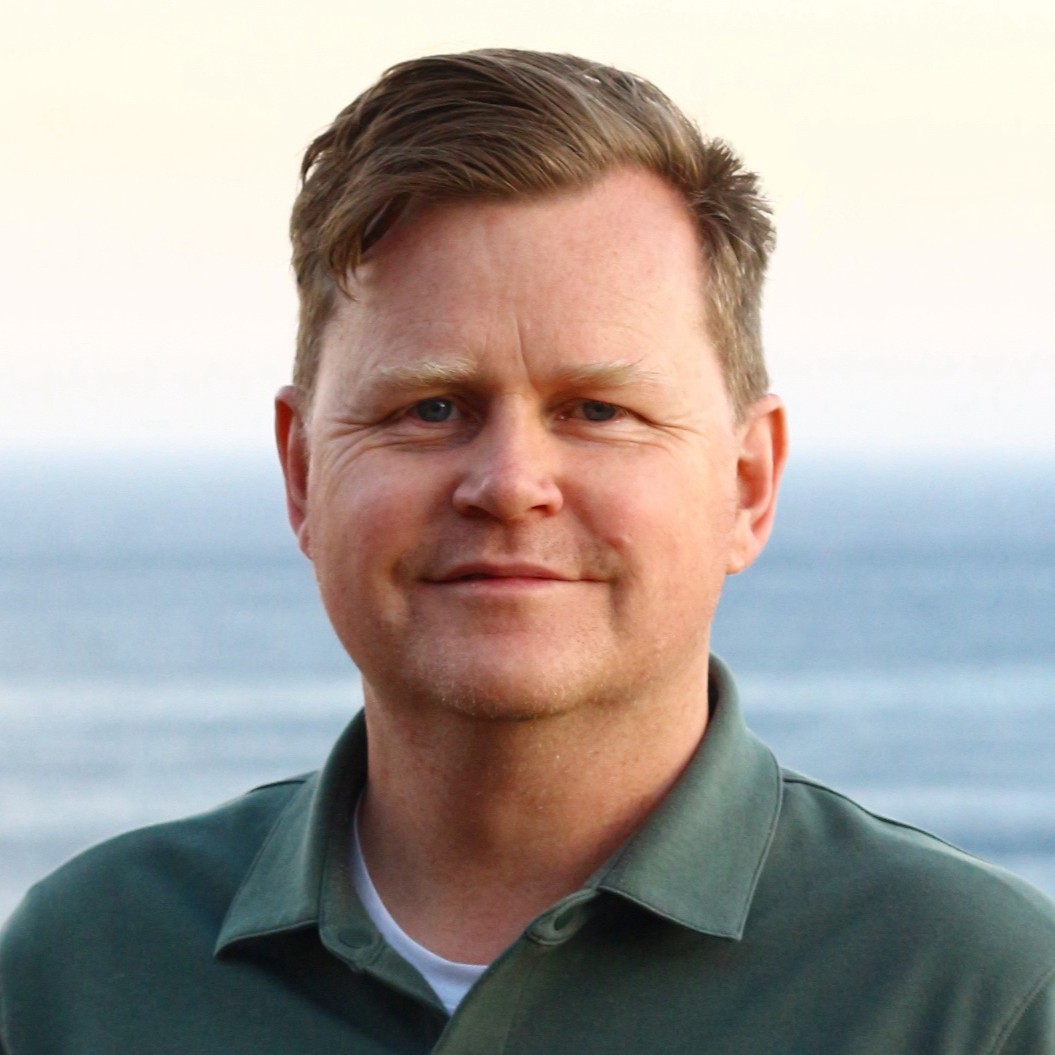 | 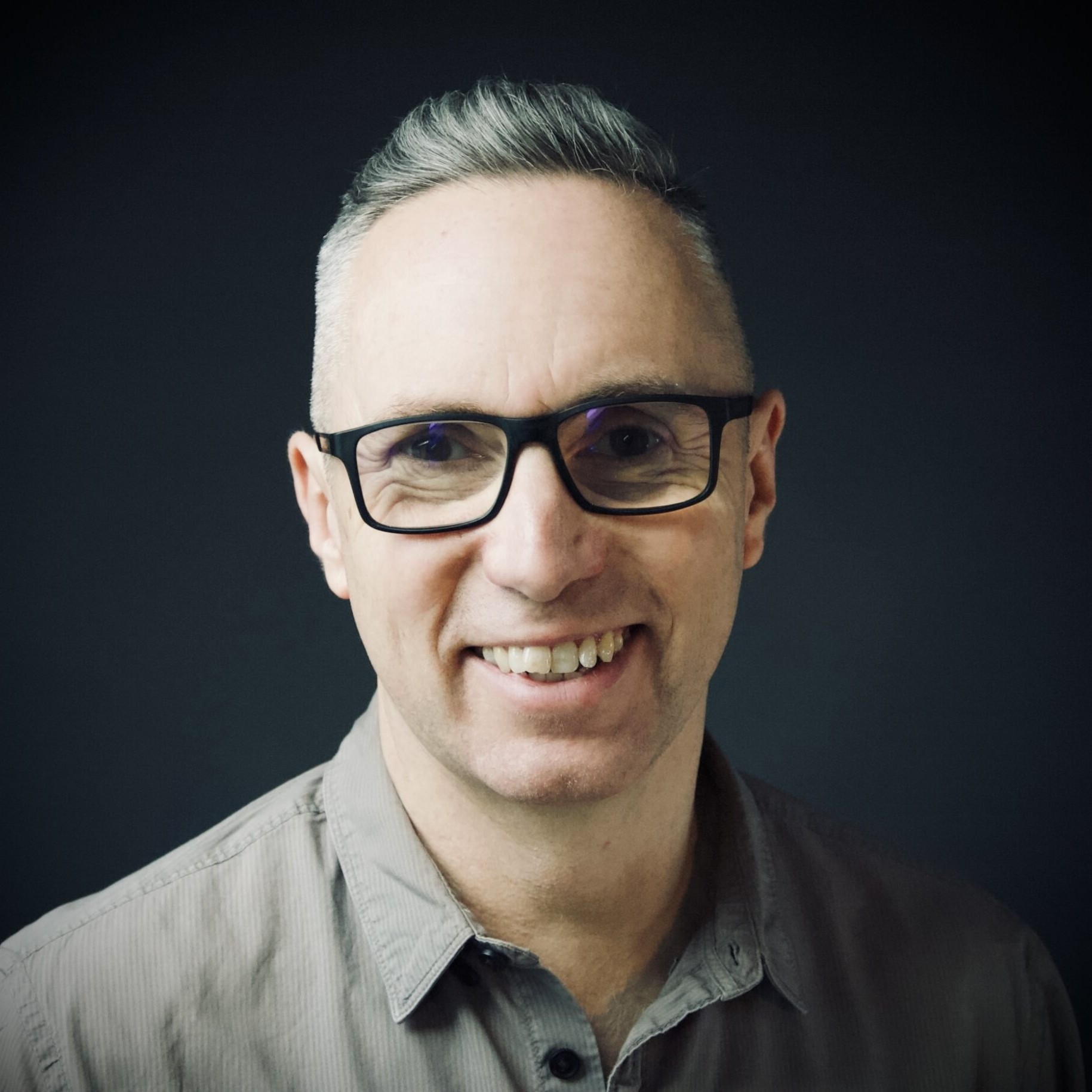 |
| Joseph Oliver, PhD, PG Dip Clinical Psychology | Richard Bennett, DClinPsyc |
Workshop Description:
This experiential workshop offers a practical and accessible introduction to Acceptance and Commitment Therapy (ACT), organised around the “head, hands, and heart” of ACT practice. The workshop places a strong emphasis on learning through experience, with participants actively engaging in experiential exercises, live demonstrations, role play, and behavioural rehearsal throughout the session.
Participants will be introduced to ACT’s theoretical foundations and core behavioural principles, alongside concrete techniques and in session strategies that can be applied immediately in clinical work. The workshop balances clear conceptual teaching with hands on practice, allowing participants not only to understand ACT intellectually, but to experience how ACT processes are actively modelled and practiced within sessions.
The structure is deliberately flexible. The morning focuses on building a coherent conceptual foundation for ACT, while the afternoon is shaped by participant questions and clinical challenges. This allows the facilitators to respond to the needs of the group while demonstrating ACT consistent clinical decision making in real time. By the end of the workshop, participants will have a clear understanding of ACT and a practical toolkit to support integration into their existing therapeutic approach.
Background and rationale
Acceptance and Commitment Therapy is increasingly recognised as an effective and flexible approach for addressing a wide range of psychological difficulties. Despite this, many therapists report feeling overwhelmed by ACT’s theoretical breadth and uncertain about how to translate ACT concepts into moment to moment clinical interventions.
This workshop is designed to bridge that gap by offering a clear, structured introduction that integrates theory, technique, and therapeutic process. ACT is presented through the organising framework of the “head” (theoretical foundations), the “hands” (interventions and techniques), and the “heart” (context, strategy, and the therapeutic relationship). This structure supports participants to develop confidence in both understanding ACT and applying it flexibly in practice.
Workshop structure and teaching methods
The workshop combines structured teaching with intensive experiential learning delivered in an online format.
The morning session focuses on introducing ACT’s theoretical foundations and core processes through interactive teaching, brief experiential exercises, and live demonstrations by the presenters.
The afternoon session is participant led and responsive to the group’s learning needs. Participants are encouraged to bring questions, clinical dilemmas, and cases. These are explored through live demonstrations, role play conducted in breakout rooms, behavioural rehearsal, video examples, and facilitated large group discussion. Throughout the workshop, participants are supported to reflect on both the techniques used and the therapeutic process, with particular attention to how experiential ACT work can be delivered effectively.
Who should attend
This workshop is suitable for mental health professionals with prior therapy training who are interested in learning ACT. It is appropriate for participants with no previous ACT experience, as well as those with some familiarity who want to strengthen their conceptual understanding and practical skills.
The workshop will be especially useful for clinicians trained in cognitive behavioural approaches who want to expand their therapeutic repertoire with an evidence based, process focused model that integrates readily with existing practice.
About the Workshop Leaders:
- Joseph Oliver, Ph.D., PG Dip Clinical Psychology
Dr Joe Oliver is a consultant clinical psychologist and founder of Contextual Consulting, an organisation providing training, supervision, and therapy in Acceptance and Commitment Therapy (ACT). He is also an Associate Professor and Programme Director for the University College London CBT for Severe Mental Health Problems postgraduate programme.
Joe is an active member of the Association for Contextual Behavioral Science (ACBS) and previously served as Secretary of the ACBS UK and Ireland Chapter Board. He is a peer reviewed ACT trainer and an ACBS Fellow. Joe regularly delivers ACT and contextual cognitive behavioural therapy training nationally and internationally.
He has authored six ACT books, including Acceptance and Commitment Therapy and Mindfulness for Psychosis and ACTivate Your Life (2nd edition), as well as several professional texts including Acceptance and Commitment Coaching, ACT: 100 Key Points and Techniques, and The Mindfulness and Acceptance Workbook for Self Esteem.
- Richard Bennett, DClinPsyc
Dr Richard Bennett is a clinical psychologist and cognitive behavioural psychotherapist, and an Associate Professor in Psychology at the University of Birmingham. He worked for over 20 years in adult and forensic mental health services within the NHS before establishing Think Psychology, an independent psychology practice providing therapy, supervision, and training, and ACTivatingyourpractice.com.
Richard is an active member of the Association for Contextual Behavioral Science (ACBS) and the British Association for Behavioural and Cognitive Psychotherapies (BABCP). He is accredited by the BABCP as a psychotherapist, supervisor, and trainer, certified as a supervisor by the Albert Ellis Institute, and recognised as both an ACBS Fellow and peer reviewed ACT trainer.
He is co editor of Rational Emotive Behaviour Therapy in Sport and Exercise and co author of Acceptance and Commitment Therapy: 100 Key Points and Techniques, The Mindfulness and Acceptance Workbook for Self Esteem, and Acceptance and Commitment Therapy: Responses to Frequently Asked Questions. Richard also co hosts the podcast Two Old Psychologists Talking About Stuff.
Following this workshop participants will be able to:
- Describe the core philosophical and behavioural principles that underpin Acceptance and Commitment Therapy.
- Identify the six core ACT processes and explain how they interact to promote psychological flexibility.
- Demonstrate basic ACT consistent assessment and case formulation strategies.
- Apply a range of ACT techniques to activate acceptance, defusion, present moment awareness, values, and committed action.
- Structure ACT interventions within therapy sessions in a way that is coherent and flexible rather than protocol driven.
- Make strategic clinical decisions informed by ACT processes and functional analysis.
- Describe common process level challenges in ACT practice, including experiential avoidance and over intellectual engagement.
- Demonstrate how to engage clients experientially in ACT exercises rather than focusing primarily on verbal explanation.
- List therapist stance and therapeutic relationship factors that support effective ACT work.
- Demonstrate how to integrate ACT principles and techniques into their existing therapeutic model.
Target audience: Beginner, Intermediate
Components: Experiential exercises, Didactic presentation, Case presentation, Role play
Topic Areas: Clinical, Relational Frame Theory
Package Includes: A general certificate of attendance
CE Credit Hours Available (7.5 hours): CEs for psychologists
CEs are not available for recorded viewing.
ACT Beyond Protocols: Finding Beauty in the Midst of Darkness
ACT Beyond Protocols: Finding Beauty in the Midst of DarknessACT Beyond Protocols: Finding Beauty in the Midst of Darkness
 Presented in English, also available for session attendees (in Lyon) via simultaneous AI (artificial intelligence) translation software in 50+ languages. More details available here.
Presented in English, also available for session attendees (in Lyon) via simultaneous AI (artificial intelligence) translation software in 50+ languages. More details available here.
Dates and Location of this IN-PERSON 2-Day Workshop:
IN-PERSON at Catholic University of Lyon (UCLY)
Tuesday, 14 July 2026 from 9:00 - 17:00 Central European Summer Time
Wednesday, 15 July 2026 from 9:00 - 17:00 Central European Summer Time
Contact Hours: 13
Workshop Leader:
 |
| Kelly G Wilson, Ph.D. |
Workshop Description:
Beginning in the mid-1980s, clinical psychology borrowed a scientific template designed for testing drugs—and quietly reshaped psychotherapy in its image. Treatment manuals became the “active ingredient,” DSM diagnoses became the disease, and randomized trials became the arbiter of legitimacy. This metaphor has been costly. It has distorted how we think about psychotherapy, how we train clinicians, and what we count as clinical knowledge.
Psychotherapy is not a pill. It is not inert, stable, or independent of the person delivering it. An antibiotic works the same no matter who hands you the pill. But who the therapist is matters—how they listen, how they respond, how they participate. The therapist is not a vessel from which a protocol is poured. And psychological suffering is not disease. Despite its claims to neutrality, the DSM rests on a latent disease model that treats syndromes as placeholders for to-be-discovered diseases. But most DSM categories function more like symptoms than illnesses—signals that invite process-level understanding rather than diagnostic finality.
Good therapy does not simplify this complexity; it works inside it. And in doing so, it can free people to live with more openness and vitality. The discomfort of not knowing precisely where the arc of therapy will take us is not a flaw—it is a feature.
From this perspective, psychotherapy is creative work. It is co-constructed, moment by moment, by therapist and client. While many frameworks offer guiding principles, my own work is grounded in contextual behavioral science. I will not offer a procedural roadmap. Instead, I will focus on the phenomenology of the work, while remaining faithful to underlying processes.
Every major psychotherapy model began as a process-based approach. Psychoanalysis never lost sight of process. Early behavior therapy and later cognitive therapy were also built from process models, even as they diverged in emphasis. Importantly, the treatments we now label “evidence-based” were developed before the DSM had stabilized and before modern RCTs existed. They emerged from theory, observation, and sustained engagement with individual lives. It may be time to question whether our fixation on averages has cost us attention to what actually moves therapy forward, here and now.
ACT does not divide the world into sick clients and healthy therapists. We are not different kinds of beings. Some suffering is more acute, more constraining, more unjust—but the roots of suffering are shared. If you look honestly at your own struggles, you will find echoes of the struggles that bring people to therapy. This is a tremendous asset and properly understood can help you to guide treatment.
Language-capable humans are uniquely vulnerable to suffering because of language itself. We do not merely feel pain—we narrate it, revisit it, anticipate it. We suffer that we have suffered, and that we might suffer again. Our primary response is problem-solving, a mode of mind that has enabled extraordinary human achievements. It also produces endless stories—about who we are, what is possible, and what must (or must never) happen in order for life to improve.
Some stories expand life. Others quietly shrink it. They impose limits that feel necessary, inevitable, and “true.” And once life becomes small enough, people stop imagining anything else. They learn to live inside the ache.
Many clients arrive having once expected more from life—and having slowly given that expectation up. Some because the world disappointed them. Some because they concluded they were undeserving. Some because they never learned to imagine otherwise.
ACT rests on a basic science suggesting that these stories need not make a prison of life. Their grip can loosen. When it does, life does not become easy—but it often becomes wider, richer, and worth every ache and pain.
This workshop will approach ACT as lived practice rather than protocol. It will be experiential and creative. Work with self and identity will be woven throughout acceptance, defusion, present-moment awareness, values, and committed action—not as an add-on, but as a central thread. We will examine these processes from the inside out.
Although this workshop is not an introduction to ACT, it will be conducted in plain language, with an emphasis on staying close to lived experience. No prior background in ACT is required. For those familiar with ACT, the workshop will deepen understanding of core principles and expand the capacity to use them flexibly in the service of therapeutic connection. The workshop is appropriate for beginners and veteran therapists alike.
Principles will be introduced sparingly. Most of our time will be spent doing the work—so that what happens here changes how you sit with your very next client.
About the Workshop Leaders:
- Kelly G Wilson, Ph.D.
Kelly G. Wilson, Ph.D., is Professor Emeritus of Psychology at the University of Mississippi and a co-founder of Acceptance and Commitment Therapy (ACT). He is the author of over 100 articles and chapters and eleven books, including Mindfulness for Two, Things Might Go Terribly, Horribly Wrong, and Terapia de Aceptión y Compromiso: Un Tratamiento Conductual Orientado a los Valores. Dr. Wilson is known for his deeply human, story-infused teaching style and his emphasis on the emotional and relational core of ACT. He has led workshops in over 40 countries, training clinicians in contextual behavioral science and the art of therapeutic presence. His work integrates behavioral science, mindfulness, compassion, and an abiding appreciation for lived human experience.
Following this workshop participants will be able to:
- Describe how the adoption of medical and pharmacological research models in the late 20th century influenced prevailing assumptions about psychotherapy, therapist roles, and treatment development.
- Differentiate protocol-driven psychotherapy from process-based approaches, including how each model organizes therapist–client collaboration in clinical practice.
- Identify therapist variables (e.g., presence, responsiveness, participation) that function as active components of the therapeutic context.
- Explain how a process-oriented understanding of psychological suffering supports collaborative case formulation and ongoing clinical decision-making.
- Demonstrate the ability to notice and track, in real time, shifts in therapeutic dialogue between contexts of limitation and contexts of possibility.
- Apply ACT-consistent, collaborative methods to explore with clients how verbal narratives, rules, and self-stories influence lived experience and behavioral flexibility.
- Integrate work with self and identity into acceptance, defusion, present-moment awareness, values, and committed action through shared experiential practice.
- Use the principles slow is fast, small is big, and less is more to guide the pacing and sequencing of collaborative therapeutic interactions.
- Formulate values-based therapeutic directions and next steps collaboratively with clients, grounded in the client’s current context and expressed values.
- Engage in experiential exercises and structured dialogues that enhance the therapist’s capacity for flexibility, presence, and creativity in the face of clinical uncertainty.
Target audience: Beginner, Intermediate, Advanced, Clinical
Components: Conceptual analysis, Experiential exercises, Didactic presentation, Roleplay, interviewing to foster creativity
Topic Areas: Clinical, Theoretical and philosophical foundations
Package Includes: A general certificate of attendance
CE Credit Hours Available (13 hours): CEs for psychologists
ACTing for your Health: How to Thrive in the Context of Chronic Illness or Health Conditions
ACTing for your Health: How to Thrive in the Context of Chronic Illness or Health ConditionsACTing for your Health: How to Thrive in the Context of Chronic Illness or Health Conditions
 Presented in English, also available for session attendees (in Lyon) via simultaneous AI (artificial intelligence) translation software in 50+ languages. More details available here.
Presented in English, also available for session attendees (in Lyon) via simultaneous AI (artificial intelligence) translation software in 50+ languages. More details available here.
Dates and Location of this IN-PERSON 2-Day Workshop:
IN-PERSON at Catholic University of Lyon (UCLY)
Tuesday, 14 July 2026 from 9:00 - 17:00 Central European Summer Time
Wednesday, 15 July 2026 from 9:00 - 17:00 Central European Summer Time
Contact Hours: 13
Workshop Leaders:
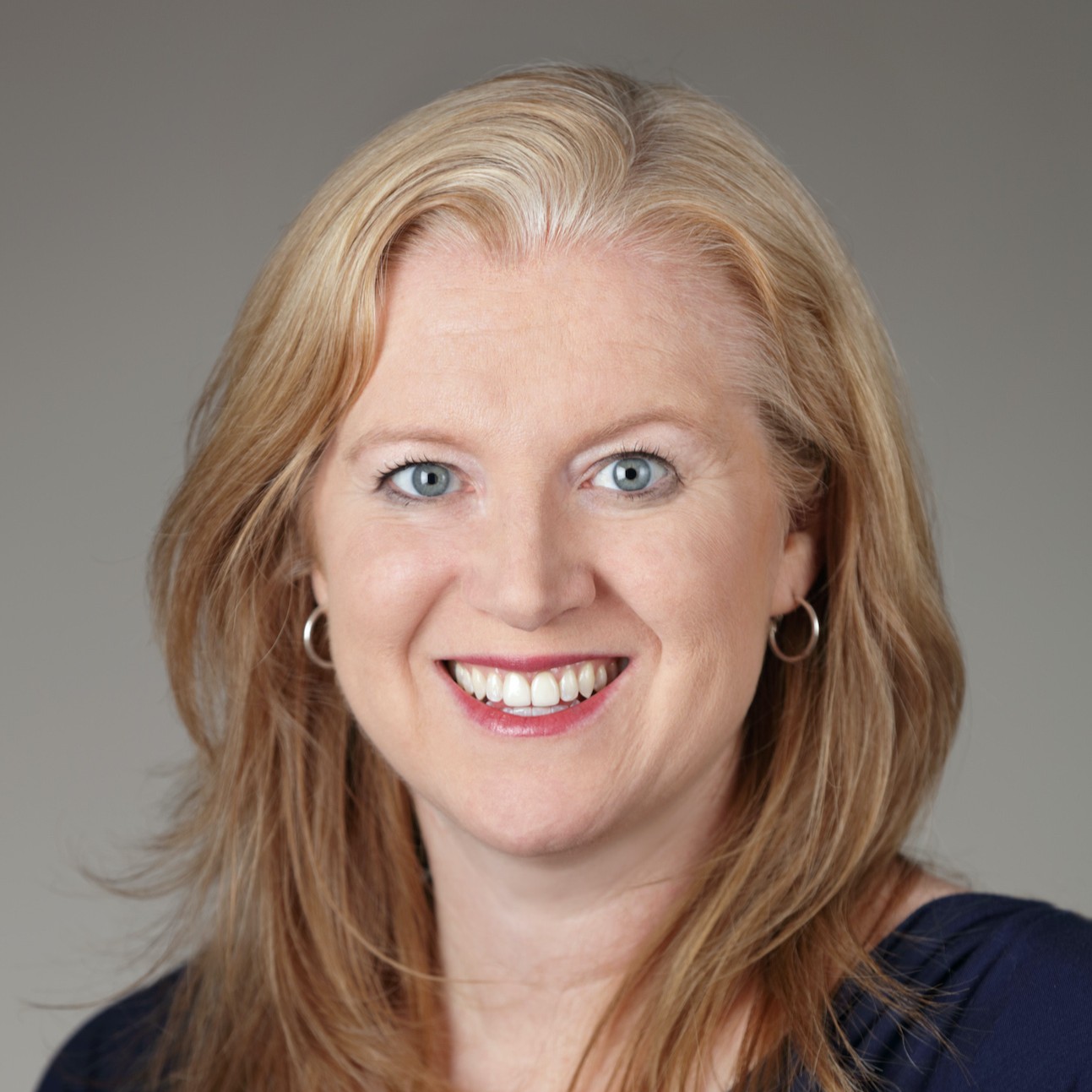 | 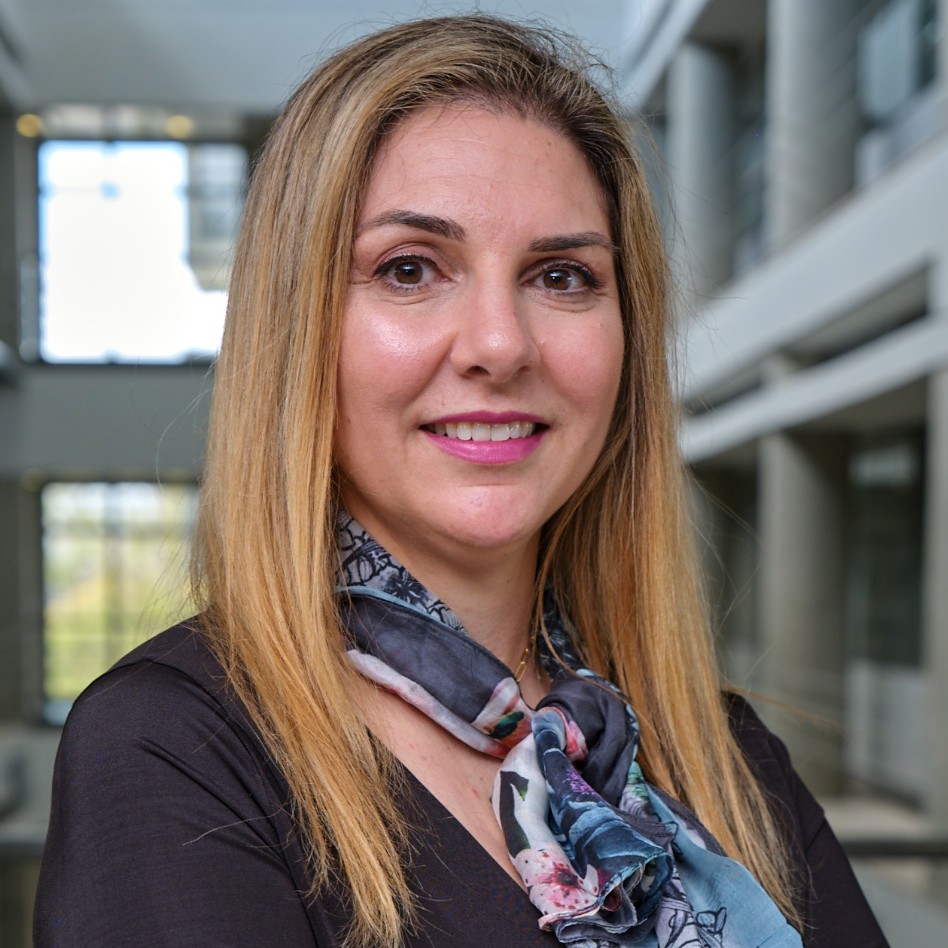 | 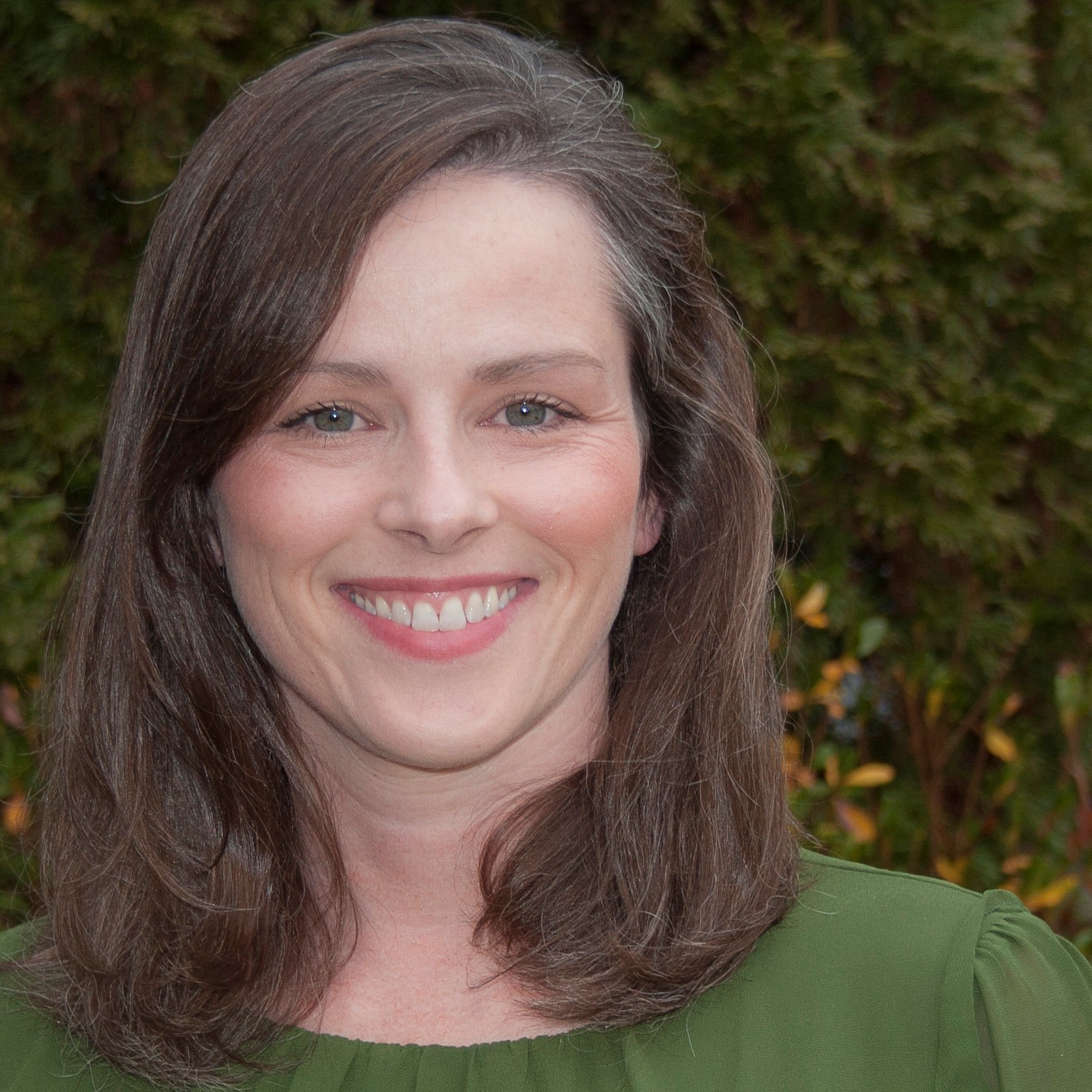 |
| Staci Martin, Ph.D. | Maria Karekla, Ph.D. | Rhonda Merwin, Ph.D. |
Workshop Description:
Many therapists will work with clients who have health conditions, such as diabetes, cancer, and chronic pain, whether or not they have specific expertise in this area. ACT is extremely well suited for people with health conditions who may experience a variety of physical symptoms like pain, weakness, fatigue, sleep problems, weight loss or gain, and more. How individuals interact with these experiences can have significant implications for the quality and longevity of their lives. Life may become centered around their condition, and/or disconnected from sources of meaning as individuals try to manage how they are feeling both physically and emotionally. Some people may also find it difficult to engage in health-promoting behaviors, for example, not participating in physical activity or taking medications as prescribed which while helpful for alleviating short-term emotional or physical discomfort, may increase suffering).
Several studies suggest that ACT is helpful for individuals experiencing a variety of medical conditions and for improving lifestyle behaviors (diet, exercise) (e.g., Levin et al, 2022; Konstantinou et al., 2023). Additional benefit may come from the use of digital or mobile technology to enhance treatment effects, intervene in-the-moment (just-in-time interventions) or facilitate at home-practice for more rapid skill acquisition and generalization.
This interactive pre-conference workshop combines didactic and experiential methods as well as opportunities for small group discussion and skills practice. Attendees will learn how to engage the 6 core ACT processes to increase effective coping with chronic illness, undermining unworkable behaviors and engaging values in the context of physical symptoms or physical limitations associated with health conditions. The presenters will outline an ACT and broader process-based approach to working with adolescents through adults with a wide variety of health conditions, including how to formulate cases, adapt interventions for maximum impact, and achieve behavior change. Presenters will discuss unique challenges and pitfalls that come with implementing this approach with people with complex conditions. Exercises and materials will be shared that can be implemented into one’s practice immediately to help clients live more fully with their condition and symptoms.
About the Workshop Leaders:
- Staci Martin, Ph.D.
Dr. Staci Martin is a clinical psychologist and peer-reviewed ACT trainer who has been working in medical settings for over 30 years. She is President Emeritus of the Mid-Atlantic Chapter of ACBS and previously chaired the ACBS Pain Special Interest Group and the ACBS Awards Committee. She also is a private ACT consultant and supervisor, and conducts trainings as an affiliate of True North Therapy and Training. She is a yearly guest lecturer on ACT at the George Washington University. At the National Cancer Institute in Bethesda, MD, she is the Clinical Director of the Health Psychology and Neurobehavioral Research Program, where her research focuses on ACT interventions for people with health conditions and their family members. Dr. Martin has authored over 85 publications in peer-reviewed journals, several of which have been selected as Editor’s Choice or Feature articles. Through her role at the NCI, she has received Special Act Awards for her expertise and leadership in the field of Acceptance and Commitment Therapy and the Outstanding Mentor Award. For the Journal of Contextual Behavioral Science, she served as Guest Editor-in-Chief (2021-2023) and is currently an Associate Editor. In addition, as an ACT expert, she has been an invited speaker throughout the U.S. and internationally and has been interviewed on several health-focused podcasts.
- Maria Karekla, Ph.D.
Maria Karekla, Ph.D., is a licensed clinical psychologist, peer-reviewed Acceptance and Commitment Therapy trainer, and Associate Professor, University of Cyprus, and heads the “ACTHealthy: Clinical Psychology and Behavioral Medicine” laboratory. Her research focuses on areas of health promotion and the investigation of individual difference factors (especially psychological flexibility parameters) as they relate to the development and maintenance of various behavioural difficulties, especially nicotine use and addiction. She also examines the treatment of these difficulties utilizing process-based and
Contextual Behavioral Science principles and innovative delivery methods (e.g., digital interventions, virtual reality) in line with precision and personalized medicine. This led to very successful digital interventions for which she received numerous local, European and international grants, and awards; among them the European Drug Prevention Prize by the Pompidou Group and the Council of Europe for innovative work in drug prevention with the active involvement of youth for the project ̈Smoking prevention and cessation in High schools and Technical schools in Cyprus. ̈ She is appointed by the Cyprus Minister of Health to the National Strategic Planning Committee for Mental Health and the National Advisory Committee for Tobacco Control, and the Board on Medically Assisted Reproduction and previously in the National Bioethics Committee. She served as the convenor of the European Federation of Psychology Associations’ (EFPA) Psychology and Health committee and is a member of the e-health task force. She is the immediate past-President of the Association for Contextual Behavioral Science (ACBS), from where she received the status of “Fellow” in 2019. In 2023 she became a fellow of the European Health Psychology Society and in 2021 by the Society of Behavioral Medicine, whereas in 2018 she was nominated as Cyprus “Woman of the Year: Academic/Researcher category.” She has published more than 140 peer-reviewed scientific articles, 13 chapters in edited books, 3 books, 4 technical reports and numerous papers in scientific conference proceedings. Her first psychotherapeutic children’s story book was nominated for the 2017 National Literary Awards (category Children/Adolescents) and for her illustrations for the book. She is active in scientific journal editorial boards (e.g., Journal of Contextual Behavior Science, Cognitive Research and Therapy). Moreover, she is a TEDx speaker and she has been hosted and interviewed for her work by numerous podcasts, newspapers, TV and radio stations nationally and internationally.- Rhonda Merwin, Ph.D.
Rhonda M. Merwin, PhD, is a Professor at Duke University and the Director of ACT at Duke, a research and clinical training program in Duke University's School of Medicine (SOM). She is also a Peer-Reviewed ACT trainer and a Fellow and past President of the Association for Contextual Behavioral Science (ACBS). Dr. Merwin has expertise in the mechanisms and treatment of problematic eating and weight control behaviors in the general population and in individuals with type 1 diabetes, and in the intersection between physical and mental health. Her research is funded by the National Institutes of Health (NIH) and Breakthrough T1D (formerly JDRF), and incorporates digital and mobile technology in assessment and intervention. Dr. Merwin is teaching faculty in Duke's SOM and trains psychiatry residents, medicine-psychiatry residents, psychology interns and clinical psychology graduate students in ACT and Process Based CBT.
Following this workshop participants will be able to:
- Identify common patterns of avoidance and fusion in chronic health or medical conditions
- Conduct a functional analysis of health or life-diminishing behavior and identify processes to engage based on the analysis
- Describe at least three ACT exercises adapted to meet the needs of chronic health / medical populations
- Evoke new responses to health or condition-related thoughts/feelings in session
- Summarize at least one research finding relevant to ACT interventions for health populations
- Identify at least two strategies to increase health-promoting behavior (e.g., movement, nutrition, medication-taking) outside of session personalized to the individual
- Use metaphor to shift how individuals are relating to their health conditions
- Describe approaching health conditions from a process-based therapy lens, including the implications of this focus within the digital age
- Discuss building patterns of values-based activity in the context of unchangeable health circumstances
- Discuss how technology can be utilized for personalizing assessment and intervention, focusing on how digital tools can enhance the therapy approach.
Target audience: Beginner, Intermediate, Advanced, Clinical
Components: Conceptual analysis, Experiential exercises, Didactic presentation, Case presentation, Role play
Topic Areas: Clinical, Behavioral medicine
Package Includes: A general certificate of attendance
CE Credit Hours Available (13 hours): CEs for psychologists, BCBA
Deep Process, Brave Work: ACT and Exposure for Trauma Recovery
Deep Process, Brave Work: ACT and Exposure for Trauma RecoveryDeep Process, Brave Work: ACT and Exposure for Trauma Recovery
 Presented in English, also available for session attendees (in Lyon) via simultaneous AI (artificial intelligence) translation software in 50+ languages. More details available here.
Presented in English, also available for session attendees (in Lyon) via simultaneous AI (artificial intelligence) translation software in 50+ languages. More details available here.
Dates and Location of this IN-PERSON 2-Day Workshop:
IN-PERSON at Catholic University of Lyon (UCLY)
Tuesday, 14 July 2026 from 9:00 - 17:00 Central European Summer Time
Wednesday, 15 July 2026 from 9:00 - 17:00 Central European Summer Time
Contact Hours: 13
Workshop Leader:
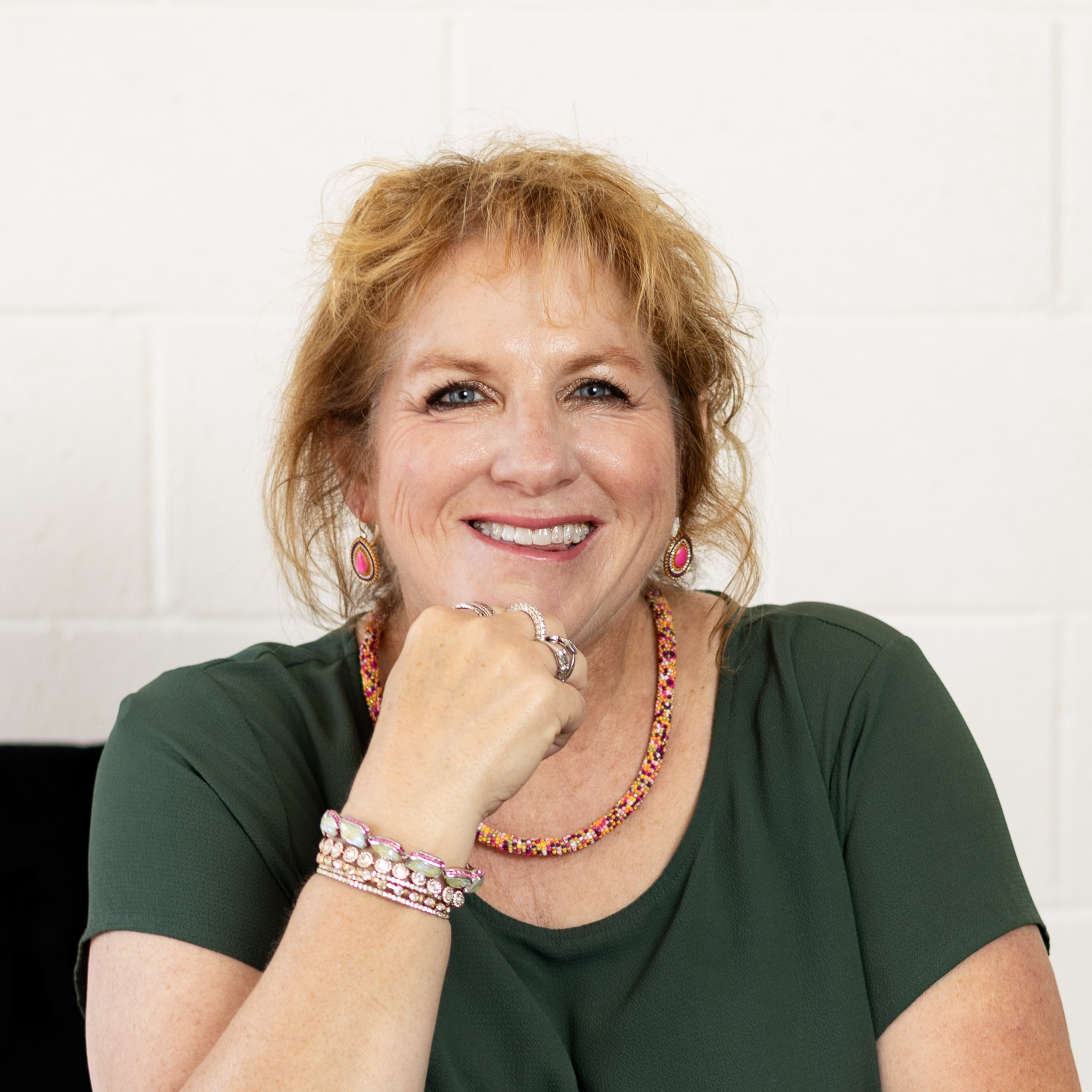 |
| Robyn Walser, Ph.D. |
Workshop Description:
Trauma and its fallout do more than generate symptoms, they reorganize behavior, learning histories, and relational patterns in ways that can entrench rigidity and restrict meaningful living. Acceptance and Commitment Therapy (ACT) offers a powerful, process-based, and client-centered approach that addresses these complexities by targeting psychological flexibility at its functional roots. Rather than relying on protocolized steps, ACT helps trauma survivors establish safety, compassion, perspective, and willingness in support of engaging meaningfully with painful histories. Within this framework, exposure becomes not simply a recounting of traumatic events but a carefully timed, functionally informed experiential process that reduces avoidance, fosters reconnection, and enables clients to move toward values-based living. This workshop is designed for clinicians who want to deepen their skills in ACT’s nuanced application to trauma while incorporating exposure principles that are both effective and consistent with ACT’s ethos of openness, courage, and compassionate engagement.
Across two days, we will examine clinical strategies for integrating ACT with trauma-focused work, including ACT-informed exposure, functional assessment of avoidance repertoires, precision timing of interventions, and process discrimination skills. We will explore how to work effectively with clients experiencing complex trauma, chronic dissociation, entrenched avoidance, and moral injury—contexts in which psychological inflexibility is often maintained within the relational space itself. Participants will learn how to shape exposure that is not merely retelling, but an experiential reintegration process rooted in present-moment awareness, self-as-context, compassion, and values-based meaning-making. We will also address how to navigate clinical dilemmas such as therapeutic ruptures, activation that outpaces regulation, and therapist-side behavioral responses shaped by the client’s interpersonal cues—signals that can emerge in boundary-challenging or morally evocative trauma presentations and that require skilled functional analysis to work with effectively.
This workshop will be highly experiential and practice-oriented, offering opportunities for live demonstrations, small-group process work, and deliberate practice focused on the subtler competencies of trauma-focused ACT. We will address pacing and titration, recognizing “early warning signs” of functional drift, the subtle shift in therapist or client behavior from promoting psychological flexibility to inadvertently reinforcing avoidance or control, and using moment-to-moment behavioral data, including relational cues, to guide intervention choices with greater nuance and integrity. Clinicians will leave with a refined conceptual framework, increased precision in applying ACT processes under emotionally and ethically complex conditions, and enhanced confidence in guiding clients through transformative exposure work that supports reconnection, resilience, and post-traumatic growth. Ultimately, participants will emerge better equipped to help clients move from trauma-shaped living toward a more open, values-guided way of being and living in the world.
About the Workshop Leaders:
- Robyn D. Walser, Ph.D.
Robyn D. Walser, Ph.D., is an internationally recognized clinical psychologist, educator, and author. She is the Director of Trauma and Life Consultation and Psychology Services, Assistant Professor at the University of California, Berkeley, and Director of Research at Bay Area Trauma Recovery Clinical Services. Dr. Walser has made significant contributions to the dissemination of Acceptance and Commitment Therapy (ACT) and held a pivotal role in implementing ACT within one of the US's largest national healthcare systems. She worked at the National Center for PTSD, where her work focused on trauma recovery, depression, and moral injury. A writer and scholar, Dr. Walser has co-authored nine influential books on ACT, including "You Are Not Your Trauma" and "The Heart of ACT: Developing a Flexible, Process-Based, and Client-Centered Practice Using Acceptance and Commitment Therapy." Her research and clinical expertise have made her a sought-after voice in advancing the application of ACT to address various complex psychological challenges. Since 1997, Dr. Walser has led ACT workshops worldwide, bringing her deep understanding and passion for process-based, experiential learning to therapists and clinicians. Known for her client-centered approach, Dr. Walser's teaching emphasizes the integration of evidence-based practices with human connection and flexibility. To learn more about her work and join her newsletter list, visit robynwalser.com.
Following this workshop participants will be able to:
- Design ACT-informed exposure procedures that emphasize experiential reintegration, psychological flexibility processes, and values-based engagement rather than rote retelling of traumatic events.
- Use the therapeutic relationship as a live context for shaping psychological flexibility, recognizing moments when relational contact, vulnerability, and interpersonal tension can function as opportunities for experiential learning.
- Conceptualize trauma presentations using a process-based ACT model, identifying how psychological inflexibility is maintained through experiential avoidance, disrupted learning histories, shame, and other fallout of trauma.
- Identify and address common barriers that arise during exposure, including emotional numbing, cognitive detours, dissociation, and avoidance masked as engagement.
- Apply self-as-context, present-moment awareness, and compassion processes to support stabilization, perspective-taking, and emotional openness during trauma-focused work.
- Use moment-to-moment behavioral data, including verbal and nonverbal relational cues, to shape intervention timing, pacing, and titration during exposure and trauma processing.
- Navigate relational challenges and therapeutic ruptures by analyzing the function of ruptures and implementing ACT-consistent repair processes that restore safety and therapeutic momentum.
- Differentiate therapist-side behavioral responses shaped by client cues (e.g., avoidance, accommodation, overprotection) and implement strategies to maintain therapeutic flexibility and presence.
- Adapt ACT and exposure interventions for clients with complex trauma presentations, including dissociation, moral injury, and high shame/avoidance patterns.
- Enhance their own psychological flexibility in moments of relational activation, using self-as-context, compassion, and willingness to remain present and effective during emotionally charged therapeutic encounters.
Target audience: Beginner, Intermediate, Advanced, Clinical
Components: Conceptual analysis, Literature review, Experiential exercises, Didactic presentation, Case presentation, Role play
Package Includes: A general certificate of attendance
CE Credit Hours Available (13 hours): CEs for psychologists
Focused ACT: Expanding the Reach of Contextual Behavioral Science in a Troubled World
Focused ACT: Expanding the Reach of Contextual Behavioral Science in a Troubled WorldFocused ACT: Expanding the Reach of Contextual Behavioral Science in a Troubled World
 Presented in English, also available for session attendees (in Lyon) via simultaneous AI (artificial intelligence) translation software in 50+ languages. More details available here.
Presented in English, also available for session attendees (in Lyon) via simultaneous AI (artificial intelligence) translation software in 50+ languages. More details available here.
Dates and Location of this IN-PERSON 2-Day Workshop:
IN-PERSON at Catholic University of Lyon (UCLY)
Tuesday, 14 July 2026 from 9:00 - 17:00 Central European Summer Time
Wednesday, 15 July 2026 from 9:00 - 17:00 Central European Summer Time
Contact Hours: 13
Workshop Leaders:
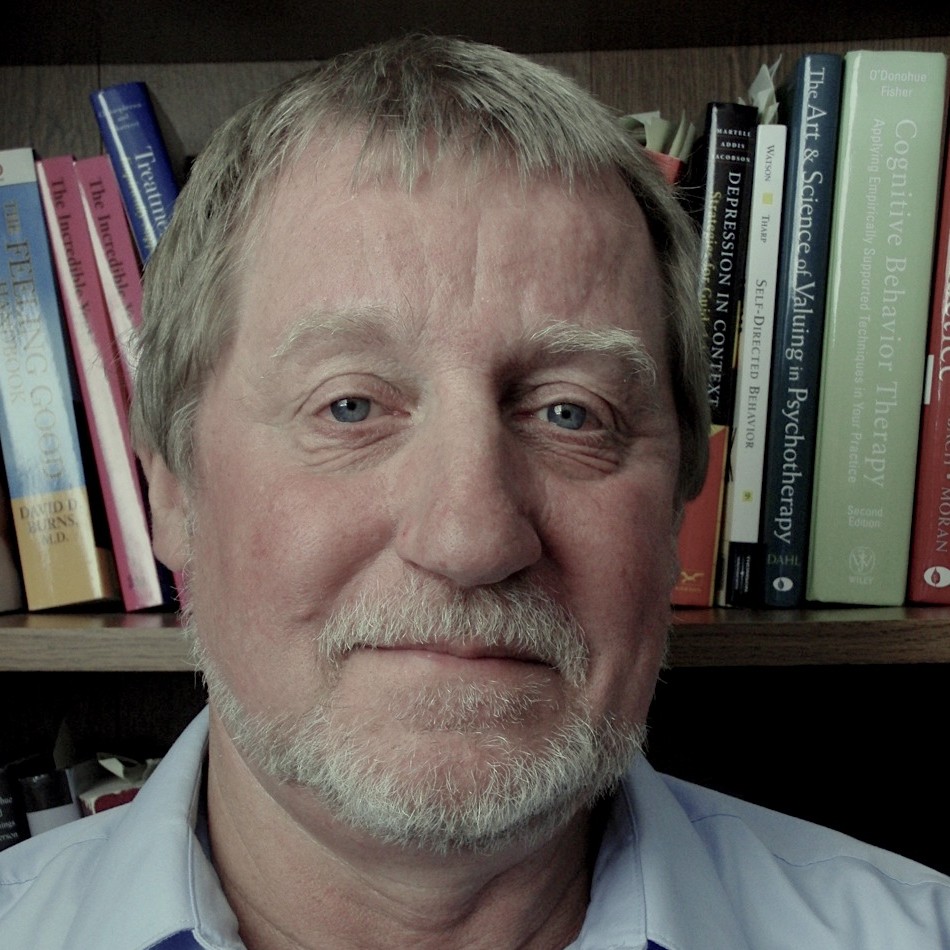 | 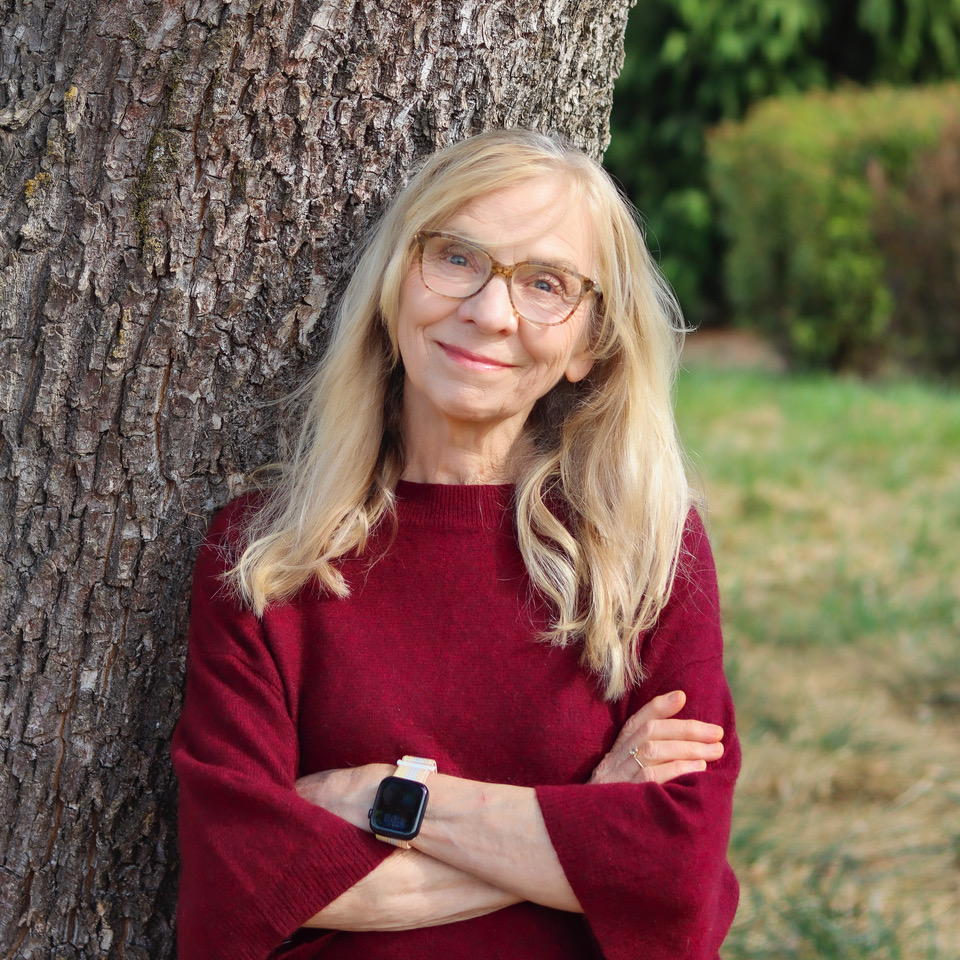 | 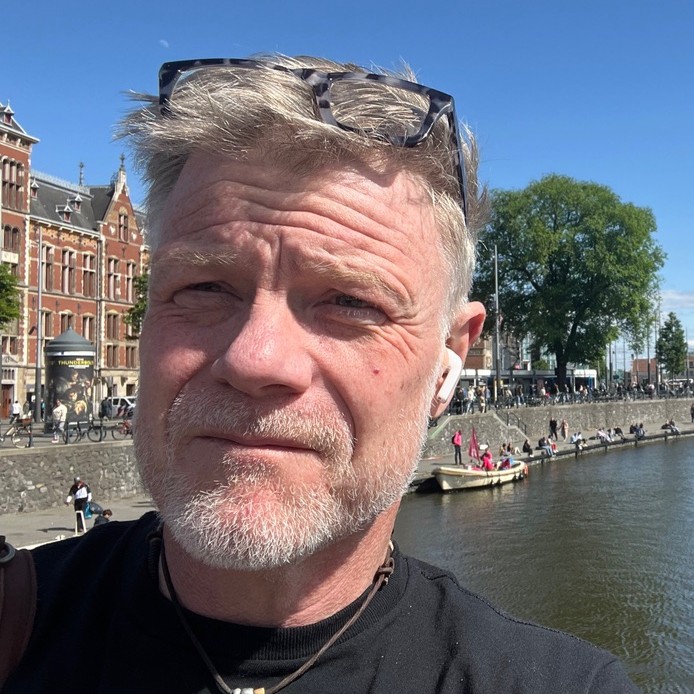 |
| Kirk Strosahl, Ph.D. | Patti Robinson, Ph.D. | Thomas Gustavsson, M.Sc. |
Workshop Description:
Helping professionals around the globe are facing an unprecedented increase in requests for behavioral healthcare, often in the context of diminishing community resources. To address this crisis, there is pressing need to implement time-efficient, effective brief intervention approaches that can increase access to care for those in need. Focused ACT (FACT) is one such brief intervention approach that promotes engagement with a broad range of people of different cultures. FACT emphasizes immediate access to care, a family focus, sensitivity to cultural context, and immediate attention to improved functioning.
In this 2-day workshop, participants will learn a core-competency-based approach to developing FACT skills for assessing, conceptualizing, reframing and promoting radical behavior change for people of all ages presenting with mental health, substance use, and/or medical problems. Healthcare providers with less training in talking therapies can learn FACT from mental health providers trained to competency in this highly transferable approach to reducing human suffering. The practice of FACT can be adapted by the user to their practice context and the expectations and needs of patients driven by setting demands. This means that FACT, as a behavioral consultation approach to behavior change, can be used in traditional mental health settings and in hospital and outpatient healthcare settings.
The FACT model is organized around a four step model known as CAARE (Context, Approach, Avoidance, Redesign, Expand). Each letter stands for a set of specific clinical tasks completed by the helping professional. The workshop provides a package of practice tools to facilitate learning and “teaching Focused ACT forward” to others. Our educational methods involve a mix of didactic, experiential, and skill-based training activities. At the conclusion of the workshop, participants will use the FACT Core Competency Tool as a self-assessment, and, based on results, develop an individual learning plan to further develop needed skills and knowledge.
About the Workshop Leaders:
- Kirk Strosahl, Ph.D.
Dr. Strosahl is a co-founder of Acceptance and Commitment Therapy and has long been a chief proponent of using Focused ACT (FACT) as a brief intervention. He has co-authored professional books on FACT, including Brief Interventions for Radical Change: Principles and Practice of Focused Acceptance and Commitment Therapy. (Robinson & Gustavsson, co-authors, 2012, New Harbinger Publications), and Inside This Moment: Promoting Radical Change in Acceptance and Commitment Therapy (Robinson & Gustavsson, co-authors, 2015, New Harbinger Publications). He has also co-authored best-selling ACT self-help books, including The Mindfulness and Acceptance Workbook for Depression, 2nd Edition (Patricia Robinson, co-author, 2018, New Harbinger Publications). He co-authored a book on Focused ACT for psychiatric practitioners, Learning Acceptance and Commitment Therapy: The Essential Guide to the Process and Practice of Mindful Psychiatry (co-authors Goubert, Torneke, Purrsey, Loftus & Roberts, 2020, American Psychiatric Publishing). Recently, he co-authored a book on using FACT for clients in crisis, Crisis integration with Acceptance and Commitment Therapy: Theory and practice (co-author Carlsson, 2023, American Psychiatric Publishing). Dr. Strosahl has conducted numerous training workshops on FACT around the world. Because his approach to teaching is so clinician oriented, accessible and practical, Dr. Strosahl has been referred to as the “hands of ACT”.
- Patti Robinson, Ph.D.
Dr. Robinson, PhD, is currently the President of Mountainview Consulting Group (www.Mtnviewconsulting.com) (winner of an APA Presidential Innovative Practice Award). She received the Don Bloch Award for excellence in integrated care in 2023 and the Primary Care Luminary Award in 2025. Dr. Robinson is co-founder of the Primary Care Behavioral Health model and Focused Acceptance and Commitment Therapy. She provides consultation and training services internationally and is committed to improving access to healthcare services and to realization of health equity. Earlier in her career, she worked as a researcher and clinician and then as a Behavioral Health Consultant. She has published extensively, and with Jeff Reiter, completed the 3rd Edition of Behavioral Consultation and Primary Care: A Guide to Integrating Services (http://SpeaktoyourDoctor.com). “Patti” lives in the Willamette Valley of Oregon with her partner and their pups, Mac and Molly.
- Thomas Gustavsson, M.Sc.
Thomas Gustavsson, M.Sc., and clinical psychologist, peer reviewed ACT-trainer has worked with brief interventions based on ACT and other contemporary behavior therapies within different organizations for the last 18 years. He is one of the founders of Psykologpartners, a fast growing company working with consulting services both for health care services and others. During 2005-2012 main focus was on developing brief interventions in psychiatric clinics for clients with self harming, eating disorders, anxiety and depression. One of the concepts developed and evaluated in psychiatric care is transdiagnostic group therapy. A model that increases availability to treatment and shortens time on waiting list for clients. That model has been trained in numerous workshops in Swedish health system and implemented in different settings. Besides this work Thomas has been working with training, supervision and clinical work based on ACT and behavior therapy.
From 2012-2021, Thomas worked 75% as a treatment developer, supervisor and clinical psychologist at Segesholms treatment center in south Sweden (3 units). The main population is young woman with severe mental and behavioral disorders such as self harming behaviors, suicidal behaviors, eating disorders, OCD, depression, anxiety and different developmental disorders such as autism, ADHD, and intellectual disabilities.
Between 2014-2016 Thomas worked as a treatment developer and clinical psychologist at EMBLA treatment center. The main population was women with substance abuse in combination with severe mental illness. From 2016-2021 Thomas was a co owner, treatment developer and clinical psychologist at Osterlenportens treatment center for young women. Suicidal behaviors, PTSD, eating disorders, OCD and self harming behaviors with or without disabilities are the main clientele
at Osterlenporten.Thomas are also working part time training staff in FACT in numerous settings. That also includes more complex implementations and consulting. From March 2021 Thomas runs Skånes Psykologiska Utbildningsinstitut AB for clinical work, training, supervison and consulting.
He runs a small company (Beteendekollektivet) together with his wife solely for the purpose of writing. He is also a co writer of four books. When Thomas doesn´t work he spends time with his 4 kids and also loves to hunt boar and fly
fishing for salmon.
Following this workshop participants will be able to:
- Describe psychological flexibility in approach-avoidance terms.
- Demonstrate FACT session flow using the CAARE acronym (Context, Approach, Avoid, Redesign, Expand).
- List core components of the Life Context part of the FACT Contextual Interview.
- List the core components of the Problem Context of the FACT Contextual Interview.
- Demonstrate how to incorporate the approach-avoidance dynamic within the Contextual Interview.
- Describe the three FACT in-session rating scales and their application to metrics-informed practice.
- Conceptualize possible ways of helping a person using the FACT Four Square tools and Pillars Assessment Tool.
- Describe different ways to frame problems to increase client agency and motivation for experimentation.
- Describe ways to use present moment interventions to ignite the rapid change process.
- Explain how to use two core FACT metaphors to promote behavior change (e.g., FACT Life Path, FACT Bull's Eye, FACT Web of Life).
- Use the CAN-DO checklist to evaluate the quality of a FACT behavioral experiment.
- Discuss the core purposes and clinical activities of a FACT follow-up visit.
- Complete a self-assessment of core FACT clinical skills using the FACT Competency Assessment Tool.
- Create a learning plan to guide subsequent study and practice activities that support mastery of FACT.
Target audience: Beginner, Intermediate, Clinical
Components: Conceptual analysis, Experiential exercises, Didactic presentation, Case presentation, Role play
Topic Areas: Clinical, Brief Interventions
Package Includes: A general certificate of attendance
CE Credit Hours Available (13 hours): CEs for psychologists, BCBA
Metaphors that Move, Matter and Make a Difference - A Creative, Experiential Workshop on Crafting Functionally Guided Metaphors That Bring Psychological Flexibility Processes to Life
Metaphors that Move, Matter and Make a Difference - A Creative, Experiential Workshop on Crafting Functionally Guided Metaphors That Bring Psychological Flexibility Processes to LifeMetaphors that Move, Matter and Make a Difference - A Creative, Experiential Workshop on Crafting Functionally Guided Metaphors That Bring Psychological Flexibility Processes to Life
Dates and Location of this VIRTUAL 2-Day Workshop:
VIRTUAL LIVE online via Zoom
Recordings will be available through 25 June 2026. We regret that we are unable to provide extended access to any registrant beyond 25 June.
Automated Zoom captioning and automated Zoom translation available.
Friday, 5 June from 9:00 to 13:00 UTC/GMT +2 (Central European Summer Time) - click here to convert to your time zone
Saturday, 6 June from 9:00 to 13:00 UTC/GMT +2 (Central European Summer Time) - click here to convert to your time zone
Contact Hours: 7.5
Workshop Leaders:
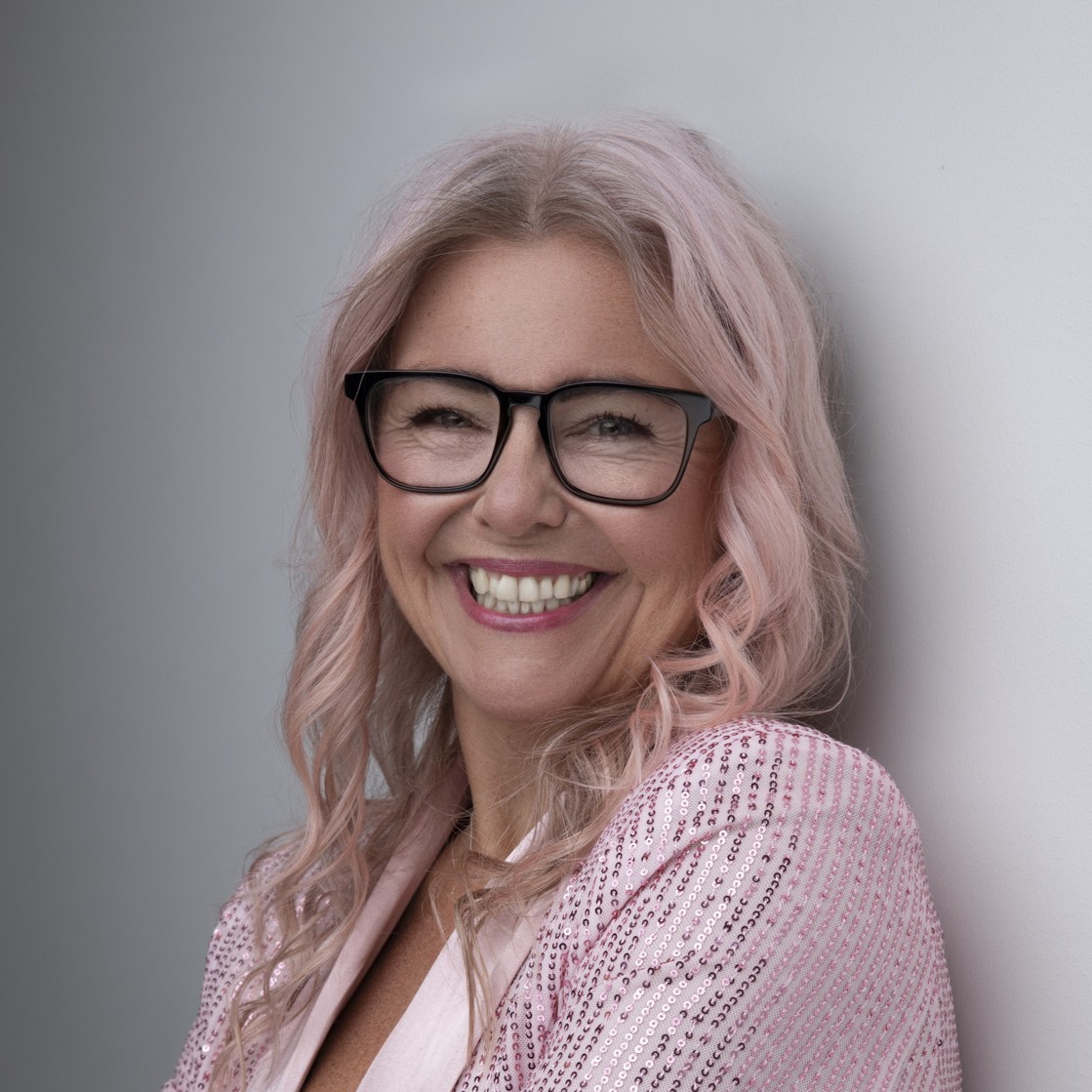 |
| Rikke Kjelgaard, M.Sc. |
Workshop Description:
Metaphors are a powerful and deeply versatile tool in contextual behavioral therapies. They help us turn complex ideas into something people can immediately relate to, understand and connect with. When grounded in function, metaphors can open space, shift perspective, strengthen alliance and promote psychological flexibility in ways that simple explanations cannot. This workshop explores how to craft metaphors that truly move, matter and make a difference.
Many practitioners rely on scripted metaphors or familiar exercises they have memorized. These can be helpful, but they often lose impact when delivered rigidly or without connection to the client’s unique context. In this workshop you will learn how to move beyond pre-written scripts and instead create metaphors that emerge naturally from multiple sources: the moment-to-moment interaction, the client’s own language and lived experience, and your own well of inspiration drawn from films, music, everyday observations and personal stories. We will explore how relational framing processes shape meaning and how understanding these dynamics can help you design metaphors that resonate more deeply and support the psychological flexibility model.
Across two interactive online half-days, we will work experientially through demonstrations, creative exercises and micro-skills practice. You will learn simple, playful and highly practical methods for generating metaphors that illuminate openness, awareness and effective action. We will look at how to use clients’ words and narratives as raw material, how to adapt metaphors spontaneously as a session unfolds and how to use metaphor to clarify values, soften struggle and inspire meaningful change.
You do not need to consider yourself a creative person to benefit from this workshop. Curiosity and willingness are enough. By the end, you will have a functionally guided metaphor toolkit you can apply immediately in therapy, teaching or supervision, along with the confidence to craft new metaphors whenever you need them. Come ready to explore, play and create metaphors that bring psychological flexibility processes to life.
About the Workshop Leaders:
- Rikke Kjelgaard, M.Sc., Licensed Psychologist
Rikke Kjelgaard is a licensed psychologist and international CBS educator known for her warm, playful and experiential approach to teaching. With nearly 20 years of experience and more than 500 workshops delivered worldwide, she has become especially recognized for making complex ideas simple, practical and deeply human. Rikke is often described as a “chief rock’n’roller” in the ACT and CBS community because of her unique ability to blend science, creativity and heartfelt connection in ways that inspire real change. She is passionate about helping practitioners bring psychological flexibility processes to life through creative, functionally guided clinical work, including the use of metaphors that truly resonate and make a difference.
Following this workshop participants will be able to:
- Describe the role of metaphors in contextual behavioral therapies and how they support the processes of psychological flexibility.
- Identify what makes a metaphor functionally guided rather than scripted or decorative.
- Generate original metaphors that illuminate openness, awareness and effective action in accessible and meaningful ways.
- Create metaphors that arise from multiple sources, including the client’s language and lived experience, the moment-to-moment interaction and the therapist’s own experiences, stories, films, music and everyday observations.
- Use clients’ words and narratives as functional cues for shaping metaphors that resonate personally and contextually.
- Adapt metaphors flexibly in-session to match the client’s emotional state, motivation and behavioral patterns
- Integrate metaphors to soften experiential avoidance, promote willingness and deepen acceptance.
- Apply metaphors to clarify values, strengthen motivation and support committed action.
- Utilize functionally guided metaphors to enhance therapeutic alliance, shared understanding and emotional connection.
- Demonstrate creative micro-skills for delivering metaphors with presence, warmth and psychological flexibility.
Target audience: Beginner, Intermediate, Clinical
Components: Conceptual analysis, Experiential exercises, Didactic presentation, Role play
Topic Areas: Clinical, Relational Frame Theory
Package Includes: A general certificate of attendance
CE Credit Hours Available (7.5 hours): CEs for psychologists
CEs are not available for recorded viewing.
Process-Based Pathways to Self-Compassion in Neurodivergent People
Process-Based Pathways to Self-Compassion in Neurodivergent PeopleProcess-Based Pathways to Self-Compassion in Neurodivergent People
Dates and Location of this VIRTUAL 2-Day Workshop:
VIRTUAL LIVE online via Zoom
Recordings will be available through 25 June 2026. We regret that we are unable to provide extended access to any registrant beyond 25 June.
Automated Zoom captioning and automated Zoom translation available.
Friday, 5 June from 9:00 to 13:00 UTC/GMT +2 (Central European Summer Time) - click here to convert to your time zone
Saturday, 6 June from 9:00 to 13:00 UTC/GMT +2 (Central European Summer Time) - click here to convert to your time zone
Contact Hours: 7.5
Workshop Leaders:
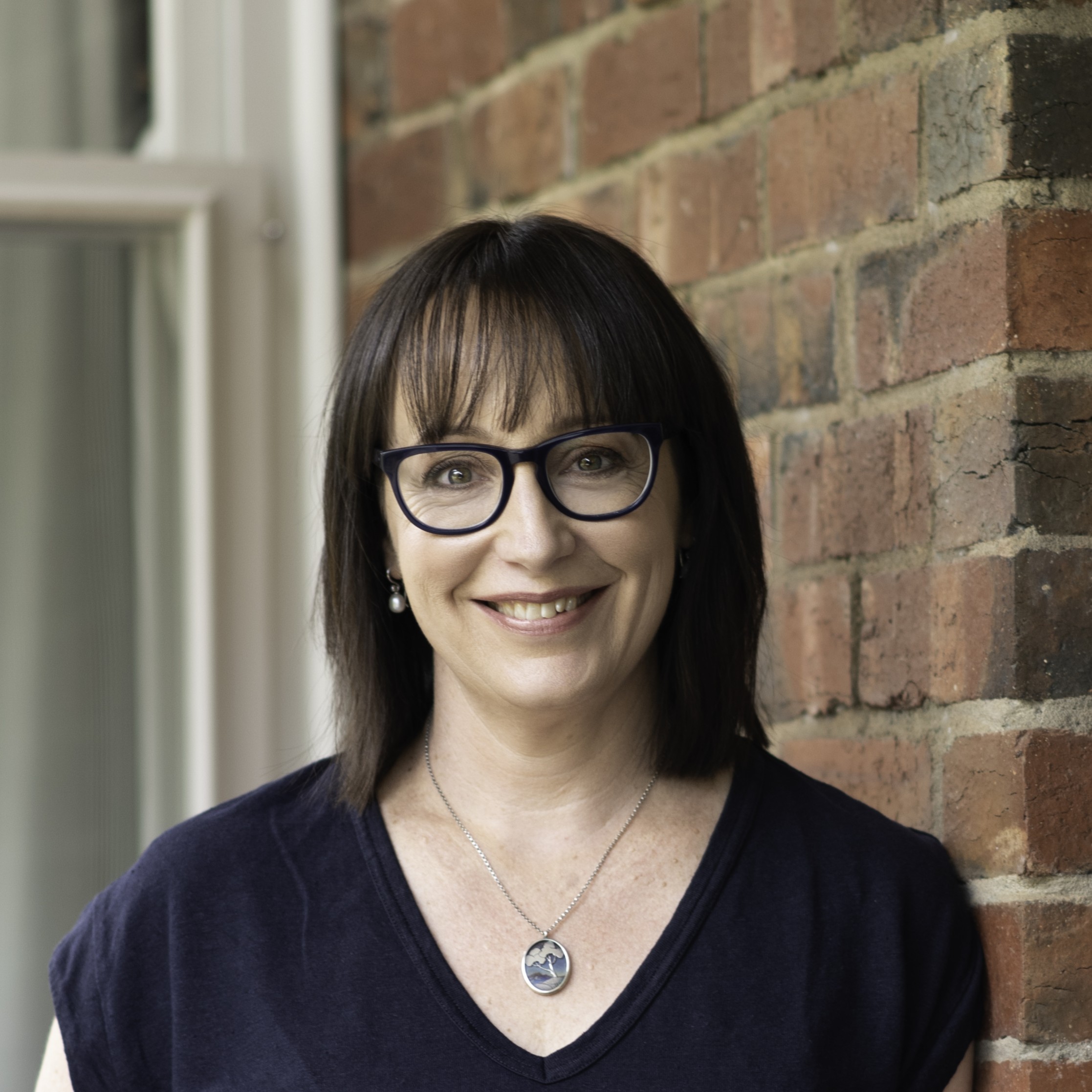 |
| Jennifer Kemp, MPsych(Clinical) |
Workshop Description:
Living as an Autistic person or ADHDer in a society that does not accept or accommodate your needs leads to powerful, lasting feelings of failure, shame and inadequacy. Over time, stigmatising and ableist attitudes are internalised, resulting in lower levels of self-compassion compared to non-neurodivergent peers, and relentless self-criticism (Beaton, Sirios, & Milne, 2020 & 2022; Cai & Brown, 2021; Howes, Richards, & Galvin, 2021). For many neurodivergent people, the outcomes include significantly worse physical health and psychological well-being, higher rates of self-harm and completed suicide, and shorter life spans.
Self-compassion is associated with improved mental health and well-being, and a greater ability to regulate emotions (Cai, Gibbs, et al., 2022; Willoughby and Evans, 2019). Compassion-focused approaches offer the potential to increase self-acceptance and improve quality of life. However, to be effective, therapy must be grounded in an understanding of social and neurobiological contexts and target the essential skills that underpin and enable self-compassion.
This intermediate-level workshop will apply a process-based approach to providing effective, affirming therapy for neurodivergent people.
Participants will explore four key processes that neurodivergent people often find challenging yet are essential to self-compassion and self-acceptance. (Incidentally, these are also domains that are rarely addressed in professional training and where therapists can feel particularly stuck.)
These four processes are:
1. Interoceptive awareness of one’s own needs
2. Emotional awareness in alexithymia
3. Intentional self-soothing through the senses
4. Strengths-based approaches to executive functioning
Over 7.5 hours of interactive and engaging activities, participants will learn how to help their clients transform harsh self-criticism, self-stigma, and internalised ableism into psychological and emotional well-being, by facilitating practical self-compassion, radical self-acceptance, and pride in their neurodivergent identity. Participants' learning will be supported with a wide range of resources, including e-books, client handouts and worksheets.
About the Workshop Leaders:
- Jennifer Kemp, MPsych(Clinical)
Jennifer Kemp
BSc(Psych)Hons, MPsych(Clinical), GradDipApplSc(Psychology of Coaching), MAPS, FCCLP
Adjunct Lecturer, School of Psychology, University of AdelaideJennifer Kemp is a privately practising clinical psychologist in Adelaide, Australia. Her neurodiversity-affirming approach is founded on her own experience of being late-diagnosed with Autism and ADHD and the latest research. Jennifer listens deeply to the experiences of her neurodivergent clients, acknowledging the unique perspectives and strengths of people with intersectional and neurobiological differences.
In her therapeutic practice and when training other therapists, Jennifer uses acceptance and commitment therapy (ACT) with compassion-focused approaches to help her clients improve their mental health and develop greater self-acceptance, self-compassion, and pride in their neurodivergent identity.
Jennifer is the co-author of The Neurodivergent Skills Workbook for Autism and ADHD: Cultivate Self-Compassion, Live Authentically, and Be Your Own Advocate and author of The ACT Workbook for Perfectionism: Build Your Best (Imperfect) Life Using Powerful Acceptance & Commitment Therapy and Self-Compassion Skills.
Following this workshop participants will be able to:
- Identify and explore internalised ableism, social stigma, and the neurobiological and social contexts that contribute to chronic shame and self-criticism with Autistic and ADHD clients.
- Apply a process-based approach to identify gaps in knowledge, skills, and/or understanding and improve well-being with neurodivergent clients.
- Implement practical therapeutic strategies to enhance interoceptive awareness of physical, emotional, and sensory needs.
- Provide targeted interventions to build emotional awareness in clients with alexithymia, facilitating more accurate identification and labelling of emotional states.
- Develop intentional sensory self-regulation strategies to support self-soothing and emotion regulation and replace unhelpful patterns.
- Implement approaches that support executive functioning by harnessing strengths and making practical, self-compassionate choices.
- Integrate principles of compassion-focused therapy (CFT) with the social model of disability to foster radical self-acceptance and neurodivergent pride.
- Utilise the provided clinical resources, including e-books, client handouts and worksheets, to immediately implement these strategies in their ongoing clinical practice.
Target audience: Beginner, Intermediate, Advanced, Clinical
Components: Conceptual analysis, Literature review, Experiential exercises, Didactic presentation, Case presentation, Role play
Topic Areas: Clinical, Theoretical and philosophical foundations
Package Includes: A general certificate of attendance
CE Credit Hours Available (7.5 hours): CEs for psychologists
CEs are not available for recorded viewing.
Psychedelic-Assisted Therapy Through an ACT Lens: Preparation, Dosing, and Integration
Psychedelic-Assisted Therapy Through an ACT Lens: Preparation, Dosing, and IntegrationPsychedelic-Assisted Therapy Through an ACT Lens: Preparation, Dosing, and Integration
Dates and Location of this VIRTUAL 2-Day Workshop:
VIRTUAL LIVE online via Zoom
Recordings will be available through 25 June 2026. We regret that we are unable to provide extended access to any registrant beyond 25 June.
Automated Zoom captioning and automated Zoom translation available.
Friday, 5 June from 14:00 - 18:00 UTC/GMT +2 (Central European Summer Time) - click here to convert to your time zone
Saturday, 6 June from 14:00 - 18:00 UTC/GMT +2 (Central European Summer Time) - click here to convert to your time zone
Contact Hours: 7.5
Workshop Leaders:
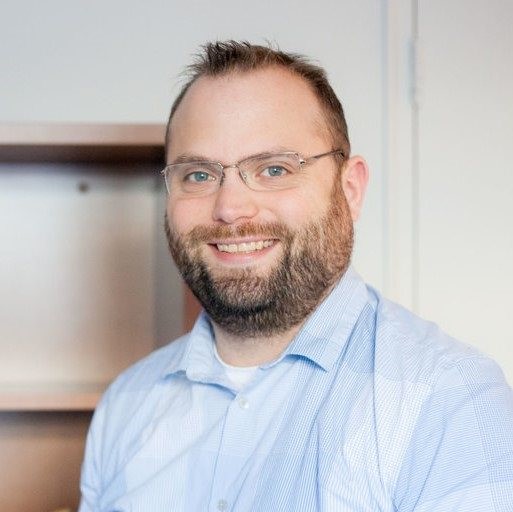 | 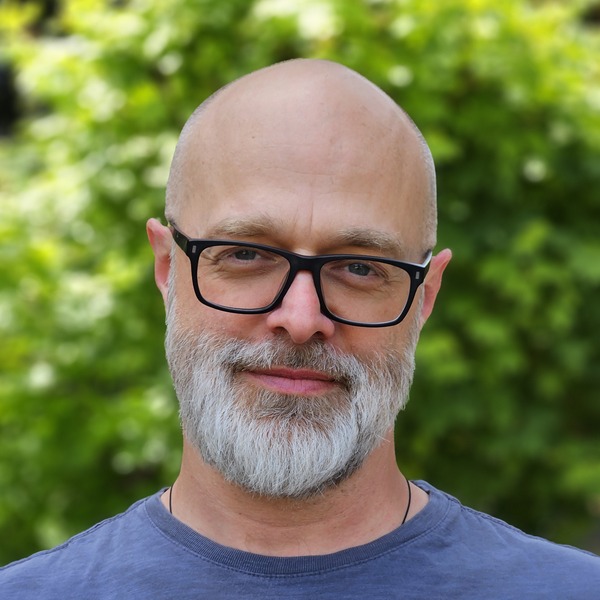 | 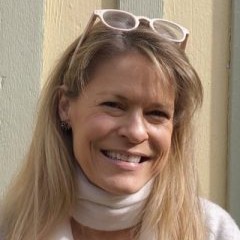 | 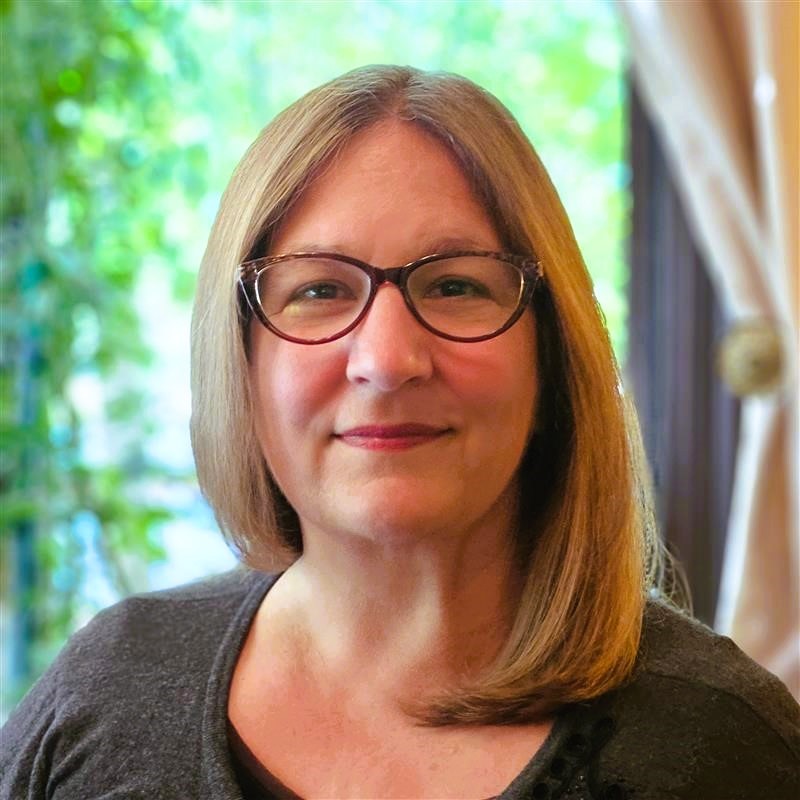 | 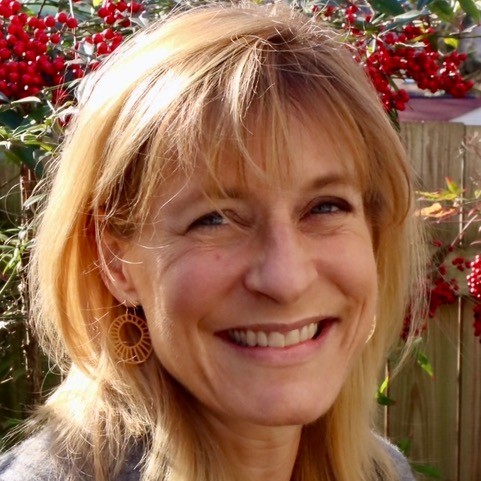 |
| Brian Pilecki, Ph.D. | Jason Luoma, Ph.D. | Temple Morris, LCSW-C | Jenna LeJeune, Ph.D. | Miranda Morris, Ph.D. |
Workshop Description:
As psychedelic-assisted therapy moves toward broader accessibility, this two-day workshop equips clinicians with an ACT framework for understanding and discussing psychedelic-assisted therapy (PAT) with clients. Led by clinician-researchers with extensive experience integrating ACT and psychedelics in clinical trials, retreats, and psychotherapy, participants will explore how psychological flexibility processes provide a coherent model for understanding PAT's mechanisms and applications through the EPPC framework (Embodiment, Perspective, Purpose, Connection)—an adaptation of ACT for psychedelic contexts. Clinicians familiar with ACT will find EPPC a natural extension of concepts they already use, while those new to ACT will appreciate EPPC's pragmatic, clinically intuitive approach that can be readily applied without extensive prior training.
The workshop reviews recent psychedelics research, the evolving legal landscape, and risks and benefits across substances (psilocybin, MDMA, ketamine), while addressing foundational elements of the clinical PAT model. Diversity, equity, and cultural humility considerations will be integrated throughout, including access barriers for underserved populations and risks of cultural appropriation. Participants will learn how psychedelics may enhance psychological flexibility and how EPPC principles guide preparation, dosing support, and integration.
Through didactic presentation, case examples, and experiential exercises, clinicians will develop practical tools for having informed conversations with interested clients and supporting them through psychedelic experiences in clinical trials, legal settings, or integration-focused work.
About the Workshop Leaders:
- Brian Pilecki, Ph.D.
Dr. Brian Pilecki is the Clinical Services Manager and an Associate Scientist at the Portland Institute of Psychedelic Science, a subsidiary of Portland Psychotherapy Therapy Clinic, Research, and Training Center. He is an active researcher and a study therapist on several clinical trials including the investigation of the use of MDMA-assisted therapy for the treatment of social anxiety disorder. Brian is also an instructor for Fluence, a leading psychedelic training organization where he provides training to psilocybin facilitators in state-level programs or to study therapists in clinical trials across the country. He is co-founder of Perspective Retreats which offers group psilocybin retreats in the Netherlands, and provides psilocybin facilitation to individuals and groups in the state of Oregon. Brian is a co-founder of Portland Integration Network, a network of professionals offering specialized care related to p sychedelics in Oregon. He is also the author of the book ACT-Informed Exposure for Anxiety and co-host of Altered States of Context, a podcast about psychotherapy and psychedelics.
- Jason Luoma, Ph.D.
Jason Luoma, Ph.D. is Director of Research at the Portland Institute for Psychedelic Science (https://www.pipsinstitute.com/) and CEO of Portland Psychotherapy Clinic, Research, & Training Center in Portland, OR, a social enterprise that generates revenue to support research. He is also Associate Scientist at the Oregon Research Institute and affiliate faculty at the Oregon Health Sciences University.
His research focuses on shame, self-stigma, connection, and the application psychedelic assisted therapy and Acceptance and Commitment Therapy (ACT) as an intervention for reducing shame and increasing self-compassion. He was the principal investigator of a recently completed trial of MDMA-assisted therapy for social anxiety disorder and is an investigator on a soon to launch open trial of psilocybin-assisted therapy for chronic pelvic pain. He co-founded the Open Psychedelic Evaluation Nexus (OPEN), a practice-research network that is studying the implementation of supported psilocybin services in Oregon.
He is an internationally recognized trainer in ACT and past president of the Association for Contextual Behavioral Science. He has over 80 peer-reviewed publications and has co-authored two books: Learning Acceptance and Commitment Therapy and Values in Therapy. He provides psychedelic-assisted therapy training for therapists via Perspective Retreats- Temple Morris, LCSW-C
Temple Morris, LCSW-C, is co-founder of True North Therapy & Training, a group dedicated to sharing contextual behavioral therapies with clients, practitioners, and the broader community. As a therapist, she specializes in Acceptance and Commitment Therapy (ACT) and Psychedelic Harm Reduction and Integration (PHRI), and provides clinical supervision and consultation in both modalities. Temple works as a Consultant Therapist at Sunstone Therapies, providing psychedelic-assisted therapy to study participants with PTSD and treatment-resistant depression. She co-founded Perspective Retreats, which offers ACT-informed experiential training to help professionals support psychedelic experiences safely and effectively. She also co-founded Psychedelic Assisted Therapy and Healing (PATH), a nonprofit working to make legal psychedelic therapy accessible and affordable. Temple serves as co-chair of the ACBS Psychedelic Special Interest Group boar d, where she co-leads monthly ACT-informed PHRI peer consultation groups
- Jenna LeJeune, Ph.D.
Jenna LeJeune, Ph.D. is President and co-founder of Portland Psychotherapy Clinic, Research and Training Center in Portland, Oregon. She is also a study therapist at the Portland Institute for Psychedelic Science where she is involved in various clinical trials involving psychedelic-assisted psychotherapy. She is a co-founder of Perspective Retreats where she is involved in running ACT-based psychedelic training retreats for mental health professionals. As a licensed psychologist, Jenna is deeply interested in issues related to meaning, purpose, belonging, and values. She is the co-author of the book Values in Therapy: A Clinician's Guide to Helping Clients Explore Values, Increase Psychological Flexibility, and Live a More Meaningful Life as well as numerous other book chapters, journal articles, and other publications. Dr. LeJeune is also an ACBS Fellow and a peer-reviewed ACT trainer and provides ACT trainings for professionals around the world.
- Miranda Morris, Ph.D.
Miranda Morris, PhD is a psychologist in Bethesda, MD and a Peer Reviewed ACT Trainer who conducts regular workshops in Acceptance and Commitment Therapy (ACT) and related therapies including Functional Analytic Psychotherapy (FAP). She is currently a Past President of the Board of the Association of Contextual Behavioral Science (ACBS). In addition, Miranda is a co-founder and trainer with Perspective Retreats, an organization which offers professional training retreats integrating ACT with psychedelic-assisted psychotherapy. She is the clinical director and co-founder of True North Therapy and Training, a group dedicated to sharing contextual behavioral therapies with clients, practitioners, and the broader community.
Following this workshop participants will be able to:
- Describe the current state of psychedelics research across mental health conditions.
- Explain how psychedelics may enhance psychological flexibility through increased embodied awareness, perspective-shifting, values clarity, and meaningful connection.
- Map EPPC’s four core processes onto therapeutic change mechanisms in psychedelic-assisted therapy.
- Identify three key components of the PAT model.
- Identify at least three potential therapeutic benefits of PAT.
- Identify at least 3 risks of PAT.
- Identify 3 ACT principles, metaphors, and experiential techniques specifically adapted for psychedelic preparation and integration work.
- Describe 3 ethical considerations for clinical practice.
- Identify three issues related to cultural humility, diversity, equity, and risks of cultural appropriation in psychedelic-assisted therapy contexts.
- Explain three ways in how to use EPPC to support clients in translating peak psychedelic experiences into sustained psychological flexibility and meaningful behavioral change.
Target audience: Beginner, Intermediate, Clinical
Components: Literature review, Experiential exercises, Didactic presentation, Case presentation, Role play
Topic Areas: Clinical
Package Includes: A general certificate of attendance
CE Credit Hours Available (7.5 hours): CEs for psychologists
CEs are not available for recorded viewing.
WC2026 Pre-Conference Workshops Registration
WC2026 Pre-Conference Workshops Registration
*(consider joining ACBS and register as a member)
Virtual Workshop Rates (5-6 June 2026)
| 5-6 JUNE | Tier 1 | Tier 2 | Tier 3 |
|---|---|---|---|
| Professional Member | €129* | €69* | €20* |
| Student Member | €69* | €39* | €10* |
| Professional Non-Member | €169* | €89* | €30* |
| Student Non-Member | €99* | €59* | €15* |
- *The credit card processor is in USD, so the rate listed above is converted to USD in the payment form based on current exchange rates. Euro (EUR) amount will not change. If your bank account or credit card is not in USD, and your bank charges a currency transaction fee to USD, you may see a slight variation in the amount charged, based on the day's exchange rate.
- Registration Tiers are based on your country of residence. Find your virtual pricing tier here. ALL virtual pre-conference workshop rates increase by €20 EUR after 1 June 2026.
- Pre-Conference workshop registration includes live and recorded access to the workshop you select. Recordings will be available through 25 June 2026. We regret that we are unable to provide extended access to any registrant beyond 25 June.
- Prices above are per workshop and include a general certificate of attendance. Morning and afternoon workshops run concurrently, so you may choose to register for up to two workshops total (one in the morning and/or one in the afternoon).
- Ability to earn CEs for different disciplines, as available, for an additional fee. CEs are not available for recorded viewing.
In-Person Workshop Rates (14-15 JULY 2026)
View the full list of workshops available here.
| 14-15 JULY | Early (Ends 4 May) | Regular (Ends 15 June) | Onsite |
|---|---|---|---|
| Professional Member | €359* | €399* | €439* |
| Student or Emerging Economy Member | €249* | €289* | €329* |
| Professional Non-Member | €419* | €459* | €499* |
| Student or Emerging Economy Non-Member | €279* | €319* | €359* |
- *The credit card processor is in USD, so the rate listed above is converted to USD in the payment form based on current exchange rates. Euro amount will not change. If your bank account or credit card is not in USD, and your bank charges a currency transaction fee to USD, you may see a slight variation in the amount charged, based on the day's exchange rate.
- Discounted rates are available for professionals in Emerging Economy nations (Tier 2 & Tier 3 countries) and will automatically be applied when you register.
- Prices above include two lunches, twice daily coffee/tea break on site, and a general certificate of attendance.
- These workshops run concurrently, so you may only register for one in-person pre-conference workshop.
- Pre-conference workshop registration DOES NOT include access to the World Conference. For registration information for the World Conference, please go here.
- Ability to earn CEs for different disciplines, as available, for an additional fee.
Click here for more information about Conference registration rates.
Please Note:
- Additional fees are required for certificates that track the number of hours you attended (€20) and CE credits (€65). These fees cover all eligible sessions 5-6 June and 14-19 July. You only need to pay the fee once to earn a certificate for all events you attend.
- All rates are in Euros. (*The Euro amount will not change. The credit card processor will be in US Dollars, so you may see the actual amount charged vary slightly based on that day's exchange rate.)
- We apologize that we may not be able to accommodate special meal requests (gluten free, vegan, allergies, etc.) for registrations received after 15 June.
- To register via Mail or Fax, or pay via PayPal, please use the Printable Version: DOC or PDF. Ou l'inscription en français. DOC ou PDF.
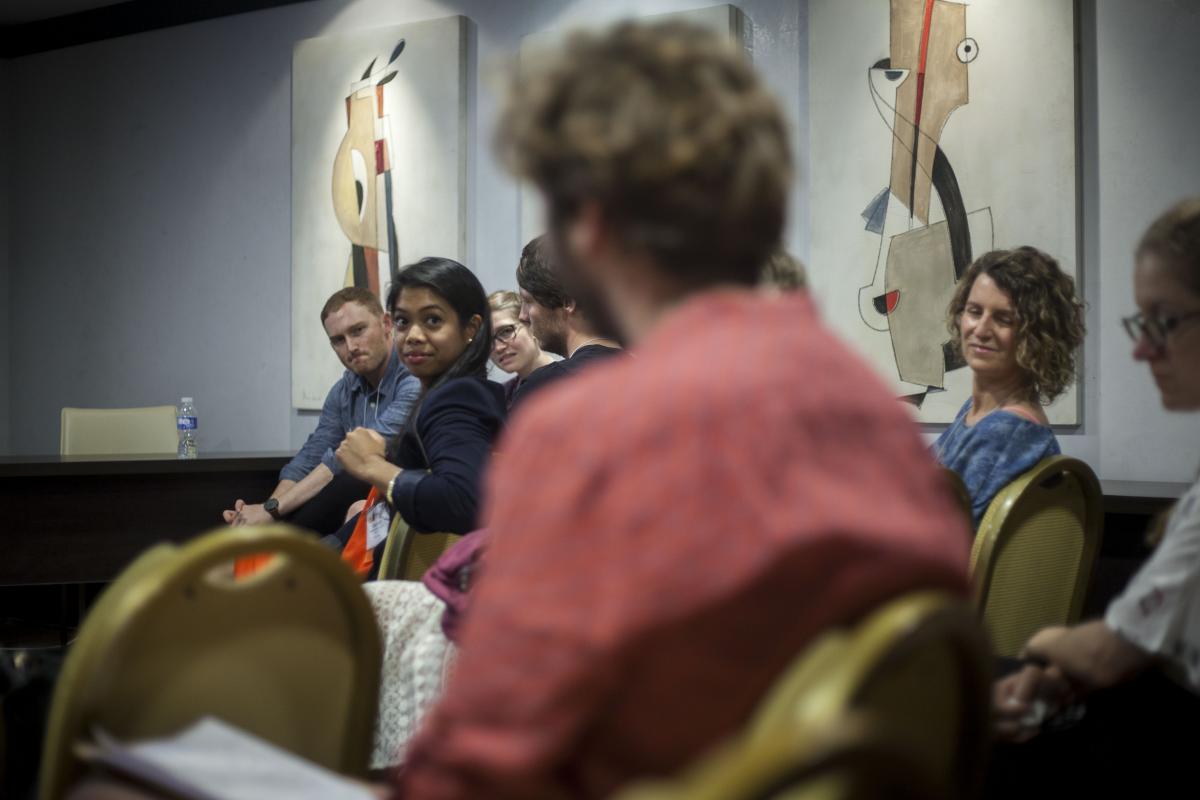
- 1-day conference, in-person registration is available at varying rates per day: DOC or PDF. Ou l'inscription en français: DOC ou PDF.
- NEED HELP? If you're having trouble registering, please email Abbie at [email protected]
Member Rate Qualification
- Registration rates apply as you register. Subsequent memberships do not qualify those already registered for a refund of the difference between the member and non-member rates. The same is true for students, or other similar status and discounts, unless a full cancellation and refund are issued, and prevailing rates apply.
- Affiliate members (or non-members who are not professionals or students) may register at the professional rate. If you are currently receiving mental health care we encourage you to talk to your provider about the utility of this conference for you, prior to registering.
- Student Registration/Membership is available to individuals who are enrolled in a program of study leading to a bachelor’s, master’s, or doctoral degree, are interns, or are postdoctoral candidates. Postdoctoral candidates qualify for Student Registration for up to 2 years, with proof of status from their employer. After this time, they need to register as a Professional. Note: Those registering for the conference as a student are ineligible to earn any kind of CE credits.
Refunds:
Virtual
Cancellation of Pre-conference registration must be submitted in writing via email and must be dated on or before 16:00 Central European Summer Time on 1 June to [email protected] to receive a refund minus a €20 registration cancellation processing fee.
We regret that after 1 June, refunds cannot be made, however we will allow a substitute registrant (they can receive access and a certificate in their name). If you need a refund, please contact us via email. (Note: Shared registrations are not permissible... meaning that you can't attend one day and your colleague the next, etc.)
No refunds will be granted for no-shows. Virtual pre-conference workshops will be recorded and made available through 25 June 2026 to all registrants, following the event.
It is the responsibility of the registrant to make sure that they have received information related to virtual workshop access. If you are registered and do not receive an email granting you pre-conference access (as appropriate) by the morning of 4 June 2026, please contact [email protected].
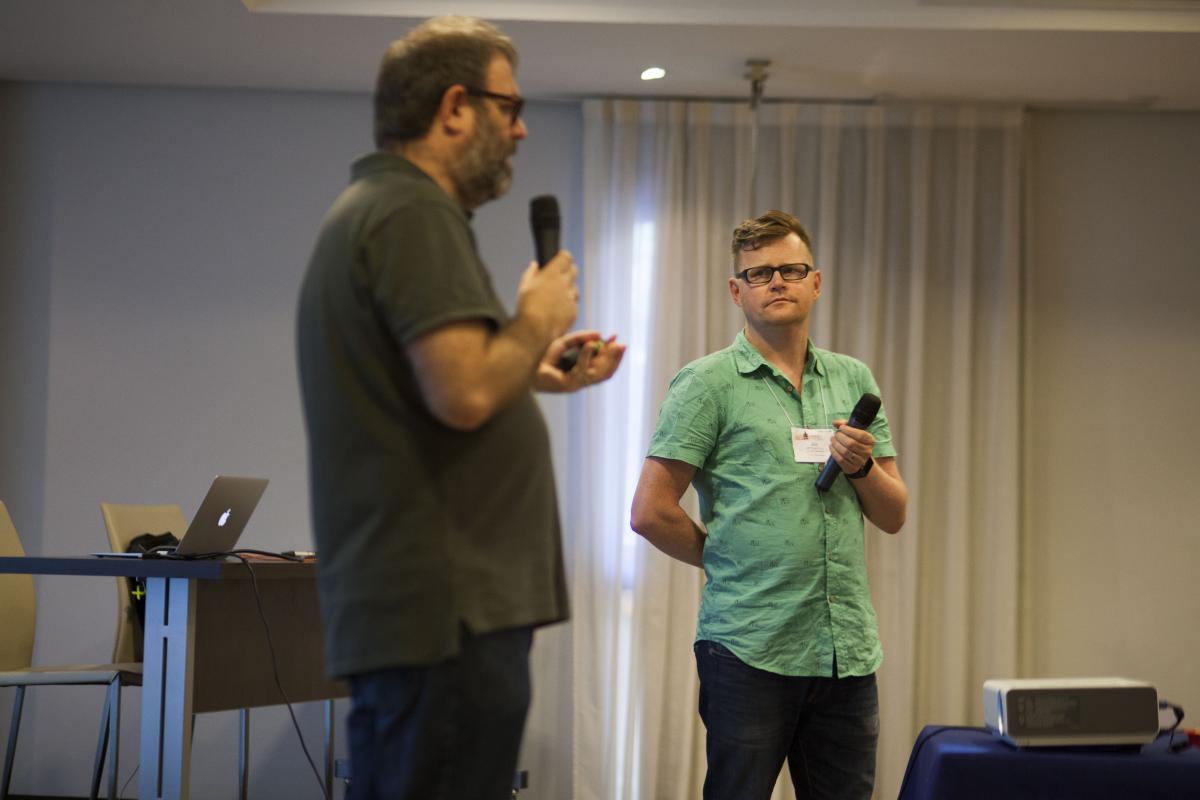 In-Person
In-PersonCancellation of Pre-conference registration must be submitted in writing via email and must be dated on or before 16:00 Central European Summer Time on 15 June to [email protected] to receive a refund minus a €45 registration cancellation processing fee.
We regret that after 15 June, refunds cannot be made, however we will allow a substitute registrant (they can receive access and a certificate in their name). If you need a refund, please contact us via email. (Note: Shared registrations are not permissible... meaning that you can't attend one day and your colleague the next, etc.)
No refunds will be granted for no-shows.
Photographs/Video:
ACBS intends to take photographs and video of this event for use in ACBS newsletters and promotional material, in print, electronic and other media, including the ACBS website and social media accounts. By participating in this event, I grant ACBS the right to use any image, photograph, voice or likeness, without limitation, in its promotional materials and publicity efforts without compensation. All media become the property of ACBS. Media may be displayed, distributed or used by ACBS for any purpose.
Attendees of the World Conference or Pre-Conference Workshops are not permitted to audio or video-record sessions without the express written permission of ACBS.
If you have any concerns regarding the media policy, please feel free to contact us.
Waiver of Liability:
As a condition of my participation in this meeting or event, I hereby waive any claim I may have against the Association for Contextual Behavioral Science (ACBS) and its officers, directors, employees, or agents, or against the presenters or speakers, for reliance on any information presented and release ACBS from and against any and all liability for damage or injury that may arise from my participation or attendance at the program. I further understand and agree that all property rights in the material presented, including common law copyright, are expressly reserved to the presenter or speaker or to ACBS. I acknowledge that participation in ACBS events and activities brings some risk and I do hereby assume responsibility for my own well-being. If another individual participates in my place per ACBS transfer policy, the new registrant agrees to this disclaimer and waiver by default of transfer.
When Hope Feels Lost: Cultivating Presence, Courage, and Connection in the Treatment of Depression with Functional Analytic Psychotherapy (FAP)
When Hope Feels Lost: Cultivating Presence, Courage, and Connection in the Treatment of Depression with Functional Analytic Psychotherapy (FAP)When Hope Feels Lost: Cultivating Presence, Courage, and Connection in the Treatment of Depression with Functional Analytic Psychotherapy (FAP)
 Presented in English, also available for session attendees (in Lyon) via simultaneous AI (artificial intelligence) translation software in 50+ languages. More details available here.
Presented in English, also available for session attendees (in Lyon) via simultaneous AI (artificial intelligence) translation software in 50+ languages. More details available here.
Dates and Location of this IN-PERSON 2-Day Workshop:
IN-PERSON at Catholic University of Lyon (UCLY)
Tuesday, 14 July 2026 from 9:00 - 17:00 Central European Summer Time
Wednesday, 15 July 2026 from 9:00 - 17:00 Central European Summer Time
Contact Hours: 13
Workshop Leaders:
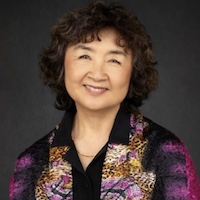 | 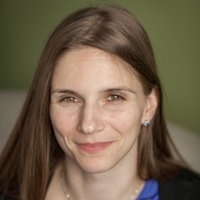 | 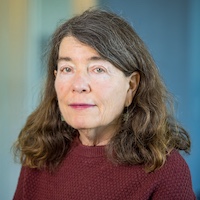 | 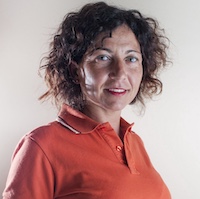 | 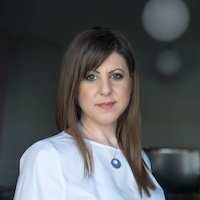 |
| Mavis Tsai, Ph.D. | Sarah Sullivan-Singh, Ph.D. | Barbara Kohlenberg, Ph.D. | Katia Manduchi, Ph.D. | Stavroula Sanida, M.Sc. |
Workshop Description:
Depression often takes root in places where losses were ungrieved, longings remained hidden, truths were unspoken, and relational needs were unmet. In this workshop, we will explore how Functional Analytic Psychotherapy (FAP) offers a pathway of renewed hope by transforming the therapeutic relationship into an experiential, moment-to-moment space for healing and growing. Participants will learn to apply FAP’s five fundamental rules with more precision and heart, using awareness, courage, and love (behaviorally defined) to evoke and reinforce the vital behaviors most needed for clients with depression to feel more vibrantly alive.
We will examine depression as a pattern of behavioral restriction—away from emotional expression, from needs, from vulnerability, and from the fullness of one’s internal world. Through FAP, therapists can compassionately invite clients to contact avoided emotions while helping them recognize the parts of themselves that have been silenced or minimized. Therapists will practice how to evoke in-session behaviors that embody clients’ values and longings, and how to shape relational repertoires that generalize to life beyond the therapy room.
This workshop integrates didactics, demonstrations, clinical videos, real-play practice, and guided experiential exercises that address both clinical and personal development to strengthen your ability to meet clients with presence, attunement, and authenticity. We will encourage you to be vulnerable in revealing yourself to the extent that it supports your learning and development, both personally and professionally.
Our goal is that you will leave the workshop with elevated clinical precision in treating depression from a FAP lens, increased confidence using your own emotional vulnerability judiciously, and renewed inspiration to help clients living with depression rediscover connection—to themselves, to others, and to a life they long to inhabit.
About the Workshop Leaders:
- Mavis Tsai, Ph.D.
Mavis Tsai, PhD, co-originator of FAP with the late Robert Kohlenberg, PhD, ABPP, is a clinical psychologist and senior research scientist at University of Washington. She is the co-author of six books on FAP (some of which have been translated into Portuguese, Spanish, Japanese, Italian, Korean and Persian), and over 85 articles and book chapters. She is an ACBS Fellow, a recipient of Washington State Psychological Association’s Distinguished Psychologist Award, and is proud to be named by New Harbinger Publications as one of “13 Badass Psychologists… Who Happen to be Women." She gave a TEDx talk “Create Extraordinary Interactions”, has led numerous workshops internationally, and has supervised clinicians all over the world in FAP. As Founder of the Nonprofit Organization ‘Awareness, Courage & Love Global Project” which brings FAP to the general public, she trains volunteers to lead chapters in six continents to create a worldwide- network of open-hearted change-seekers who strive to meet life’s challenges through deepening interpersonal connection and rising to live more true to themselves.
- Sarah Sullivan-Singh, Ph.D.
Sarah Sullivan-Singh, PhD, earned her doctoral degree in clinical psychology from UCLA and completed a postdoctoral fellowship at the University of Washington (UW) Rehabilitation Medicine Department before beginning her independent practice. She is a Clinical Instructor within the UW Psychology Department where she supervises graduate students treating clients using ACT and FAP. Dr. Sullivan-Singh also regularly offers guest lectures at the UW Department of Psychiatry and Biobehavioral Sciences. She is a certified FAP trainer and routinely teaches both students and professionals through individual supervision/consultation as well as workshops and online courses. Dr. Sullivan-Singh has also worked on treatment development for and provided clinical supervision within a randomized-controlled trial of FAP at the UW Center for the Science of Social Connection. As partner of The Seattle Clinic, a collective of independent practitioners commi tted to evidence-based care and lifelong learning, Dr. Sullivan-Singh is fortunate to be surrounded by students and colleagues who support her in following the infinite path of encountering and addressing gaps in her awareness and knowledge – and through that process constructing increasingly authentic relationships with greater healing potential.
- Barbara Kohlenberg, Ph.D.
Barbara Kohlenberg, Ph.D. is a Professor in the Department of Psychiatry and Behavioral Science and also in Family and Community Medicine. She also serves as i Dean in the Office for Faculty Affairs. She is a clinical psychologist, who received her Ph.D. at the University of Nevada, Reno. Her NIH funded research has focused on Acceptance and Commitment Therapy (ACT) and Functional Analytic Psychotherapy (FAP) and their integration and application with substance use disorders and stigma. Dr. Kohlenberg is extensively trained in both ACT and FAP, and has contributed to the literature in these areas and has conducted trainings internationally. Dr. Kohlenberg is interested in psychotherapy training in psychiatric residency programs, and in growing bedside manner among family medicine residents. Dr. Kohlenberg has deep interests in the role of compassion, hope, acceptance, and relationship in promoting behavior change. She cherishes direct patient care, as well as training. Helping both patients and practioners learn that one can change one’s relationship with suffering rather than having to “get rid” of suffering is meaningful for her. The relationship between scientific knowledge and wisdom traditions is also very meaningful for her. Out of work Dr. Kohlenberg loves cooking, eating, walking, reading/listening to podcasts, and creating and participating in nurturing communities. She loves the beauty of our desert climate while always also missing the green and grandeur of the Pacific Northwest, where she grew up.
- Katia Manduchi, Ph.D.
Katia Manduchi, PhD, is a licensed psychologist and cognitive-behavioral psychotherapist with over 25 years of clinical experience. She became a certified Functional Analytic Psychotherapy (FAP) trainer in 2012 under the supervision of Robert Kohlenberg, PhD, and Mavis Tsai, PhD, at the University of Washington. She is a founding partner of ACT-ITA and a referent for the ACT and FAP Interest Group (GIS) in Italy. Dr. Manduchi completed advanced clinical training through an internship in Toronto and participated for several years in masterclasses and workshops at the Oxford Cognitive Therapy Centre (UK). In addition to her private clinical practice, she has spent the past 15 years as a trainer and supervisor for psychotherapy training programs throughout Italy. Her professional background includes 10 years of clinical work in an intensive eating disorders unit and 8 years as a supervisor in a community mental health center specializing in psychiatric and addiction disorders. She collaborates nationally and internationally across private, public, and organizational settings, and is the author of numerous publications and national and international presentations. Dr. Manduchi is deeply committed to advancing psychotherapy process, strengthening the therapeutic relationship, and cultivating curiosity, research-mindedness, and creativity in her students, colleagues, and herself.
- Stavroula Sanida, M.Sc.
Stavroula Sanida, M.Sc., is a licensed psychotherapist based in Athens, Greece, with a clinical career spanning over 15 years. She is a certified FAP trainer by the University of Washington and has led workshops and lectures internationally. She uses personalized metaphors and storytelling as evocative, awakening tools in her practice for both therapeutic and educational purposes. As a President of the Greece & Cyprus Chapter of ACBS, she is committed to disseminating third wave CBT approaches in her region. Her dedication also extends to community service. She has provided psychological support through local health initiatives and has participated in projects, such as the European Network of Mentors for Women Entrepreneurs and the Nonprofit Organization “Awareness, Courage & Love Global Project”. Her mission is to help clients and trainees cultivate their creativity and create meaningful, inspiring connections. Writing short stories, playing the cello, and exploring the world through poetry are among the activities that fuel her inspiration.
Following this workshop participants will be able to:
- Explain how FAP’s five rules can address mechanisms underlying depression.
- Identify in-session client behaviors that reflect depressive processes—such as emotional constriction, difficulty expressing needs, disconnection from self, and struggles with authentic relating.
- Describe FAP-consistent mechanisms for how ungrieved losses, unresolved emotional pain, and diminished contact with one’s internal world can contribute to depressive behavioral patterns.
- Practice inviting and reinforcing client behaviors that reconnect them with their longings, values, and authentic emotional experiences, including their disowned or previously silenced parts of self.
- Learn to shape improved interpersonal behaviors in-session, helping clients increase vulnerability, assertiveness, emotional expression, and capacity for mutual connection.
- Construct a FAP case conceptualization specific to depression, including functional analyses of avoidance patterns, relationship repertoires, therapist-client interactional dynamics, and therapist behaviors that may inadvertently maintain or worsen clients’ depressive behaviors.
- Learn to strengthen reinforcement contingencies using therapist emotional presence, self-awareness, and authentic self-expression to support client movement out of depressive patterns.
- Recognize and manage therapist vulnerabilities and associated relationship-interfering behaviors that may be activated when working with depressed clients, including tendencies to over function, offer advice prematurely, or withdraw emotionally in response to client hopelessness.
- Explore, receive, and express the deeper recesses of your true self -- what feels unseen, unmet, and unheld -- so that you can increase intensity, depth, and connection in your therapeutic relationships.
- Learn how to incorporate Awareness, Courage & Love resources and interventions into the treatment of depression as supplemental strategies to enhance clients’ capacity for emotional and interpersonal connection in their daily lives.
Target audience: Intermediate, Advanced, Clinical
Components: Conceptual analysis, Original data, Experiential exercises, Didactic presentation, Case presentation, Role play
Topic Areas: Clinical intervention development or outcomes, Processes of change
Package Includes: A general certificate of attendance
CE Credit Hours Available (13 hours): CEs for psychologists, BCBA
Wonder and Wisdom: Building Flexibility across the Developmental Lifespan
Wonder and Wisdom: Building Flexibility across the Developmental LifespanWonder and Wisdom: Building Flexibility across the Developmental Lifespan
 Presented in English, also available for session attendees (in Lyon) via simultaneous AI (artificial intelligence) translation software in 50+ languages. More details available here.
Presented in English, also available for session attendees (in Lyon) via simultaneous AI (artificial intelligence) translation software in 50+ languages. More details available here.
Dates and Location of this IN-PERSON 2-Day Workshop:
IN-PERSON at Catholic University of Lyon (UCLY)
Tuesday, 14 July 2026 from 9:00 - 17:00 Central European Summer Time
Wednesday, 15 July 2026 from 9:00 - 17:00 Central European Summer Time
Contact Hours: 13
Workshop Leader:
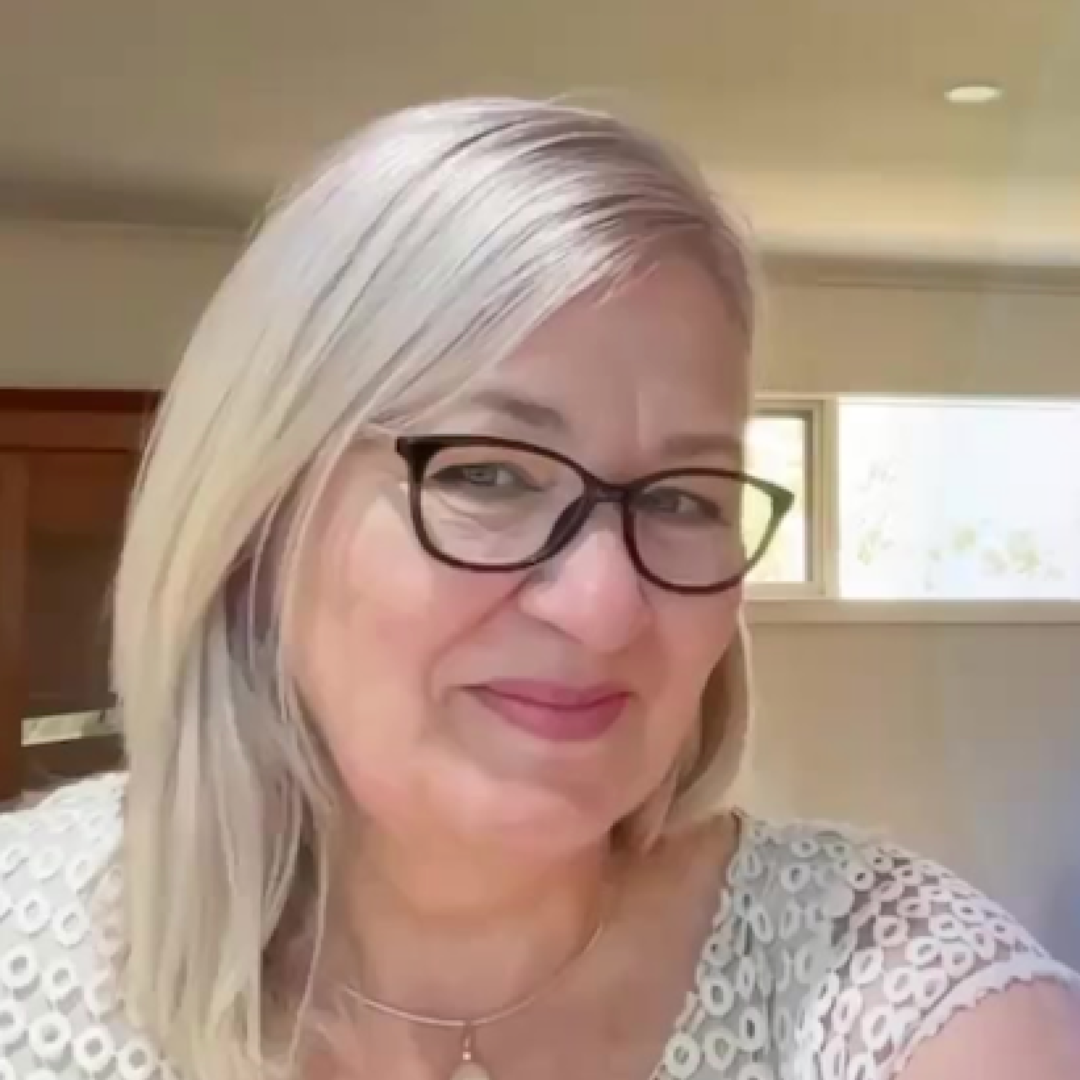 |
| Louise Hayes, Ph.D. |
Workshop Description:
Life brings constant change, making personal growth a process that continues until we take our last breath. Consider just one aspect of our lives, self-concepts: an 8-year-old forms their first self-concepts, a 16-year-old then navigates a new self-identity, a 30-year-old is surprised to have a partner identity, a 45-year-old confronts outdated life narratives, and a 70-year-old attempts to integrate a lifetime of experiences. With DNA-v, you can work easily and engagingly through each phase, building on prior learnings and providing opportunities for wonder and wisdom.
DNA-v is a framework for learning new abilities, initially developed for children and adolescents but now widely used with adults. Thus, it is well placed to help us face current challenges, learn from the past, and focus on growth in the next phase of life.
Importantly, self and social are always in the moment with DNA-V, as we explicitly consider all our actions through the lens of self-as-context and social-as-context. Consider for a moment how often our significant problems are about our relationships with others and ourselves. For example, young people fear an uncertain future amid climate crises, political crises, and the rise of artificial intelligence that will change our social interactions in unknown ways; midlife adults navigate multiple caregiving roles, career uncertainty, and rapid technological change; and older adults confront ageism, loss, and societal marginalisation. We all need tools for flexible adaptation so we can grow through change.
DNA-v provides an ideal framework for growth across the lifespan:
- Social relationships and connections become an essential lens through which to view all our actions. In other words, the 'we' that is in 'me' is always present in our work.
- Self becomes the lens through which every experience is considered, including emotion, language, values, etc.
- The four core processes (Discoverer, Noticer, Advisor, Valuer) allow for developmental calibration and increasing skill.
- Social-as-context allows us to consider our lives in the context of our relationships, attachments, and society.
- DNA-V is inherently growth-oriented, focusing on expanding our abilities into areas such as wonder, awe, curiosity, discovery, connection, compassion, and even effective problem-solving.
- DNA-V emphasises growth, making it applicable to developmental life transitions rather than just clinical presentations.
Join me in this fun and experiential workshop and gain personal growth as well as ideas to support those you serve.
About the Workshop Leaders:
- Louise Hayes, Ph.D.
Dr Louise Hayes is a clinical psychologist, author, international speaker, and educator. She is a Fellow and Past President of the Association for Contextual Behavioural Science. Louise currently holds a position as Adjunct Senior Research Fellow at La Trobe University, where she collaborates on projects using contextual behavioural science. She is a peer-reviewed Acceptance and Commitment Therapy/Training (ACT) trainer engaged in training professionals worldwide. Together with Joseph Ciarrochi, she developed DNA-v, a leading acceptance and commitment therapy model that has sparked international studies. In 2022 she released a new book for helping adults thrive in the face of change – What Makes You Stronger. She is the co-author of two best-selling books for young people – Get Out of Your Mind and Into Your Life for Teenagers; and Your Life Your Way. She is also the co-author of the practitioner book, The Thriving Adolescent. Louise is an active clinician, working with adults and adolescents. Louise’s passion project and the highlight of her work is establishing a not-for-profit endeavour of taking professionals on the journey of their life into the Himalayas to develop their mindful way of being while raising funds to help children in remote Nepal. In her spare time she is a novel writer and certified Buddhist meditation teacher.
Following this workshop participants will be able to:
- Use a range of experiential exercises to promote growth with young people and adults
- Apply DNA-v processes across the lifespan with developmental sensitivity and an understanding of life history and adaptation
- Identify how to use DNA-v differently at each life stage
- Flexibily use the basic processes of discoverer, noticer, advisor, and valuer across the lifespan
- Recognise developmental transitions as opportunities for building psychological flexibility
- Adapt DNA-v interventions to match cognitive, emotional, and social developmental levels
- Conceptualise cases through an integrated DNA-v and developmental lens
- Support flexible social connection skills appropriate to each life stage
- Support flexible self-identity, self-concept, and change
- Adapt psychological flexibility practices into non-clinical (organisations, teams, career) and clinical settings (therapy, counselling)
Target audience: Intermediate, Clinical
Components: Experiential exercises, Didactic presentation, Case presentation, Role play
Topic Areas: Lifespan development
Package Includes: A general certificate of attendance
CE Credit Hours Available (13 hours): CEs for psychologists
Program
ProgramA rough draft of the conference program will be available on this webpage in April.
Please check back for updates!
You can see prior year's programs here: 2025 - 2024 - 2023
Learn more about this year's virtual (5-6 June) and in-person (14-15 July) intensive workshops.
Take a look below at our wonderful Program Committee making it all happen...
Program Committee
Program CommitteeWorld Conference 2026 Program Co-Chairs
Jacqueline A-Tjak, Ph.D. is a registered Clinical Psychologist and Psychotherapist and has worked in inpatient and outpatient facilities in the Netherlands, with patients with different kinds of disorders. She was trained in CBT and is a Supervisor with the VGCt. She started her training in ACT in 2004, is a peer reviewed ACT trainer, and a ACBS Fellow. She attended almost all World conferences since 2006. In her PhD research she compared the efficacy of CBT with ACT for depression.
Dr. Jean-Christophe Seznec is a psychiatrist, former head of clinic, sports medicine physician, lecturer, author of numerous books on ACT, and blogger. He was the president of the French ACT chapter. He teaches meditation and has developed several programs for phone apps, as well as ACT. He teaches at numerous universities. He is a member of the scientific committee of Santé Publique France for the development of soft skills in adolescents, of InspiR, which implements soft skills programs for adolescents, and of La Vie Kintsugi, for the development of health coaching in cancer. He is a specialist in trichotillomania and sports psychologie. He is a member of the medical committee of the French Rugby Federation. He is a trained clown and developed ACT through clowning.
Please submit here if you're a member interested in reviewing submissions for the conference. Oral submission reviewing occurs during the last 2 weeks of February, poster reviewing occurs during the last 2 weeks of March.
Register your interest in the ACBS World Conference 2026!
Register your interest in the ACBS World Conference 2026!Enter your email address below to be sure to get email updates about the 2026 ACBS World Conference. (Submission open/close, speaker information, registration opening & deadlines, program, etc.) (Note, if you are an ACBS member you will receive these updates automatically.)
To be removed from this email list email [email protected] at any time.
Sponsorship Opportunities
Sponsorship Opportunities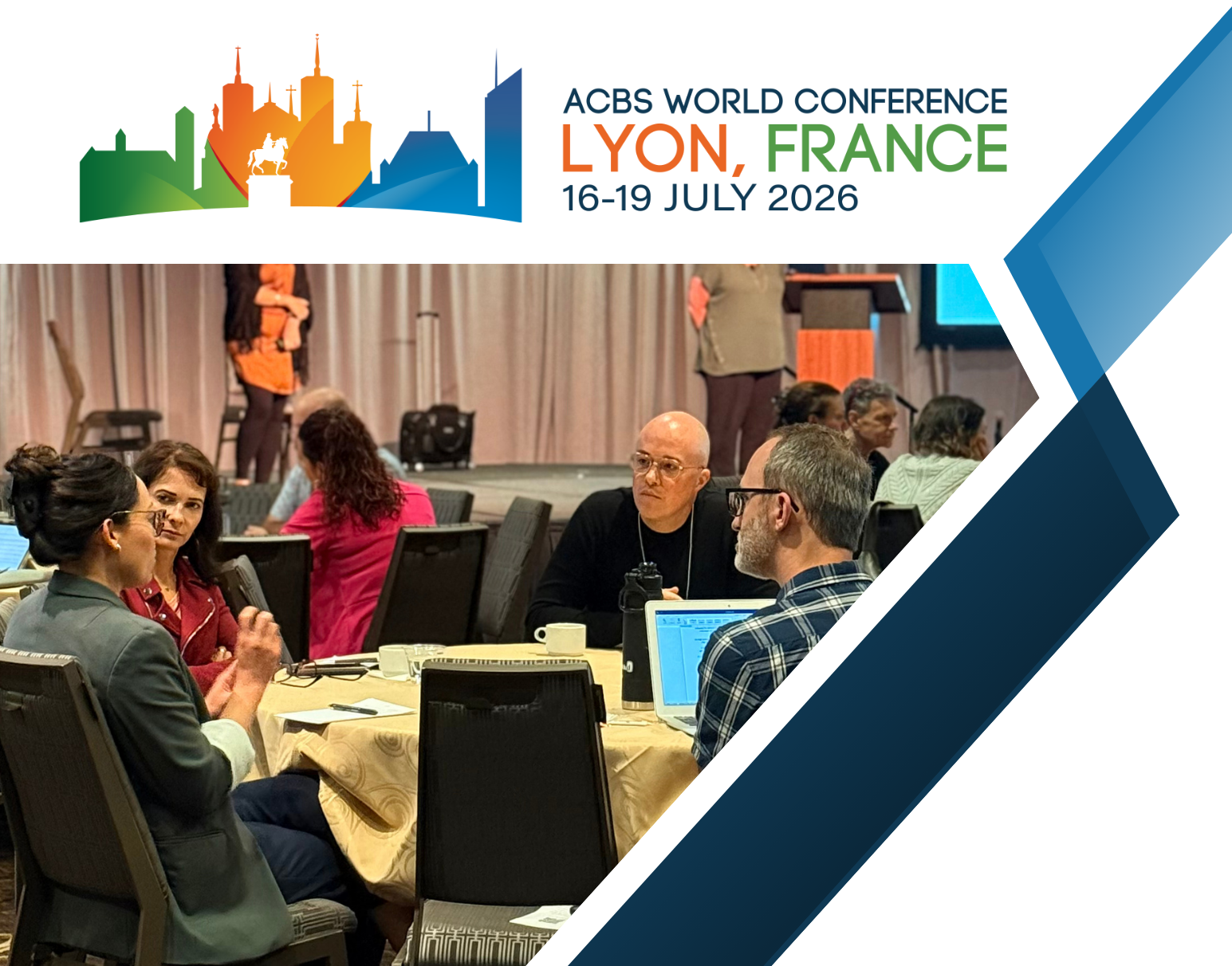 Gain visibility and access to a highly engaged audience of professionals and thought leaders in contextual behavioral science. Your sponsorship helps advance ACBS’s mission while positioning your brand at the forefront of innovation and professional excellence.
Gain visibility and access to a highly engaged audience of professionals and thought leaders in contextual behavioral science. Your sponsorship helps advance ACBS’s mission while positioning your brand at the forefront of innovation and professional excellence.
- Showcase your products and services to an engaged global network of 50,000+ decision-makers and practitioners in the field.
- Build brand recognition through conference materials, signage, and digital platforms.
- Align your organization with ACBS’s commitment to advancing science and practice.
- Position your organization as a leader of innovation and professional excellence.
In addition to on site engagement opportunities, sponsors gain access to our global network of industry influencers and tastemakers.
- Fast growing social media community of 33,000+ active followers and counting!
- 13,000 members in email distribution list
- Your logo shared digitally through email and social media each day of the conference.
- Even more reach! Social media posts during the 2025 World Conference garnered more than 100,000 impressions.
- Conference microsite landing page received more than 40,000 visits in 2025.
WC2026 - Registration
WC2026 - Registration*(consider joining ACBS and register as a member)
Conference Rates (16-19 July 2026)
| 16-19 July | Early (Ends 4 May) | Regular (Ends 15 June) | Onsite |
|---|---|---|---|
| Professional Member | €619* | €659* | €699* |
| Student or Emerging Economy Member | €409* | €449* | €489* |
| Professional Non-Member | €669* | €709* | €749* |
| Student or Emerging Economy Non-Member | €429* | €469* | €509* |
- *The credit card processor is in USD, so the rate listed above is converted to USD in the payment form based on current exchange rates. Euro amount will not change. If your bank account or credit card is not in USD, and your bank charges a currency transaction fee to USD, you may see a slight variation in the amount charged, based on the day's exchange rate.
- Discounted rates are available for professionals in Emerging Economy nations (Tier 2 & Tier 3 countries) and will automatically be applied when you register.
- Prices above include access to all sessions presented 16-19 July, three lunches, twice daily coffee/tea breaks on site, and a general certificate of attendance.
- Conference registration DOES NOT include access to the pre-conference workshops. For registration information for the pre-conference workshops, please go here.
- Ability to earn CEs for different disciplines, as available.
Click here for more information about Pre-Conference Workshops and registration rates.
- Additional fees are required for certificates that track the number of hours you attended (€20) and CE credits (€65). These fees cover all eligible sessions 5-6 June and 14-19 July. You only need to pay the fee once to earn a certificate for all events you attend.
- All rates are in Euros. (*The Euro amount will not change. The credit card processor will be in US Dollars, so you may see the actual amount charged vary slightly based on that day's exchange rate.)
- We apologize that we may not be able to accommodate special meal requests (gluten free, vegan, allergies, etc.) for registrations received after 15 June.
- To register via Mail or Fax, or pay via PayPal, please use the Printable Version: DOC or PDF. Ou l'inscription en français. DOC ou PDF.

- 1-day conference, in-person registration is available at varying rates per day: DOC or PDF. Ou l'inscription en français. DOC ou PDF.
- NEED HELP? If you're having trouble registering, please email [email protected].
Member Rate Qualification
- Registration rates apply as you register. Subsequent memberships do not qualify those already registered for a refund of the difference between the member and non-member rates. The same is true for students, or other similar status and discounts, unless a full cancellation and refund are issued, and prevailing rates apply.
- Affiliate members (or non-members who are not professionals or students) may register at the professional rate. If you are currently receiving mental health care we encourage you to talk to your provider about the utility of this conference for you, prior to registering.
- Student Registration/Membership is available to individuals who are enrolled in a program of study leading to a bachelor’s, master’s, or doctoral degree, are interns, or are postdoctoral candidates. Postdoctoral candidates qualify for Student Registration for up to 2 years, with proof of status from their employer. After this time, they need to register as a Professional. Note: Those registering for the conference as a student are ineligible to earn any kind of CE credits.
Group Registration Discount
There is an available discount of 10% for registrant groups of 5 or more from the same business, who pay in one bank transfer or one credit card payment. This discount is valid only for Professional Member or Professional Non-Member rates for those from Tier 1 countries. (Other categories are not eligible, due to already discounted pricing.) 10% discount is valid for In-Person Conference or In-Person Pre-Conference Workshops only. (Certificates, CEs, 1-day registrations, etc., do not qualify for discounts.) Offer valid on registrations made by 15 June. The discount is not applicable to anyone registering as a student, or Tier 2 or 3 registrations. Group discounts may not be combined with any other discount.
Cancellation of World Conference registration must be submitted in writing via email and must be dated on or before 4:00 p.m. local Lyon time on 15 June to [email protected] to receive a refund minus a €45 registration cancellation processing fee.
We regret that after 15 June, refunds cannot be made, however we will allow a substitute registrant (they can receive access and a certificate in their name). If you need to make a substitution, please contact us via email. (Note: Shared registrations are not permissible... meaning that you can't attend one day and your colleague the next, etc.)
No refunds will be granted for no-shows.
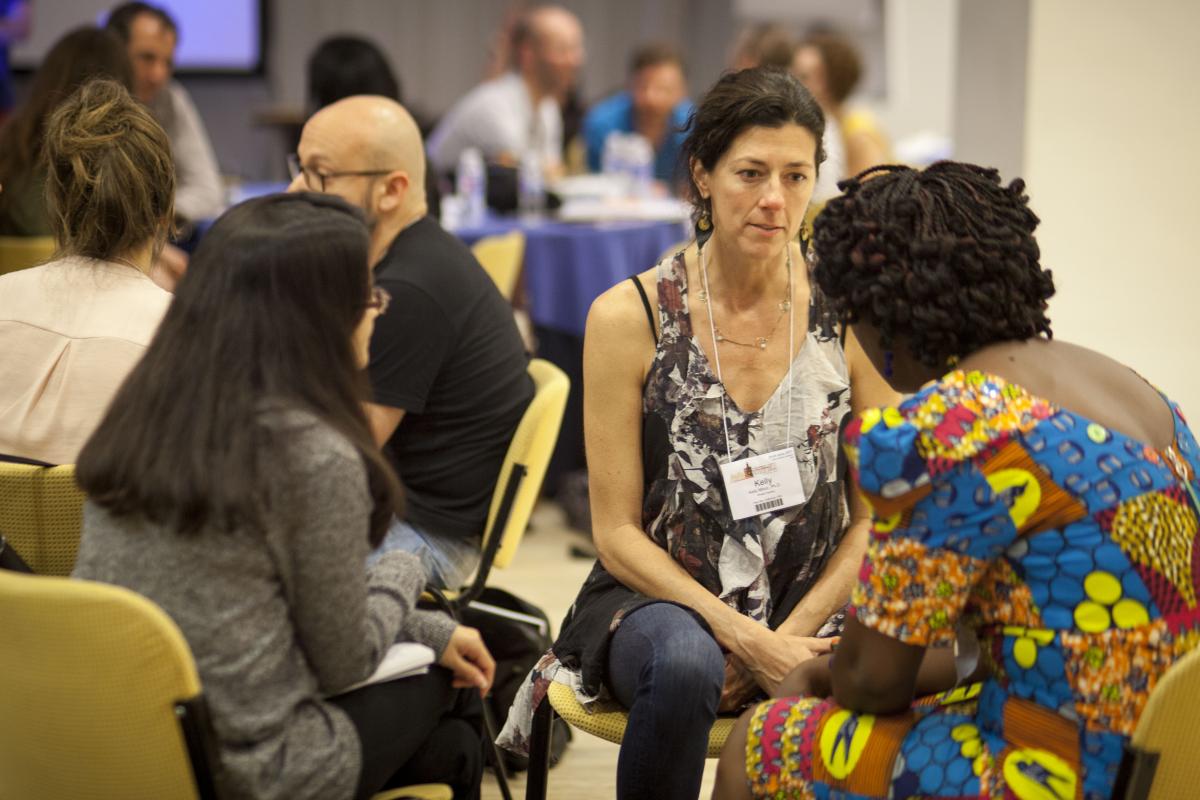 Photographs/Video:
Photographs/Video:
ACBS intends to take photographs and video of this event for use in ACBS newsletters and promotional material, in print, electronic and other media, including the ACBS website and social media accounts. By participating in this event, I grant ACBS the right to use any image, photograph, voice or likeness, without limitation, in its promotional materials and publicity efforts without compensation. All media become the property of ACBS. Media may be displayed, distributed or used by ACBS for any purpose.
Attendees of the World Conference or Pre-Conference Workshops are not permitted to audio or video-record sessions without the express written permission of ACBS.
If you have any concerns regarding the media policy, please feel free to contact us.
Waiver of Liability:
As a condition of my participation in this meeting or event, I hereby waive any claim I may have against the Association for Contextual Behavioral Science (ACBS) and its officers, directors, employees, or agents, or against the presenters or speakers, for reliance on any information presented and release ACBS from and against any and all liability for damage or injury that may arise from my participation or attendance at the program. I further understand and agree that all property rights in the material presented, including common law copyright, are expressly reserved to the presenter or speaker or to ACBS. I acknowledge that participation in ACBS events and activities brings some risk and I do hereby assume responsibility for my own well-being. If another individual participates in my place per ACBS transfer policy, the new registrant agrees to this disclaimer and waiver by default of transfer.
Registration Tiers 2026
Registration Tiers 2026Registration Tiers are based on your country of residence.
Find your tier below (1, 2, 3)
Tier 1:
Andorra
Aruba
Australia
Austria
Belgium
Bermuda
British Virgin Islands
Brunei Darussalam
Canada
Cayman Islands
Channel Islands
Curacao
Cyprus
Czech Republic
Denmark
Estonia
Faroe Islands
Finland
France
French Polynesia
Germany
Gibraltar
Greece
Greenland
Guam
Hong Kong SAR, China
Iceland
Ireland
Isle of Man
Israel
Italy
Japan
Korea, Rep.
Latvia
Liechtenstein
Lithuania
Luxembourg
Macao SAR, China
Malta
Monaco
Netherlands
New Caledonia
New Zealand
Northern Mariana Islands
Norway
Portugal
Puerto Rico
San Marino
Scotland
Singapore
Slovak Republic
Slovenia
Spain
St. Martin
Sweden
Switzerland
Taiwan, China
Turks and Caicos Islands
United Kingdom
United States
Virgin Islands (U.S.)
Tier 2:
Albania
American Samoa
Antigua and Barbuda
Argentina
Armenia
Azerbaijan
Bahamas
Bahrain
Barbados
Belarus
Belize
Bosnia and Herzegovina
Botswana
Brazil
Bulgaria
Chile
China
Colombia
Costa Rica
Croatia
Cuba
Dominica
Dominican Republic
Ecuador
Equatorial Guinea
Fiji
Gabon
Georgia
Grenada
Guatemala
Guyana
Hungary
Indonesia
Iran, Islamic Rep.
Iraq
Jamaica
Jordan
Kazakhstan
Kosovo
Kuwait
Libya
Malaysia
Maldives
Marshall Islands
Mauritius
Mexico
Montenegro
Namibia
Nauru
North Macedonia
Oman
Palau
Panama
Paraguay
Peru
Poland
Qatar
Romania
Russian Federation
Saudi Arabia
Serbia
Seychelles
South Africa
St. Kitts and Nevis
St. Lucia
St. Vincent and the Grenadines
Suriname
Thailand
Tonga
Trinidad and Tobago
Türkiye
Turkmenistan
Tuvalu
United Arab Emirates
Uruguay
Venezuela, RB
Tier 3:
Afghanistan
Algeria
Angola
Bangladesh
Benin
Bhutan
Bolivia
Burkina Faso
Burundi
Cabo Verde
Cambodia
Cameroon
Central African Republic
Chad
Comoros
Congo, Dem. Rep.
Congo, Rep.
Cote d'Ivoire
Djibouti
Egypt, Arab Rep.
El Salvador
Eritrea
Eswatini
Ethiopia
Gambia
Ghana
Guinea
Guinea-Bissau
Haiti
Honduras
India
Kenya
Kiribati
Korea, Dem. People's Rep.
Kyrgyz Republic
Lao PDR
Lebanon
Lesotho
Liberia
Madagascar
Malawi
Mali
Mauritania
Micronesia, Fed. Sts.
Moldova
Mongolia
Morocco
Mozambique
Myanmar
Nepal
Nicaragua
Niger
Nigeria
Pakistan
Papua New Guinea
Philippines
Rwanda
Samoa
Sao Tome and Principe
Senegal
Sierra Leone
Solomon Islands
Somalia
South Sudan
Sri Lanka
Sudan
Syrian Arab Republic
Tajikistan
Tanzania
Timor-Leste
Togo
Tunisia
Uganda
Ukraine
Uzbekistan
Vanuatu
Vietnam
West Bank and Gaza
Yemen, Rep.
Zambia
Zimbabwe
Tier 1 determined using IMF classifications, Tiers 2 & 3 delineated using World Bank Country and Lending Groups data.
WC2026 Languages/ Interpretation
WC2026 Languages/ Interpretation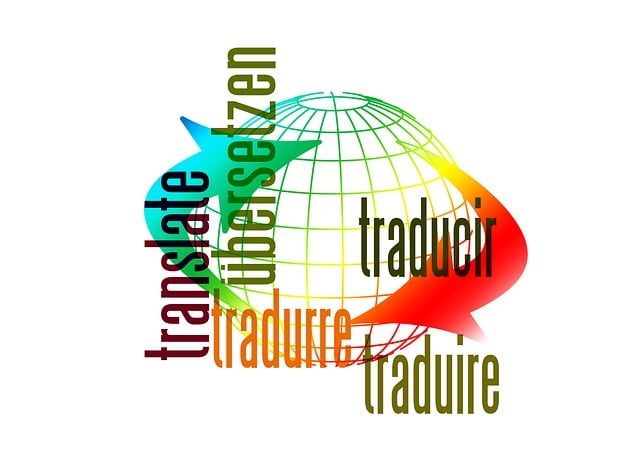
More than half of the World Conference sessions and all in-person Pre-Conference workshops accessible in 50+ languages.
The 2026 ACBS World Conference is accepting submissions in English or French.
Call for Submissions
The ACBS Program Committee encourages and will accept submissions (all submission types) for presentation in English or French. (Please note that each session must consistently present in one language for interpretation to function.) Submit here!
Presentations/Workshops
More than half of the World Conference sessions and all in-person Pre-Conference workshops accessible in 50+ languages.
14-15 July 2026, all Pre-Conference, Intensive workshops will be presented in English and available in 50+ languages via simultaneous AI (artificial intelligence) translation software. (Use of this browser-based translation system requires attendees to have a smart phone, and wired or wireless headphones, that can connect to Wi-Fi.)
16-19 July 2026, the ACBS World Conference will have 6 presentation rooms (including the large plenary session room) available in 50+ languages via simultaneous AI (artificial intelligence) translation software. (Use of this browser-based translation system requires attendees to have a smart phone, and wired or wireless headphones, that can connect to Wi-Fi.)
Conference FAQ
Conference FAQ
General Questions about the ACBS World Conference
- I registered for conference, now what?
Share the Excitement!
Let your network know you’re attending #ACBSWC26! Share the news on social media using our handy toolkit to help spread the word about ACBS and grow our community: https://contextualscience.org/social_media_toolkit
- How much do workshops cost during the World Conference?
Workshops given during the World Conference are free of charge.
(Note: Pre-Conference Intensive workshops have a separate fee and registration.)
- What are The Follies?
The Follies is a unique feature of ACBS conferences. Basically, it’s a cabaret show, filled with funny songs, sketches, stand-up comedy routines, humorous PowerPoint presentations, pre-made videos, etc. And of all of this funny and talented content is created by the conference delegates! Get your creative powers focused, anything you have seen in the ACT world that deserves to be made fun of is fair game!
All registered conference attendees are welcome, don't forget to bring your name badge!
Immediately following the Follies we invite you to join us for a dance party in the same location! See you on the dance floor!
- What are educational objectives?
Educational Objectives are required for sessions to be eligible for Continuing Education (CE) credit.
Writing Educational Objectives (according to the APA):
- Educational objectives, or learning outcomes, are statements that clearly describe what the learner will know or be able to do as a result of having attended an educational program or activity.
- Educational objectives must be observable and measurable.
- Educational objectives should (1) focus on the learner, and (2) contain action verbs that describe measurable behaviors
- Verbs to consider when writing Educational objectives:
- list, describe, recite, write
- compute, discuss, explain, predict
- apply, demonstrate, prepare, use
- analyze, design, select, utilize
- compile, create, plan, revise, summarize
- assess, compare, contrast, rate, critique
- Verbs to avoid when writing Educational objectives
- know, understand, learn, become aware of, become familiar with, have a working knowledge of
- be able to use, help clients respond to, approach, tweak
- expand, grow, increase, improve
- explore, express, appreciate, think critically
Examples of well-written Educational objectives:
- Implement traditional exposure-based interventions as adapted for an acceptance-based model.
- Describe the role and significance of avoidance in the development and maintenance of psychopathology.
- Conduct a full-scale values assessment with clients.
Examples of poor Educational Objectives:
- Hear the latest research about ACT. (not learner-focused; not about measurable behaviors)
- See a role-play. (not learner-focused; not about measurable behaviors)
- What does a chairperson do?
The Chairperson for a PANEL should prepare to briefly introduce each Panelist. Keep it brief and relevant, so as not to take up lots of precious session time. Introduce all Panelists at the beginning of the session. Panels vary in their format, some have each panelist give 10 minute presentations followed by a discussion/debate by the panelists, some require the Chair to pose pre-arranged questions, some feed solely off of audience questions. The Chair is responsible for knowing or establishing the format and facilitating it (perhaps by asking the questions or calling on the audience members). If the panel gets off track (or off topic) it's the Chair's responsibility to bring them back to the topic, and make sure that the Educational Objectives listed in the Program are met/covered. Please keep in mind though that the Chair is not a Panelist (unless they are scheduled in both roles) and should make sure not to speak at length. If the Q&A is still going strong at the end of the scheduled time period, please thank the presenters, and announce that if the audience has any more questions, the presenters may be able to give them a few minutes in the hallway for remaining questions. This is necessary if another session is starting in 15 minutes (so that the next presenters can begin to prepare in the room) and so that those audience members that need to leave can do so (without disrupting the session) at the conclusion of the time period. It is the responsibility of the Chairperson to make sure that the session begins on time. Please make sure you have a watch.
Here's another cool article about Panel chairing for some other tips.
The Chairperson for a SYMPOSIUM should prepare to briefly introduce each speaker, immediately prior to his/her presentation (this can be as minimal as Name, Affiliation, Paper title; or a little more substantive if desired, but still brief.) It is also your responsibility to monitor the timing of each speaker. (Each session may have slightly different timing... if the session is 60 minutes, with 3 papers, each paper would be 10 minutes, then 15 minutes of time for the Discussant, followed by Q&A. If the session is 60 minutes with 4 papers, each paper would get 10 minutes, 10 minutes for the Discussant, and the remainder for questions.) If there is no Discussant, each presenter may have more time, or you can opt for a longer Q&A period.
Briefly tell each speaker, prior to the session something like "I'll keep the time on my watch. Each speaker has 10 minutes. I'll raise my hand in the back of the room when you have 5 minutes, and I'll raise my hand and hold up 1 finger when you have 1 minute left." You may put notecards on the lectern with the amount of time left, if you prefer. (The set up of the room may or may not permit this.) If the presenter does not stop at the end of their time, please kindly interrupt them (verbally), and ask them to wrap up so that the next presenter may begin. (The audience will thank you!) The Question & Answer period for all papers should occur at the end of the session (not after each presentation). Please just make sure that everyone gets a fair and equal amount of time. (If the first person has a short talk, the extra time may be divided among the remaining speakers.) It is the responsibility of the Chairperson to make sure that the session begins on time. Please make sure you have a watch.
- What does a discussant do?
A discussant is the final speaker in a SYMPOSIUM who highlights and integrates the contributions of various speakers in that symposium. That is, they use their expertise to provide a general commentary on individual papers within the session and explore how the papers (in relation to each other) help advance the topic. Discussants should plan to discuss the session for approximately 10 minutes, depending upon the time available, and then moderate questions from the audience. Discussants should directly request the papers (or at least the outlines) from the presenters before the conference, and prepare by reading related work prior to the conference.
- How can my company become a sponsor?
Organizations have the unique opportunity to gain visibility and access to our highly engaged audience of professionals and thought leaders in contextual behavioral science. Your sponsorship helps advance ACBS’s mission while positioning your brand at the forefront of innovation and professional excellence.
To learn more about sponsorship opportunities click here.
Submission Information
- What are some tips for submissions?
General:
Citing research and presenting data (original or a review of data) is highly encouraged for all submission types.
Make sure that your submission for a workshop/panel/etc. is appropriate for that format. Panel submissions that sound more like workshops are unlikely to be accepted and vice versa.
Submissions should weigh the value of diverse voices against too many presenters to make it coherent. ACBS encourages (and depending on topic may require) panels/workshops to include a diverse complement of presenters (demographic diversity as well as diversity in areas of expertise), but not to the detriment of a coherent, well crafted session. Please consider the practicality of coordinating a quality session among too many presenters.
Please accurately indicate if your submission is beginner, intermediate, or advanced. Please craft your submission to fit the audience you indicate. You do not have a better chance of being accepted if you choose all 3.
If your expertise is in a very narrow area (ex. 55-57 year olds with trauma history), we encourage you to craft your workshop/panel submission to meet the needs of a wider audience. Your examples/demonstrations should of course be from your area of expertise, but we encourage that your abstract and title be accessible to more potential attendees.
Make sure your abstract is clear and well written (have multiple people proofread it before submitting). Unclear or poorly written abstracts have a lower chance of being accepted.
Make sure your abstract explains skills or information an attendee will walk away with at the conclusion.
Background like “Acceptance and Commitment Therapy is a behavioral-based…..” isn’t necessary in your abstract. If you feel you need to persuade reviewers that your topic is important (but that background information isn’t relevant for an abstract to entice attendance) please add that to the “additional information” field at the end of the submission form.
Create actual educational objectives - what the attendees should be able to do as a result of attending your session. (Read the examples/descriptions of what an objective is in the submission form before writing yours.)
Post-test questions (required so that Continuing Education credit may be earned by those watching recordings of the live sessions), can often be developed (at least in part) from your education objectives. You can do up to 2 true/false questions and the remainder need to be multiple choice. These questions don't have to be "extra tricky", they're just intended to gauge comprehension of information presented.
Specific to Workshops:
Be realistic about what you are going to be able to do in the time available and about the time you need (don’t try to squeeze a 2 hour workshop into a 1 hour slot; adjust for the time).
Workshops should not be didactic with a single exercise included at the end. This is a common mistake. Please consider multiple components (experiential exercises, role-plays, case conceptualizations, etc.) to make your workshop more appealing and useful. These should be woven thoughtfully throughout your workshop.
Consider the unique opportunities available in the online format (if applying to present online). Not only can you plan for break out rooms, you can create polls, and ask people to indicate understanding/interest through the use of emoticons (thumbs up, etc.).
- What are the guidelines for poster submissions?
Please consider using this innovative poster format, as we believe it will increase both efficiency and effectiveness in poster preparation and communication of data. (This format is not required, but strongly suggested.)
Find more information about this poster format here and download the template below.
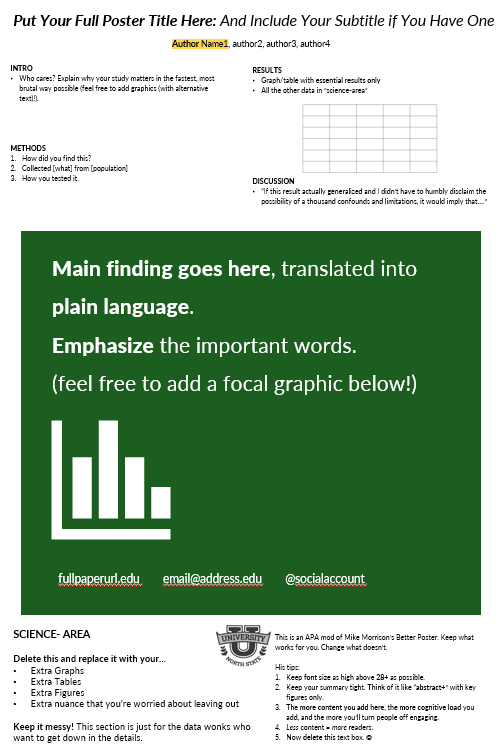
Poster sessions facilitate a researcher to discuss their research for an extended period and allow attendees to select the presentations in which they are most interested.
Poster size: A0 size or no larger than 36 inches by 48 inches. A smaller size is also permitted. VERTICAL/PORTRAIT orientation required for 2026.
Please consider using an engaging poster format such as the one described here. This should aid you in reaching your audience and getting the conversation started about your work.
***Please note, we are unable to print posters for presenters (or pay for poster printing), so please come to the conference prepared with your printed poster.
Want to save money on poster printing?
There are a few free options that you can find online to print a large image across multiple "regular" pages. It will require a little bit of trimming/scissor work, but these pages and some tape can save you some money if this is a barrier for you. Examples:
https://suncatcherstudio.com/block-poster/
Poster Session Information
Each poster area will include a number in the upper corner corresponding to the poster’s listed number found in the program. Poster presenters should arrive at the poster display area 15 minutes before the scheduled beginning of their poster session to set up their display materials. No electrical outlets or audio-visual equipment will be provided in the poster area. At the end of the session, your poster must be taken down and removed from the areas.
Magnets, tacks, or sticky putty will be provided for hanging your poster materials; if your poster requires any special materials that cannot be mounted via magnets or blue a painter's tape, it can not be displayed (per venue rules).
During the session, your materials should be on display and you and your co-authors should be available to discuss the materials and answer questions. At least one author must be present at the poster during the presentation period.
- What is Chapter/SIG World Conference submission sponsorship?
The "sponsorship" means that the Chapter/SIG members or leadership have put their support behind a presentation, as a quality representation of work in their field of study (SIG) or geographic area (Chapter). It means that the Chapter/SIG has reviewed and approved (and in some cases "spurred" the creation of) the submission. These can be any type of oral submission (paper, panel, etc.) or poster.
The Program review committee takes this information and gives those submissions extra consideration, because a group (Chapter or SIG) has already reviewed/approved the submission. Sponsorship does not guarantee acceptance of any particular submission.
Sponsorship also allows the particular SIG or Chapter to direct its members to items of interest while at the World Conference, which is a service given the complexity of our programs.
Sponsored submissions accepted for presentation will include "Sponsored by xxx SIG/Chapter" in the conference program, app, and online.
What do I need to know if I am submitting a session that has been sponsored?
If you would like to reach out to a Chapter and/or SIG for sponsorship, you will find contact information for each Chapter here and each SIG here.
The person who submits that particular session to the conference would indicate the sponsorship at the time of submission.
SIG and Chapter sponsored submissions receive more consideration than other submissions to the conference (as they have had a review and approval), but they are not guaranteed acceptance.
Presentations may be "co-sponsored" by more than one SIG/Chapter (usually for a "cross-over" topic).
What do Chapters and SIGs need to know?
SIGs and Chapters can each sponsor up to 3 oral presentation submissions (submitters indicate sponsorship while submitting). The method of review of your sponsored submissions is up to the individual SIG or Chapter, but we encourage you to involve your community, have a review process, and select submissions that you would like to support due to their quality and relevance to the Chapter or SIG’s mission.
If ACBS receives more than 3 submissions indicating sponsorship from one SIG/Chapter, the SIG/Chapter will be informed of the titles so that they can confirm which were sponsored.
Please use your sponsorship wisely to help the Program Committee and draw their attention to quality submissions in your area/topic. Again, this does not guarantee acceptance, but does lend the submission to extra consideration.
There is no further commitment by the Chapter or SIG beyond their initial review and agreement to "sponsor".
Need ideas for how to review sessions?
Use your SIG/Chapter listserv to recruit reviewers. Create a google form (or other submission method) to collect titles, author names, and draft abstracts, by 20 January (or 1 Feb., whatever timeline you can support), then review and notify submitters by 7 Feb. so that they have plenty of time to submit their session, with sponsorship, on the ACBS website.
Another idea is to craft a panel using your listserv. Email the listserv asking for cutting-edge ideas (relevant to your SIG) that would make for a good panel discussion at the conference and assign someone to chair it and recruit appropriate panelists.
First Timer’s Guide to the ACBS World Conference in Lyon
First Timer’s Guide to the ACBS World Conference in Lyon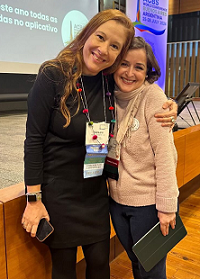
Welcome!
We have compiled this guide to assist first-time conference attendee’s in making their time at the ACBS World Conference as productive and stress-free as possible. There’s no “right” way to attend the conference nor is there a set number of sessions or events to attend. You should attend the conference with the plan to make connections, learn, and have fun.
Planning for the Conference
Getting there: Check here for airport and train station transfer information to get you to the venue.
General Conference Schedule: Please find the schedule of events which will help you plan your days here - General schedule
What Should I Bring?
Snacks and a water bottle: ACBS provides lunch each day along with coffee/tea breaks in the morning and afternoon. If you’d like to supplement that, shop at the grocery store and stock up on fruit, granola bars, or energy bars – items that are portable and filling enough to sustain you throughout the day. Your brain will thank you!
Comfortable Shoes & Clothes: Bring your favorite comfortable shoes! ACBS conferences are a bit more informal than other similar conferences when it comes to dress. Most people wear slacks/shorts/jeans and a button-down shirt, blouse, or something similar. Be comfortable. (Oh, and a sweater is a good idea in case a room is chilly with air-conditioning!)
Writing Implements: Whether it's your phone, tablet, or paper/pen, please be sure to bring note-taking materials with you. To save on costs and the environmental impact of wasted paper, ACBS does not provide writing materials or printed versions of the program. The Program will be available as a PDF online and in the Conference App. Please note: During meetings, the use of any AI notetaking tools is prohibited. Participants are expected to rely on traditional methods of notetaking to ensure the confidentiality and security of the discussion. Read the full policy here.
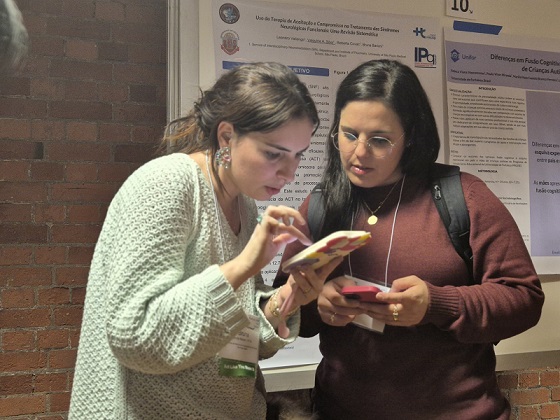
Choosing Conference Sessions (2026 Preliminary Program)
Sometimes selecting which of the approx. 120+ education sessions to attend requires some time. There is a lot of cool research, some really useful practical training, thought provoking invited speakers, and a wide variety of topics. Expand your horizons and have fun. Read through the sessions available. Keep a list of these available sessions, but don’t stress about definitively picking one over another. Feel free to add them to your agenda in the Conference App. You will end up chatting with other attendees about upcoming sessions and they may lean toward one or the other or even suggest one you had not considered. Another strategy is to find (or recruit) a buddy to attend a different session in the same time slot and then meet up afterward to share information.
You will notice there are several different types of sessions available throughout the conference. We’ve included a brief explanation of each type to assist with choosing your sessions:
• Workshops are training sessions of 1.5 or 3 hours and usually focus on a combination of experiential exercises, case conceptualization, role plays, and/or didactic teaching. The workshops July 16-19 are open to all conference registrants, no advanced registration is required for individual sessions.
• The Ignite presentation is a short, structured talk in which presenters present on ideas and issues they are most passionate about, using a “deck” of 20 slides that auto-advance every 15 seconds for a total of 5 minutes each.
• Symposia are a series of three to five 15-20 minute presentations focused on either empirical research or conceptual, philosophical, historical, or methodological issues. A discussant highlights and integrates the contributions of various speakers in the symposium and moderates questions from the audience.
• Invited Lectures are in depth, invited talks by researchers/trainers doing something especially awesome. These presenters have been specifically invited to provide new insights or depth to the conference. We encourage you to attend!
• Panel discussions consist of 3 to 6 speakers selected for some shared interest or expertise in an area. Panelists respond to one or more questions or issues, with time allotted for interaction among the speakers and with the audience.
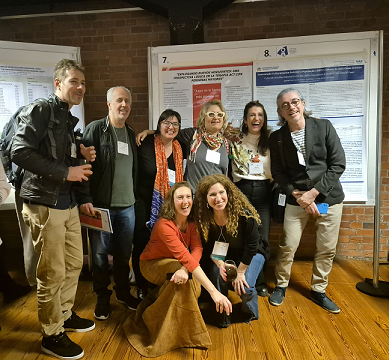
Networking at the Conference
The First Timer’s Event/Rookie’s Retreat: Attending this event can help you get oriented to the conference, get your questions answered, meet some attendees, and start your networking! ACBS Membership Committee volunteers will facilitate The First Timer’s Event/Rookie’s Retreat again this year. The event will be held on Wednesday, 15 July from 17:15-18:00 local time (location to be determined.)
Chapter/SIG (Special Interest Group) Meetings: You are welcome and encouraged to attend any Chapter and SIG meetings that are occurring during the conference which interest you. You do not need to be a member of these groups to attend and this is a great way to meet people who live locally to you or who have similar interests.
Evening and Social Events: ACBS conference social events (networking receptions, mixers, Follies, etc.) generally have high attendance. These events are a good opportunity to chat with others in a relaxed environment and have fun. You will find the schedule for evening and social events in the general schedule. More details will be provided as we get closer to the event.
Quick Tips
• Clothing: Lyon area temperatures in July are warm and sunny. Daily highs are predicted to be between 79-82 degrees Fahrenheit (26-28 degrees Celsius), and nighttime lows typically range from 59 to 62 degrees Fahrenheit (15 to 17 degrees Celsius.) Dress comfortably for hot days but pack a light jacket or sweater for evenings. Chance of precipitation is relatively low compared to other months, but sporadic summer thunderstorms can occur, so be prepared!
• All sessions from Thursday morning through Sunday afternoon are included with your conference registration. Workshops given during these times are complimentary.
• You will be meeting other therapists/researchers so be prepared to help them remember you by sharing your business card. If you don't have a business card, don't worry! ACBS is an informal conference and you can always ask to snap a picture of someone's name tag and message them later through our membership directory.
How do I sign up for individual sessions/workshops during the conference?
How do I sign up for individual sessions/workshops during the conference?All sessions during the ACBS World Conference are open to all paid conference attendees.
You don't have to sign up for individual sessions. You just go to the session/workshop you are interested in.
ACBS attempts to put the most popular sessions into the largest rooms, but sometimes the room assignment is too small for the interest. We apologize if a room is full before you arrive. Please consider arriving a few minutes early to your "must have" sessions.
(Note: Pre-Conference Workshops do require pre-registration and a separate fee to attend.)
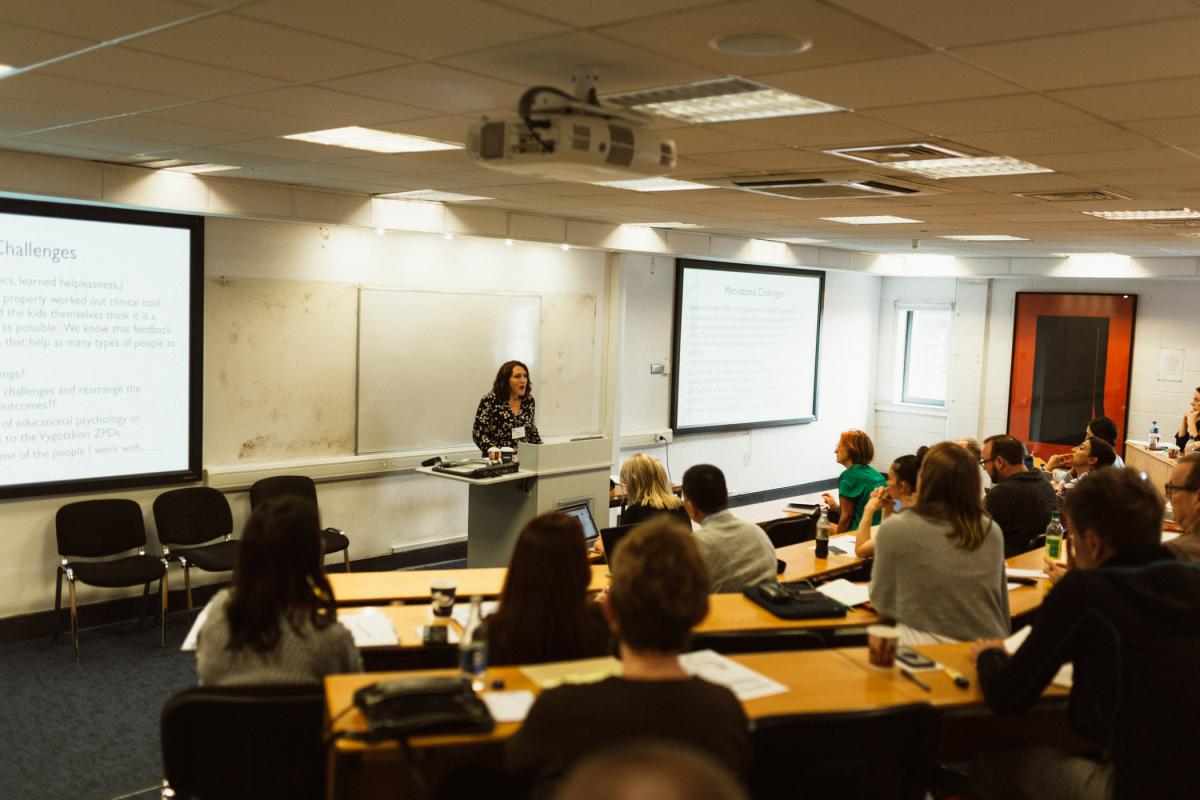
How much do workshops cost during the World Conference?
How much do workshops cost during the World Conference?Workshops given during the World Conference are free of charge.
(Note: Pre-Conference Intensive workshops have a separate fee and registration.)
.jpg)
Poster Guidelines
Poster GuidelinesPlease consider using this innovative poster format, as we believe it will increase both efficiency and effectiveness in poster preparation and communication of data. (This format is not required, but strongly suggested.)
Find more information about this poster format here and download the template below.

Poster sessions facilitate a researcher to discuss their research for an extended period and allow attendees to select the presentations in which they are most interested.
Poster size: A0 size or no larger than 36 inches by 48 inches. A smaller size is also permitted. VERTICAL/PORTRAIT orientation required for 2026.
Please consider using an engaging poster format such as the one described here. This should aid you in reaching your audience and getting the conversation started about your work.
***Please note, we are unable to print posters for presenters (or pay for poster printing), so please come to the conference prepared with your printed poster.
Want to save money on poster printing?
There are a few free options that you can find online to print a large image across multiple "regular" pages. It will require a little bit of trimming/scissor work, but these pages and some tape can save you some money if this is a barrier for you. Examples:
https://suncatcherstudio.com/block-poster/
Poster Session Information
Each poster area will include a number in the upper corner corresponding to the poster’s listed number found in the program. Poster presenters should arrive at the poster display area 15 minutes before the scheduled beginning of their poster session to set up their display materials. No electrical outlets or audio-visual equipment will be provided in the poster area. At the end of the session, your poster must be taken down and removed from the areas.
Magnets, tacks, or sticky putty will be provided for hanging your poster materials; if your poster requires any special materials that cannot be mounted via magnets or blue a painter's tape, it can not be displayed (per venue rules).
During the session, your materials should be on display and you and your co-authors should be available to discuss the materials and answer questions. At least one author must be present at the poster during the presentation period.
Social Media Toolkit
Social Media ToolkitThank you for registering for the 2026 ACBS World Conference!
Now it’s time to share the excitement—let your network know you’re heading to #ACBSWC26!
You’re officially on the list for an unforgettable experience from 16–19 July 2026 in Lyon. One of the things we’re most proud of is our global community—and now it’s your turn to shine. Invite your colleagues, collaborators, and friends to join you for cutting-edge research, inspiring sessions, and connections that span the globe.
This toolkit gives you everything you need—ready-to-use graphics, sample posts, and more—to make sharing simple, fun, and impactful. Let’s make some noise together and get your network excited for #ACBSWC26!
Social Media Graphics
Below are branded graphics for you to choose from. (Right click to save) 
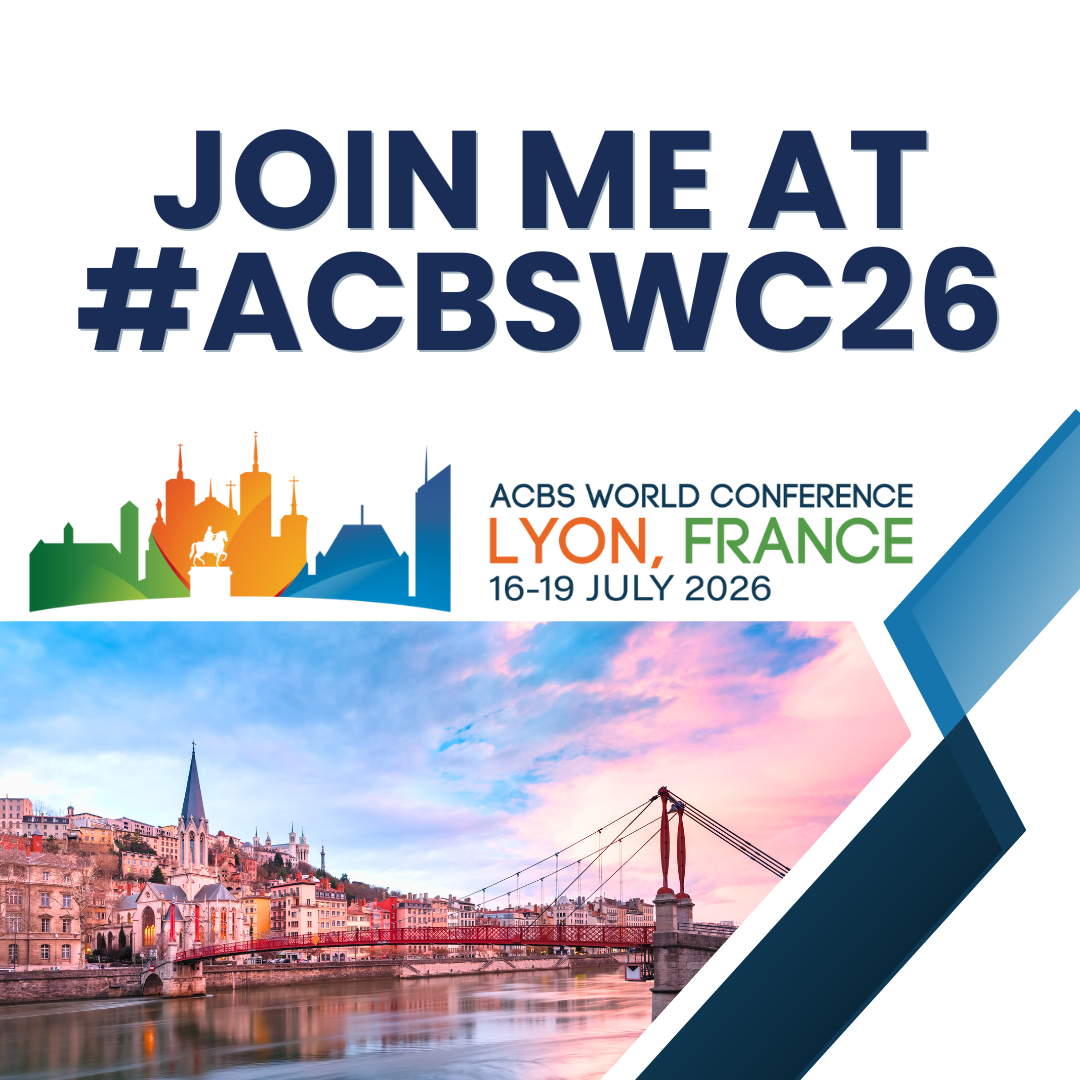


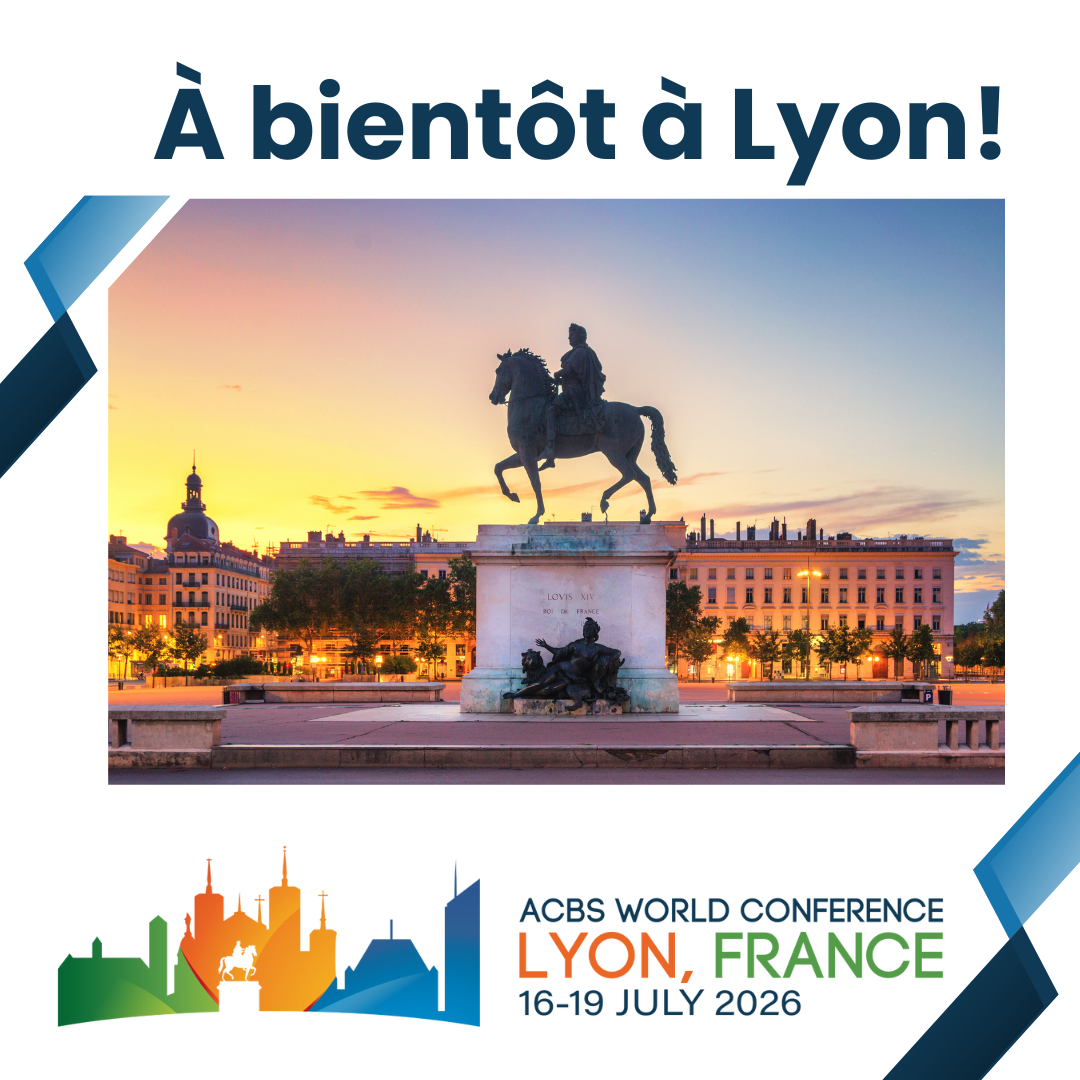

Social Media Copy
Below are examples of social media posts for you to use or customize as you see fit. Please remember to tag ACBS and use #ACBSWC26 #ACBS to assure that your posts are promoted among the global ACBS community. Feel free to edit and spice up as you see fit!
- Excited to be heading to Lyon this July at the 2026 ACBS World Conference! Join me and colleagues from around the world for cutting-edge research, meaningful conversations, and new connections that move our field forward. https://bit.ly/48REAPU
#ACBS #ACBSWC26 - Heading to Lyon this July for #ACBSWC26! Can’t wait to connect, share ideas, and explore the latest advances in contextual behavioral science with colleagues from around the globe. Hope to see you there! https://bit.ly/48REAPU #ACBS
- Join me this July in Lyon for the 2026 ACBS World Conference where science, practice, and community come together. Experience the latest in contextual behavioral science and connect with leaders shaping the future of our field. https://bit.ly/48REAPU
#ACBS #ACBSWC26
Email Signature
A one-liner in your email signature can be a quick and easy way to bring attention to your speaking role at #ACBSWC2026. Here are a couple of options—customizable, of course—to help you spread the word!
- Excited to be attending the 2026 ACBS World Conference in Lyon, 16–19 July! Connect with me there or learn more.
- Heading to the 2026 ACBS World Conference this July! Join me in Lyon for cutting-edge research and global connections.
Option to add the conference logo to your signature as well using this link: https://bit.ly/4oHLRq6

Tips for Submissions
Tips for SubmissionsGeneral:
-
Citing research and presenting data (original or a review of data) is highly encouraged for all submission types.
-
Make sure that your submission for a workshop/panel/etc. is appropriate for that format. Panel submissions that sound more like workshops are unlikely to be accepted and vice versa.
-
Submissions should weigh the value of diverse voices against too many presenters to make it coherent. ACBS encourages (and depending on topic may require) panels/workshops to include a diverse complement of presenters (demographic diversity as well as diversity in areas of expertise), but not to the detriment of a coherent, we'll crafted session. Please consider the practicality of coordinating a quality session among too many presenters.
-
Please accurately indicate if your submission is beginner, intermediate, or advanced. Please craft your submission to fit the audience you indicate. You do not have a better chance of being accepted if you choose all 3.
-
If your expertise is in a very narrow area (ex. 55-57 year olds with trauma history), we encourage you to craft your workshop/panel submission to meet the needs of a wider audience. Your examples/demonstrations should of course be from your area of expertise, but we encourage that your abstract and title be accessible to more potential attendees.
-
Make sure your abstract is clear and well written (have multiple people proofread it before submitting). Unclear or poorly written abstracts have a lower chance of being accepted.
-
Make sure your abstract explains skills or information an attendee will walk away with at the conclusion.
-
Background like “Acceptance and Commitment Therapy is a behavioral-based…..” isn’t necessary in your abstract. If you feel you need to persuade reviewers that your topic is important (but that background information isn’t relevant for an abstract to entice attendance) please add that to the “additional information” field at the end of the submission form.
-
Create actual educational objectives - what the attendees should be able to do as a result of attending your session. (Read the examples/descriptions of what an objective is in the submission form before writing yours.)
-
Post-test questions (required so that Continuing Education credit may be earned by those watching recordings of the live sessions), can often be developed (at least in part) from your education objectives. You can do up to 2 true/false questions and the remainder need to be multiple choice. These questions don't have to be "extra tricky", they're just intended to gauge comprehension of information presented.
Specific to Workshops:
-
Be realistic about what you are going to be able to do in the time available and about the time you need (don’t try to squeeze a 2 hour workshop into a 1 hour slot; adjust for the time).
-
Workshops should not be didactic with a single exercise included at the end. This is a common mistake. Please consider multiple components (experiential exercises, role-plays, case conceptualizations, etc.) to make your workshop more appealing and useful. These should be woven thoughtfully throughout your workshop.
-
Consider the unique opportunities available in the online format (if applying to present online). Not only can you plan for break out rooms, you can create polls, and ask people to indicate understanding/interest through the use of emoticons (thumbs up, etc.).
Volunteer Opportunities during the World Conference
Volunteer Opportunities during the World ConferenceACBS is a small staff association. We NEED volunteers to help us pull off the amazing event that is the ACBS World Conference.
If you have skills that could help us in Lyon, France - please let us know!
Important information:
- We will accept volunteers based on their skill set match with conference needs and their intended time commitment/general flexibility.
- Contacted volunteers will need to register for the ACBS World Conference before your spot will be confirmed (by 1 June).
- Any financial discount for volunteering is done as a refund, and is paid upon the completion of volunteer activities.
If you have any questions please email Renae Visscher, [email protected]
What are Educational Objectives?
What are Educational Objectives?Educational Objectives are required for sessions to be eligible for Continuing Education (CE) credit.
Writing Educational Objectives (according to the APA):
- Educational objectives, or learning outcomes, are statements that clearly describe what the learner will know or be able to do as a result of having attended an educational program or activity.
- Educational objectives must be observable and measurable.
- Educational objectives should (1) focus on the learner, and (2) contain action verbs that describe measurable behaviors
- Verbs to consider when writing Educational objectives:
- list, describe, recite, write
- compute, discuss, explain, predict
- apply, demonstrate, prepare, use
- analyze, design, select, utilize
- compile, create, plan, revise, summarize
- assess, compare, contrast, rate, critique
- Verbs to avoid when writing Educational objectives
- know, understand, learn, become aware of, become familiar with, have a working knowledge of
- be able to use, help clients respond to, approach, tweak
- expand, grow, increase, improve
- explore, express, appreciate, think critically
Examples of well-written Educational objectives:
- Implement traditional exposure-based interventions as adapted for an acceptance-based model.
- Describe the role and significance of avoidance in the development and maintenance of psychopathology.
- Conduct a full-scale values assessment with clients.
Examples of poor Educational Objectives:
- Hear the latest research about ACT. (not learner-focused; not about measurable behaviors)
- See a role-play. (not learner-focused; not about measurable behaviors)
What does a Chairperson do?
What does a Chairperson do?The Chairperson for a PANEL should prepare to briefly introduce each Panelist. Keep it brief and relevant, so as not to take up lots of precious session time. Introduce all Panelists at the beginning of the session. Panels vary in their format, some have each panelist give 10 minute presentations followed by a discussion/debate by the panelists, some require the Chair to pose pre-arranged questions, some feed solely off of audience questions. The Chair is responsible for knowing or establishing the format and facilitating it (perhaps by asking the questions or calling on the audience members). If the panel gets off track (or off topic) it's the Chair's responsibility to bring them back to the topic, and make sure that the Educational Objectives listed in the Program are met/covered. Please keep in mind though that the Chair is not a Panelist (unless they are scheduled in both roles) and should make sure not to speak at length. If the Q&A is still going strong at the end of the scheduled time period, please thank the presenters, and announce that if the audience has any more questions, the presenters may be able to give them a few minutes in the hallway for remaining questions. This is necessary if another session is starting in 15 minutes (so that the next presenters can begin to prepare in the room) and so that those audience members that need to leave can do so (without disrupting the session) at the conclusion of the time period. It is the responsibility of the Chairperson to make sure that the session begins on time. Please make sure you have a watch.
Here's another cool article about Panel chairing for some other tips.
The Chairperson for a SYMPOSIUM should prepare to briefly introduce each speaker, immediately prior to his/her presentation (this can be as minimal as Name, Affiliation, Paper title; or a little more substantive if desired, but still brief.) It is also your responsibility to monitor the timing of each speaker. (Each session may have slightly different timing... if the session is 60 minutes, with 3 papers, each paper would be 10 minutes, then 15 minutes of time for the Discussant, followed by Q&A. If the session is 60 minutes with 4 papers, each paper would get 10 minutes, 10 minutes for the Discussant, and the remainder for questions.) If there is no Discussant, each presenter may have more time, or you can opt for a longer Q&A period.
Briefly tell each speaker, prior to the session something like "I'll keep the time on my watch. Each speaker has 10 minutes. I'll raise my hand in the back of the room when you have 5 minutes, and I'll raise my hand and hold up 1 finger when you have 1 minute left." You may put notecards on the lectern with the amount of time left, if you prefer. (The set up of the room may or may not permit this.) If the presenter does not stop at the end of their time, please kindly interrupt them (verbally), and ask them to wrap up so that the next presenter may begin. (The audience will thank you!) The Question & Answer period for all papers should occur at the end of the session (not after each presentation). Please just make sure that everyone gets a fair and equal amount of time. (If the first person has a short talk, the extra time may be divided among the remaining speakers.) It is the responsibility of the Chairperson to make sure that the session begins on time. Please make sure you have a watch.
.jpg)
What does a Discussant do?
What does a Discussant do?A discussant is the final speaker in a SYMPOSIUM who highlights and integrates the contributions of various speakers in that symposium. That is, they use their expertise to provide a general commentary on individual papers within the session and explore how the papers (in relation to each other) help advance the topic. Discussants should plan to discuss the session for approximately 10 minutes, depending upon the time available, and then moderate questions from the audience. Discussants should directly request the papers (or at least the outlines) from the presenters before the conference, and prepare by reading related work prior to the conference.
.jpg)
What is Chapter/SIG World Conference Submission Sponsorship?
What is Chapter/SIG World Conference Submission Sponsorship?You can find the important details regarding Chapter/SIG Submission Sponsorship here.
